TASTE OF TORAH
By Rabbi Yonatan Hambourger
April 24, 2025

When Words Fail: A Lesson in Living Faith
In Leviticus 10, we encounter one of the most profound moments of acceptance in biblical history. The scene unfolds on what should have been a day of pure celebration. The Tabernacle stood complete, and Aaron and his sons were being installed as priests. Yet in a single moment, his two eldest sons, Nadab and Abihu, offered "strange fire" before G-d and were struck down.
Aaron's response was extraordinary in that shattering moment when any parent might have cried out in anguish or demanded answers. The Torah tells us simply, "Vayidom Aaron" – "Aaron was silent" (Leviticus 10:3). This silence wasn't a passive response or a stunned speechlessness, but rather an active expression of profound faith.
At the heart of Aaron's response lies the concept of emunah. While often translated simply as "faith," emunah represents something far more profound – a deep-seated faithfulness that manifests in action. The Hebrew word shares its root with "imun," meaning training or practice, suggesting that true emunah becomes woven into the fabric of one's being through consistent cultivation.
Emunah is both innate and cultivated. Like a seed planted in soil, it exists within us naturally, but requires nurturing to truly flourish. Without proper cultivation through study, contemplation, and lived experience, it may remain superficial – present in thought but absent in action. The Talmud illustrates this through a striking example: a thief who, before breaking into a home, sincerely prays to G-d for success. He believes in G-d enough to pray, yet fails to recognize that the same G-d who hears his prayers could provide for him through honest means.
True emunah grows through exercise, like a muscle strengthened through use. Each time we choose to see G-d's hand in our daily lives – in both our successes and challenges – we strengthen this spiritual muscle. When we make difficult choices to uphold our values, when we sacrifice immediate comfort for deeper meaning, our emunah deepens. Most profoundly, it grows when tested, much like Aaron's did in his moment of incomprehensible loss.
In our modern world, we often feel compelled to explain everything, to find reasons or assign blame. Aaron's example reminds us that some things transcend explanation. His silence teaches us that acceptance doesn't diminish our pain – it gives us the strength to carry it with dignity and continue forward, guided by an unwavering trust in G-d's greater purpose.
Perhaps the most powerful lesson from Aaron's silence is that emunah isn't just about what we believe – it's about how we live those beliefs. In our moments of greatest challenge, when no words can possibly suffice, it's this lived faith that carries us forward, transforming even our deepest trials into sources of spiritual strength.
Shabbat Shalom,
Rabbi Yonatan Hambourger
April 17, 2025

The Butcher and the Rabbi: A Tale of Deeper Meaning
We discover fascinating guidelines regarding permissible and impermissible animals that can be consumed in Leviticus 11:1-32—commonly referred to in Jewish tradition as "kosher" laws. These dietary rules extend beyond simple do's and don'ts; they impart profound lessons about mindful living and our connection with creation.
The concept of kosher (meaning "fit" or "proper") isn't just about following rules. It suggests that everything in creation has a purpose, a sacred potential waiting to be unlocked. When we eat with awareness and gratitude, we're doing more than just satisfying hunger - we're participating in something deeply spiritual.
This reminds me of a touching story:
A successful butcher once sought the counsel of a renowned rabbi (the Alter Rebbe) with a dilemma. He'd slaughtered a cow but wasn't sure if it met the proper standards because of an infection in the animal’s lung. The rabbi began carefully studying various religious texts to make a decision. The butcher, feeling guilty about taking up the rabbi's valuable time, offered to simply discard the meat.
The rabbi's response was surprising: "I'm not doing this for your sake - I'm doing this for the sake of the cow."
This simple statement carries a powerful message for all of us, regardless of our faith tradition. Every creature, every object, and every moment has inherent worth and purpose. When we treat the world around us with reverence and consideration, we elevate the ordinary to the extraordinary.
Think about it: What separates us from animals isn't just our ability to think - it's our capacity to infuse meaning into our actions. Before we eat, speak, or act, we can pause and ask ourselves: "Am I just going through the motions? Or am I bringing something higher to this moment?"
This ancient wisdom speaks to modern life. In a world of fast food and instant gratification, it reminds us to slow down and consider the deeper purpose of our choices. Whether we're eating a meal, having a conversation, or making a decision, we can choose to act with intention and awareness, transforming everyday moments into opportunities for spiritual growth.
Shabbat Shalom,
Rabbi Yonatan Hambourger
April 10, 2025

Sacred Sparks: How Small Deeds Fan Great Flames
Ever wonder how to keep your spiritual spark alive when life feels like it's stuck on repeat? There's actually a fascinating insight about this in Leviticus 6:5, where G-d gives a seemingly simple instruction to the Jewish people: "A continuous fire shall burn upon the altar; it shall not go out."
Today, if you walk into any synagogue, you'll spot something called the "Ner Tamid" - an eternal flame that hangs above the holy ark. It's a beautiful reminder of that ancient altar fire. But there's more to this story than meets the eye.
The Chassidic masters saw something deeper here. They taught that this eternal flame isn't just about keeping a physical fire burning - it's about maintaining our inner spiritual fire. Think of it as your personal pilot light, always there, waiting to burst into full flame when you need it most.
You see, each of us has our own inner sanctuary, a special place within our hearts where that divine spark lives. Sure, we might not think about it during our daily rush of errands and responsibilities, but it's always there, quietly flickering. The trick is learning how to fan that flicker into a brilliant fire.
Our inner flame is like a faithful pilot light - steady, reliable, ever-present. But give it a bit of spiritual fuel - even something as simple as a kind word or thoughtful deed - and watch what happens. That modest flame can surge into something powerful, transforming from a quiet flicker into a torch that illuminates every corner of our lives.
Maybe it's taking five minutes to read something inspiring from Scripture or going a little out of your way to help someone who's struggling. These might seem like small things, but they're actually profound when it comes to nurturing our inner fire. In fact, Jewish wisdom teaches that even one positive action can tip the scales for the entire world, bringing us all a step closer to that dream of universal peace and prosperity we're all hoping for.
So next time you're feeling spiritually drained, remember your eternal pilot light. It doesn't take much to fan the flame - just one small act of kindness, one moment of connection, one step in the right direction. Who knows? Your simple good deed today might just be the spark that ignites a greater light for all.
Shabbat Shalom,
Rabbi Yonatan Hambourger
@tasteoftorah.org
April 3, 2025

When Less Is More: A Biblical Insight into True Greatness
Have you ever noticed how the smallest details can carry the deepest meanings? In the Hebrew Bible, even the size of a single letter can tell a fascinating story. Let me share with you an intriguing detail from the book of Leviticus that speaks volumes about human nature and our relationship with G-d.
The very first word of Leviticus, "Vayikra" (meaning "And He called"), contains a curious feature: its final letter, Aleph, is written smaller than all the others. This wasn't a scribal error – it was intentionally written this way, and the reason behind it offers us a beautiful lesson about humility.
This verse tells us that G-d called to Moses, singling him out for divine communication. Now, imagine being in Moses' sandals for a moment. The Creator of the universe wants to speak with you personally! Yet, tradition tells us that this diminutive Aleph represents Moses' humility in the face of such extraordinary divine attention.
Contrast this with another interesting detail from the Bible: in the book of Chronicles, when writing about Adam (the first human), his name is spelled with an oversized Aleph. This larger-than-life letter symbolizes Adam's awareness of his own greatness – after all, he was created directly by G-d's hand and breath and given dominion over all creation. But as we know from the Garden of Eden story, this awareness of his special status eventually led to his downfall.
Moses, on the other hand, showed us a better way. Despite being the greatest prophet who ever lived, despite performing miraculous signs and leading an entire nation to freedom, he remained remarkably humble. This wasn't false modesty – Moses knew his capabilities well. The difference was that he never saw these gifts as his own accomplishments.
Here's where it gets practical for us today: true humility isn't about denying our talents or abilities. It's about maintaining a healthy perspective about our gifts while remembering their source. Whether you're leading a company, raising a family, creating art, or serving your community, remember that you're both Adam and Moses. You have that "big Aleph" within you – the divine spark that makes you capable of amazing things. But cultivating that "small Aleph" of Moses – that humble recognition of where our gifts come from – that's what helps us use those capabilities wisely and well.
Shabbat Shalom,
Rabbi Yonatan Hambourger
March 27, 2025

Sacred Pauses, Sacred Motion
This week’s Taste of Torah focuses on the final three verses of Exodus, which tell us something fascinating about how the ancient Israelites traveled through the desert. They didn't just wander aimlessly - they followed a divine cloud. When the cloud lifted from the Tabernacle, they'd pack up and move. When it settled, they'd make camp.
What's particularly interesting is that they had no control over this schedule. They couldn't say, "Hey, this is a nice spot; let's stay here longer," or "Come on, let's get moving already!" They had to synchronize their lives with a rhythm that wasn't theirs.
This divine choreography holds a profound lesson for our own lives. Sometimes, we're full of energy and momentum, ready to tackle new challenges and move forward. Other times, we need to stay put, reflect, and gather our strength. Both movement and stillness serve their purpose in our personal growth, even when we can't see the bigger picture.
We face similar challenges in finding our own rhythm today. Life has a way of testing our natural inclinations. Sometimes, we hesitate when we should leap into action, making excuses to stay in our comfort zone when the opportunity beckons. Other times, we resist necessary pauses, filling our days with constant motion when wisdom calls for stillness.
In these moments, we can learn from the ancient Israelites' trust in divine timing. Perhaps that long-delayed decision needs our immediate attention, or that relationship needs our active engagement rather than passive presence. Conversely, what feels like life slowing down might actually be an invitation to notice the depth and richness we missed while rushing. The children of Israel learned this lesson well - their journey was being guided with purpose, even when the timing didn't make sense to them.
When we feel pressured to move while our inner wisdom says "stay," or when we're hesitating while something inside urges action, we can remember this ancient wisdom: both our periods of movement and our periods of rest are equally sacred, each serving its unique purpose in our journey.
I wish you a good week and Shabbat Shalom,
Rabbi Yonatan Hambourger
March 20, 2025

Create Vessels for Blessing
Picture the entrepreneur who lands the deal after a year of pitching, or the artist who finally sells a painting after countless rejections. In that moment of triumph, we face an ancient paradox: does our success spring from relentless effort, or flow from a higher source? This question challenges everything we believe about work, faith, and human potential.
The Torah provides an intriguing perspective on this tension. In Exodus 35:2, instead of commanding, "You shall work for six days," it states, "Work may be done for six days." This passive phrasing suggests something profound: perhaps we aren't entirely in control of our success.
Consider a farmer's relationship with their land. They can pray for rain endlessly, but without planting seeds, nothing will grow. Conversely, they might plant perfect rows, use premium fertilizer, and follow every agricultural best practice, but without rain and sunshine – elements entirely beyond their control – the field remains barren.
This pattern repeats throughout our lives. Think of our work as creating a vessel to receive blessing – much like choosing the right container to collect rainwater. A vessel too small limits what we can receive, while one too large might lead to unnecessary strain and worry. A merchant once asked his rabbi why, despite working longer hours than his competitor, his business struggled while his rival thrived. The rabbi observed that his competitor closed his shop for the Sabbath without worry, trusting that six days sufficed to create his vessel for blessing. The struggling merchant, however, kept his shop open seven days a week, constantly anxious about making ends meet. The more he worried, the more elusive success became. The lesson? Create an appropriate vessel through honest work, maintain it through ethical practices, and trust that G-d will fill it with exactly what we need.
The next time success or failure hangs in the balance, remember: our effort matters, but it's not the complete story. We're all creating channels for blessings to flow through. And often, the real blessing lies hidden within the work itself.
I wish you a good week and a Shabbat Shalom,
Rabbi Yonatan Hambourger
March 13, 2025
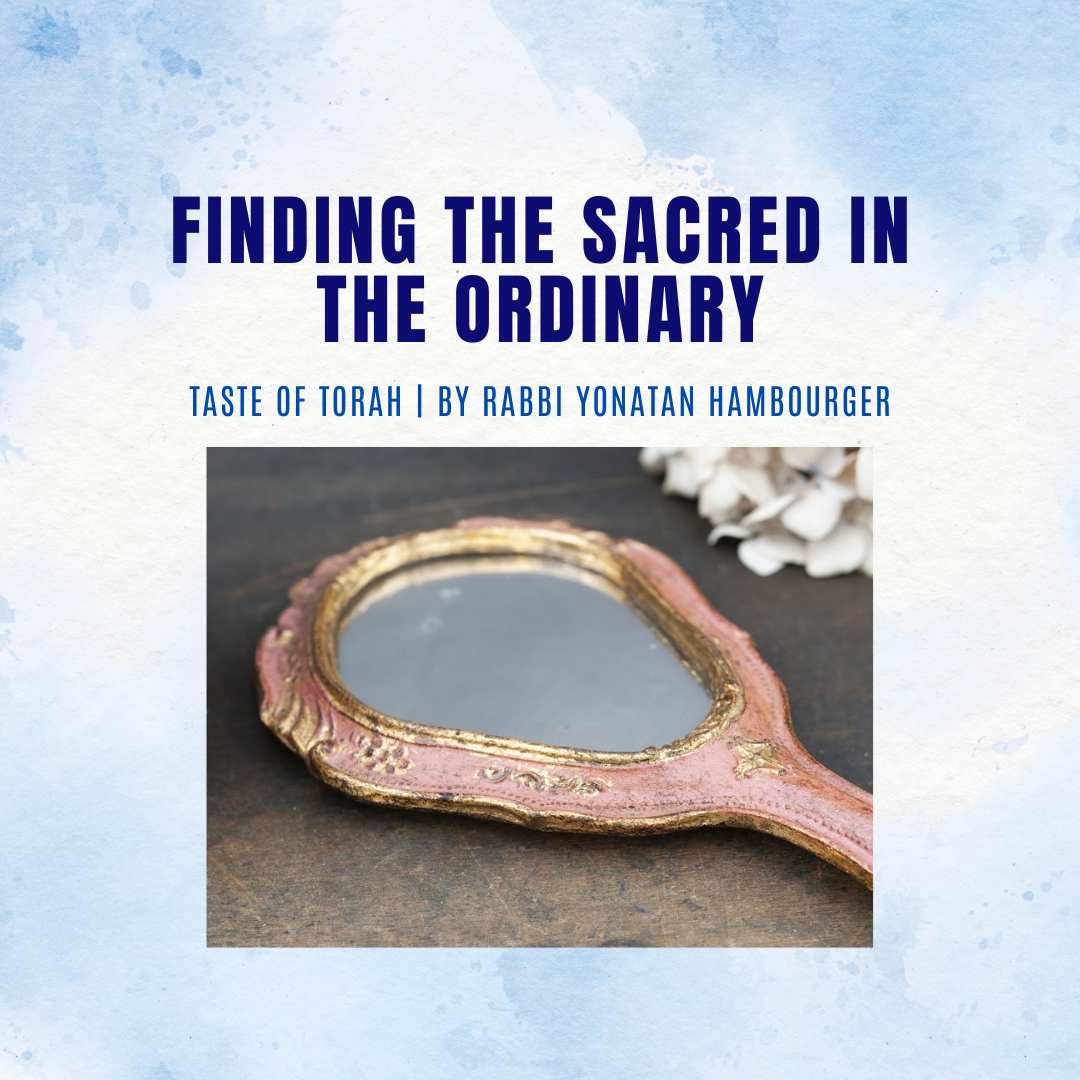
Finding the Sacred in the Ordinary
We often think of holiness as something distant and otherworldly – confined to Houses of Worship, or moments of profound spiritual experience. But Exodus 30:18 reveals a surprising truth about where sanctity can be found.
When the ancient Israelites built their tabernacle in the desert (think of it as a mobile spiritual center), G-d mandated a special washing station for the priests. But here's the surprising part: this station was made from women's used copper mirrors – the same mirrors these women had used during their harsh slavery in Egypt.
Moses initially hesitated to accept these mirrors. In his mind, they represented vanity and physical desire – after all, they were used for beautification. But G-d's response was unexpected and profound: "These mirrors are more precious to Me than anything else."
Why? Because these mirrors tell an extraordinary story of faith and resilience. During the brutal times of slavery, when Jewish men were too exhausted and dispirited to think about family life, their wives refused to give up hope. They used these very mirrors to make themselves attractive, encouraging their husbands to maintain their relationships and ensure the Jewish people's future. What might have seemed like a purely physical act was, in fact, deeply spiritual.
This teaches us something remarkable about how G-d views our world. Sometimes what appears mundane or questionable on the surface can be transformed into something sacred. However, it's crucial to understand that this principle only applies to permissible things used with holy intent. Anything that goes against G-d's will cannot be elevated to holiness, no matter our intentions.
Those mirrors weren't just beauty accessories – they were instruments of survival, hope, and continuity. G-d's message to Moses was clear: true holiness doesn't mean rejecting the physical world. Instead, it means finding ways to elevate ordinary things for higher purposes. Consider something as basic as eating: we can consume food like any other creature, focused only on satisfying our hunger, or we can transform that act by making a blessing, eating mindfully, and using the energy from that meal to perform acts of kindness. Even a simple steak dinner can become a gateway to serving a higher purpose.
In our modern world, where we often separate the "spiritual" from the "mundane," this ancient lesson reminds us that holiness can be found in the most unexpected places – even in a beauty mirror.
Shabbat Shalom,
Rabbi Yonatan Hambourger
March 13, 2025

Second Chances: A Timeless Message
Have you ever wished for a do-over in life? This week's Taste of Torah, drawn from the Book of Exodus (chapters 32-34), offers a fascinating perspective on second chances that speaks to all of us, regardless of our religious background.
At Mount Sinai, the entire people of Israel experienced the most profound divine revelation in history, experiencing G-d directly as He gave the Ten Commandments. Yet, shortly after this extraordinary moment, some turned to worship a golden calf. G-d tells Moses He's going to start over with a new group.
Next, Moses does something unexpected - he breaks the tablets, setting in motion Moses' atonement on behalf of his people, leading to G-d's forgiveness and His decision to provide a second set of tablets.
The first tablets represented a gift from above - pure divine wisdom that embodied G-d's direct instructions to us. But the second tablets incorporated something more: they included the process by which we expound and apply these teachings to our lives. This made the Torah a true partnership between divine revelation and human understanding, teaching us how to actively engage with divine wisdom in our daily lives.
Mountain-top moments might inspire us, but lasting change comes through the steady work of building a relationship. The second tablets symbolize this deeper connection - one we actively create, step by step, using our own understanding and effort.
Interestingly, both the broken and whole tablets were preserved in the Ark of the Covenant. This teaches us something powerful about handling life's failures. Instead of either despairing or trying to start from scratch, we can embrace a third path: carrying our past experiences with us - even the broken pieces - and using them as foundation stones for future growth.
This story carries a powerful message for all of us: it's never too late to start again. We all make mistakes - some small, some significant. But the door to redemption is always open. Whether it's mending a relationship, correcting a wrong, or changing our path in life, a genuine desire to change can create beautiful new beginnings.
I wish you a good week and a Shabbat Shalom,
Rabbi Yonatan Hambourger
March 6, 2025

The Power of Pure Oil: Finding Faith in Difficult Times
This week’s Taste of Torah examines Exodus 27:20, in which G-d commands the Israelites to bring "pure olive oil, crushed for lighting." This seemingly simple instruction carries a profound message that resonates with ancient wisdom and modern life.
Think about olive oil for a moment. Unlike water or wine, it refuses to mix with other liquids – it always rises to the top. Yet paradoxically, it also has the unique ability to seep into almost anything it touches. This dual nature mirrors the Jewish people's historical role: maintaining their distinct identity while profoundly influencing human civilization through values, ethics, and innovation.
But an even deeper lesson here speaks to all people of faith. The finest olive oil only emerges when the olive is crushed. This process mirrors our own spiritual journeys. Often, it's during life's toughest moments – when we feel most "crushed" - that our true character and faith shine brightest.
For my Jewish friends, this might remind you of how our ancestors maintained their identity despite centuries of persecution. For my Christian friends, this reflects the biblical truth that trials and tribulations often reveal the depth and authenticity of one's faith. Both traditions understand that pressure often reveals our hidden potential.
Today, many of us are blessed to live in relative peace and prosperity. We're no longer "crushed" by external forces like our ancestors were. This presents a new challenge: How do we maintain our spiritual identity and purpose when we are not compelled to defend it?
The answer lies in making conscious choices to keep our faith alive. Whether we attend services, study scripture, or simply take time for prayer and reflection, we must actively work to let our inner light shine. Just as pure olive oil kept the eternal flame burning in the Tabernacle and the Temple, we, too, must keep our spiritual flames alive through daily acts of kindness, faith, and purpose.
In these complex times, may we all find the strength to be like pure olive oil—staying true to our beliefs while positively influencing the world around us.
Shabbat Shalom,
Rabbi Yonatan Hambourger
February 27, 2025

Finding G-d in Our Daily Lives
Parshat Terumah 5785; Exodus 25:1-27:19
In the Book of Exodus (25:8), we find a fascinating instruction from G-d to the children of Israel. "They shall make for Me a sanctuary, and I will dwell within it," He tells them. But here's something interesting: in the original Hebrew, the word for "within" is actually plural, suggesting that G-d would dwell not just in the sanctuary, but "within them" – within each person.
This teaching speaks directly to our lives today. Just as those ancient travelers carried their portable sanctuary—the Tabernacle—through the desert, we, too, carry something sacred within us wherever we go. Whether we’re heading to the grocery store, visiting friends, or simply taking an evening stroll, G-d’s presence journeys with us.
Think about that for a moment. The Creator of the universe isn't confined to sanctuaries or formal prayer services. He's with us as we go about our daily routines, available for conversation and connection at any time.
The Jewish sages teach that G-d's purpose in creating the world was for us to make His presence evident in our world. It's like building a home – not just a physical structure but a spiritual one. Each kind word we speak, every helping hand we extend to a neighbor, and all the moments we choose to do what is right: these are the building blocks of our personal sanctuary.
This ancient wisdom reminds us that we don't need to wait for the Sabbath to connect with G-d. He has already given each of us a special place in our hearts where He resides. Whether working in our garden, sharing a meal with family, or simply sitting on the front porch watching the sunset, we can turn any moment into a sacred conversation with our Creator.
So, the next time you wonder if G-d is listening, remember: He's not just listening – He's right there with you, dwelling in the sanctuary of your heart, ready to be a part of every step of your journey.
Shabbat Shalom,
Rabbi Yonatan Hambourger
February 20, 2025

Hidden Wisdom in the Torah’s Laws of Torts and Damages
In this week’s Taste of Torah, we encounter what might seem like a simple set of property laws in the 21st and 22nd chapters of Exodus. At first glance, these ancient statutes about damages and responsibilities might appear purely practical. But as our sages teach us, the Torah's wisdom runs deep, with layers of meaning that speak to our very souls.
The text presents four fundamental types of damages for which we must take responsibility. Picture this: your neighbor's ox wanders into your field and tramples your crops. Or perhaps you've left a hazard on your property that causes injury to a passerby. Maybe you've directly caused harm to another's possessions, or you've let a fire spread beyond your control.
Our sages teach that these four categories – the wandering animal, the hazardous pit, direct human action, and the spreading flame – represent more than mere property law. They mirror the spiritual challenges we face daily.
Consider the wandering animal. Just as we must take responsibility for our livestock's behavior, we must also guard against our own untamed impulses. That hazardous pit? It represents the damage we cause through simple neglect – when we know better but fail to act. Direct damage reminds us that even our most well-intended actions must be guided by wisdom and restraint. And the spreading flame teaches us about the responsibility we bear for influences that begin with us but spread far beyond our immediate reach.
The ancient rabbis understood that these laws serve as a blueprint for refining our character. They knew that by studying these seemingly mundane rules, we would discover profound truths about human nature and our sacred obligations to one another.
In our modern world, where responsibility often seems optional and consequences distant, these timeless teachings remind us that true spiritual growth comes through mindful attention to our actions and their effects on others. They teach us that every deed, no matter how small, carries moral weight and spiritual significance.
May we merit to learn from these ancient wisdoms and apply them in our daily lives.
Shabbat Shalom,
Rabbi Yonatan Hambourger
February 13, 2025

Honoring Parents: A Divine Bridge Between Heaven and Earth
Parshat Yitro 5785; Exodus 18:1-20:23
This week’s Taste of Torah explores the Ten Commandments in the Book of Exodus, Chapter 20—serving as a timeless moral foundation that guides human behavior and promotes ethical principles across various cultures and religious traditions.
The Ten Commandments were inscribed on two tablets, divided into two sets of five: the first deals with our relationship with G-d, and the second with our relationship with fellow humans. Yet something seems out of place.
The fifth commandment - to honor our parents - appears in the first set. At first glance, this seems like a misplacement. Indeed, respecting our parents is about human relationships. Wouldn't it fit better alongside prohibitions against stealing or bearing false witness?
But there's profound wisdom in this placement. By including parental honor among the G-d-focused commandments, the Torah teaches us something remarkable about both parenthood and our relationship with the Divine.
Think about it: our parents are the closest thing we have to experiencing God's creative power. They brought us into existence, nurtured us when we were helpless, and sacrificed countless hours of sleep, personal time, and resources for our well-being. In many ways, they were our first glimpse of what unconditional love looks like.
Yet here's the challenging part - we're commanded to honor them regardless of whether we feel they "deserve" it. This isn't about reciprocating love or repaying kindness. It's about recognizing something more profound: the divine role parents play in the cosmic order of creation.
This placement teaches us that honoring parents isn't just about maintaining healthy family relationships. It's about acknowledging our place in a chain of existence that stretches back to Creation itself. When we honor our parents, we're not just fulfilling a social obligation but participating in something sacred.
This perspective offers both challenge and comfort to those struggling with complex family relationships. The commandment acknowledges that honoring parents isn't always easy—that's precisely why it was commanded. But it also reminds us that when we make this effort, we connect to something larger than ourselves.
In honoring our parents, we honor the very concept of creation and our own role in continuing its legacy.
Shabbat Shalom,
Rabbi Yonatan Hambourger
February 6, 2025

Faith in Action: Four Responses to Life's Challenges
Parshat Beshalach 5785, Genesis 13:17-17:15
This week’s Taste of Torah highlights the 14th chapter of the book of Exodus. The Jewish people stood at the Red Sea, with the Egyptian army closing in behind them. They divided into four groups, each symbolizing different approaches we might adopt when facing obstacles in our own lives.
The first group cried out in despair, willing to surrender and return to Egypt. How often do we also give up when challenges appear insurmountable? The second group readied for war, choosing to fight against impossible odds. The third group began to pray, believing that only divine intervention could save them. The fourth simply wanted to jump into the sea in desperation.
Moses' response to all of them was profound: "Move forward."
But moving forward into a sea seemed illogical, even crazy. This is where Nachshon, the prince and military leader of the tribe of Judah, enters the story, teaching perhaps the most crucial lesson about Jewish leadership and personal growth. While others debated and despaired, Nachshon walked into the sea. Step by step, the water rose to his ankles, knees, waist, and neck—until finally, at the last possible moment, the sea split.
In our modern lives, we often encounter our own "Red Seas" – seemingly impossible situations in our careers, relationships, or personal growth. Like those four groups, we might feel tempted to give up, fight blindly, wait for miracles, or resort to desperate measures.
But Nachshon's example presents a different path: when we have a clear moral imperative and a goal, we must move forward with unwavering focus. Whether it's starting a new business, rebuilding a relationship, or deepening our connection to tradition, the key is to keep moving ahead, even when we can't see the path before us.
The sea didn't split until Nachshon was nearly submerged, reminding us that breakthroughs often come at the moment of greatest challenge. What matters isn't the obstacle in front of us but our determination to take the next step forward.
Shabbat Shalom,
Rabbi Yonatan Hambourger
January 30, 2025
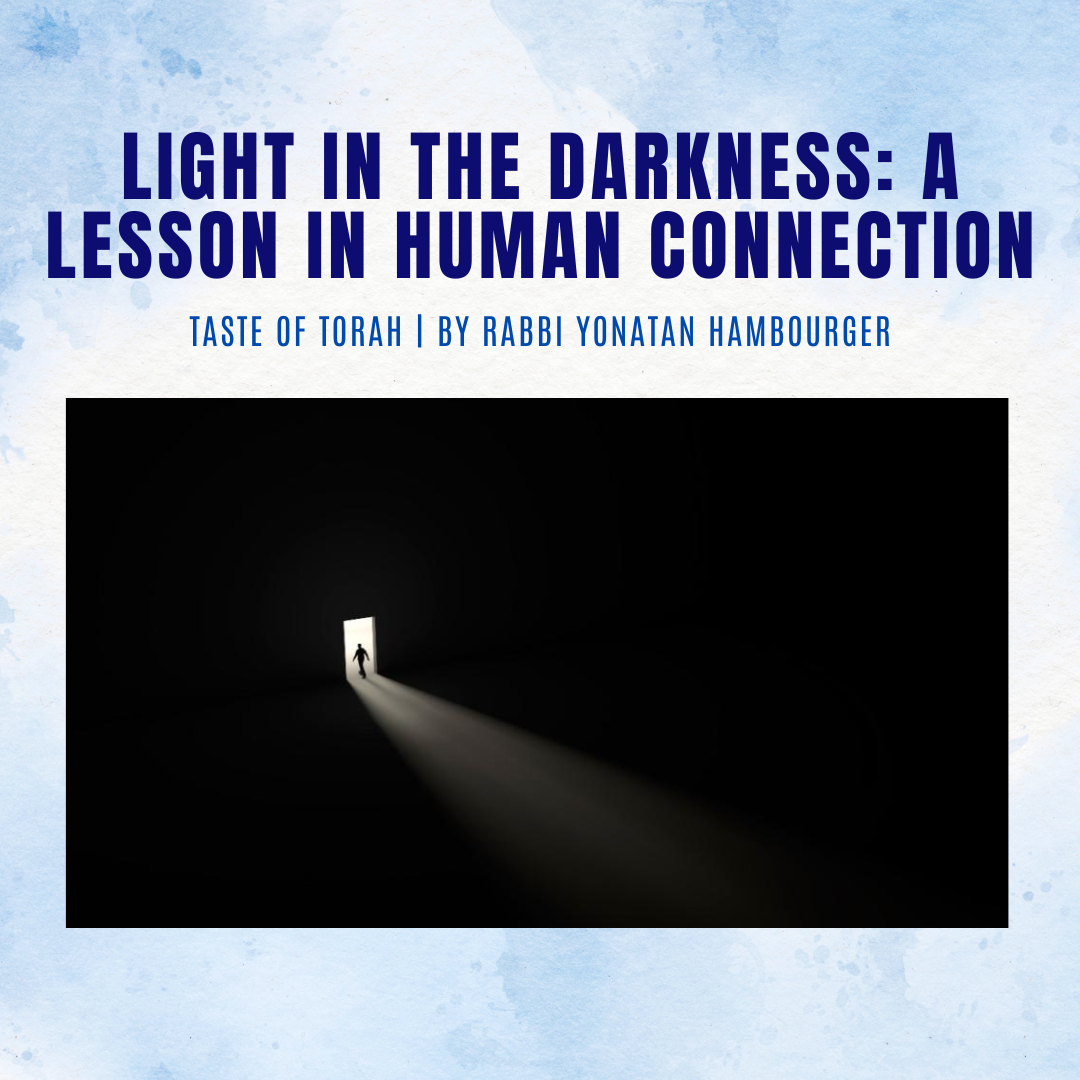
Light in the Darkness: A Lesson in Human Connection
This week’s Taste of Torah examines Parshat Bo (Exodus 10:23), where we encounter one of the most striking contrasts in the Torah: "No one could see anyone else or move about for three days. Yet all the Israelites had light in the places where they lived." This passage, describing the ninth plague in Egypt, provides profound insight into the human condition and our spiritual journey.
The darkness that enveloped Egypt was not merely a physical absence of light. According to Chassidic teaching, an extraordinarily dense and intense darkness immobilized the Egyptians, while the ancient Israelites experienced a remarkably bright environment. This contrast serves as a powerful metaphor for our own lives.
In our modern world, we often find ourselves surrounded by light – the glow of our devices, the brilliance of our achievements, the illumination of our knowledge. Yet paradoxically, many of us live in a different kind of darkness: the inability to truly see those around us. Like the Egyptians who "could not see anyone else," we too can become blind to the needs and struggles of our fellow human beings.
This spiritual darkness can afflict anyone. We might not notice when a friend needs comfort, a family member requires attention, or a colleague seeks understanding. We might become so focused on our personal "light" that we fail to share it with others.
The Torah teaches us that true illumination comes not only from having light but also from seeing and responding to others. The Children of Israel didn't merely have light in their homes; they could see and connect with one another. This serves as a powerful reminder that our most significant achievements mean little if we remain insensitive to those around us.
As we navigate our daily lives, let us remember that the antidote to darkness is not just the presence of light but the willingness to share it. When we extend ourselves beyond our personal concerns to illuminate the lives of others, we fulfill the deeper meaning of this biblical passage – transforming darkness into light through human connection and compassion.
Shabbat Shalom,
Rabbi Yonatan Hambourger
January 23, 2024

The Stubborn Pharaoh Within: Why Knowing Isn't Enough for Real Change
We've all been there. Three weeks into January, those shiny New Year's resolutions already gathering dust. The gym membership card untouched, the garage still cluttered, the late-night snacks still calling our names. And in those quiet moments of honesty, we face an uncomfortable truth: knowing what to change isn't the same as changing.
Our most significant obstacle to transformation isn't lack of knowledge—it's our resistance. Like the ancient Exodus saga we read this week in Parshat Va’era (Exodus: 6:2-9:35), we often see the truth but can't quite bring ourselves to act on it. Like Pharaoh, our hearts become hardened against change, even when we know it's exactly what we need. Pharaoh knew that he could stop G-d from decimating his country by freeing the Children of Israel from their bondage, but he couldn’t bring himself to do it.
Think about it. We're masters at the game of self-deception. We congratulate ourselves for merely recognizing our flaws as if awareness alone deserves a medal. We mistake good intentions for actual progress. But real change? That's a different story.
The secret to breaking free from the habits and fears that hold you back lies in moving beyond pure logic, which transcends reason. Stop trying to outsmart yourself. Instead, connect your desired change to something bigger than yourself. Make it about fulfilling your purpose, about becoming who you're meant to be.
When you align your goals with your deepest values and highest vision for yourself, excuses lose their power. It's no longer about willpower or logic but commitment to your destiny.
So next time you feel that pull toward change, don't just make a mental note. Make a soul-deep commitment. Because when you're answering the call of your highest self, no inner Pharaoh can stand in your way.
After all, true transformation isn't just about changing what you do—it's about becoming who you were always meant to be.
Shabbat Shalom,
Rabbi Yonatan Hambourger
January 16, 2025
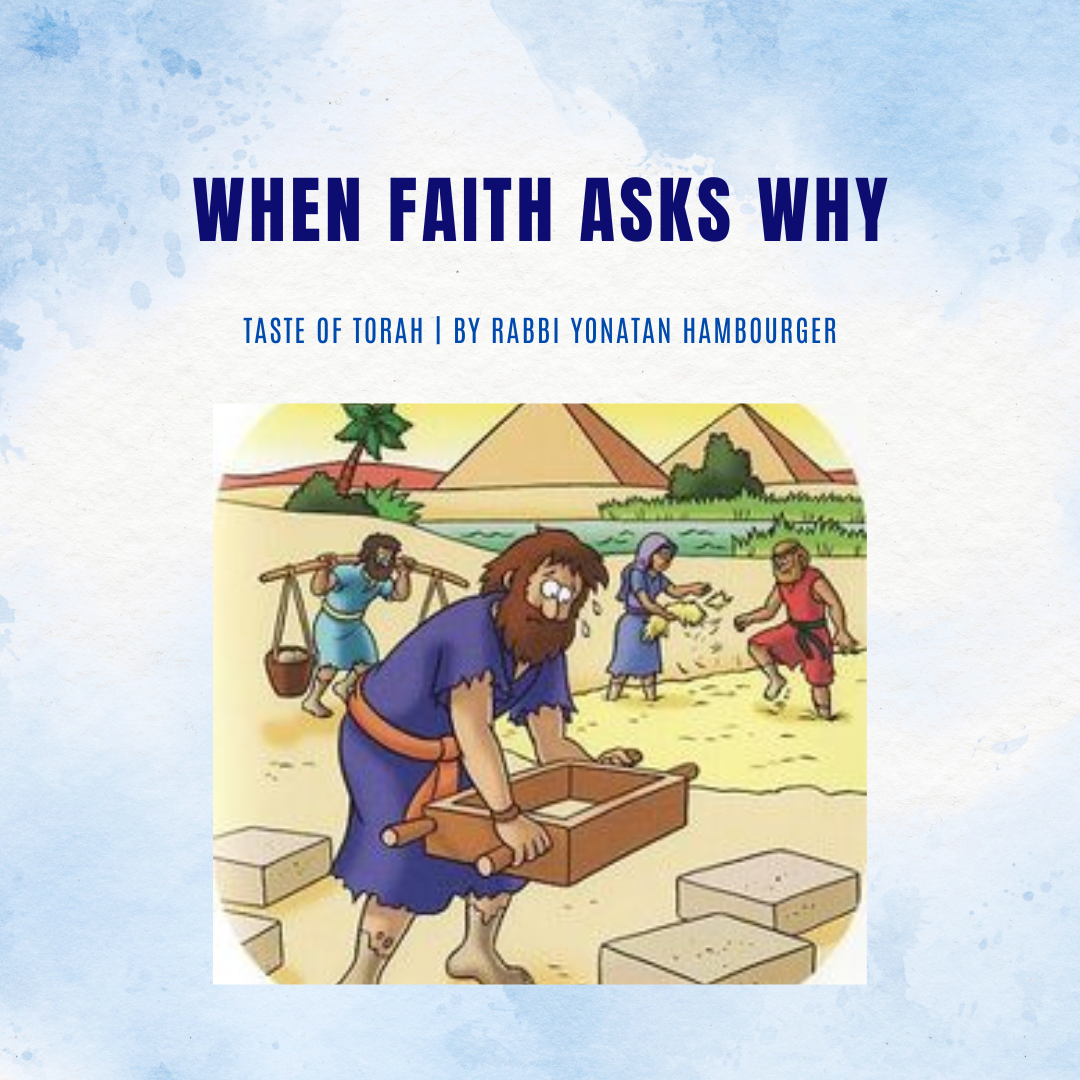
When Faith Asks Why
Parshat Shemot 5785, Exodus 1:1-6:1
In this week’s Taste of Torah, we examine the opening of the book of Exodus, 1:1-6:1, with the Israelites crying out from beneath the weight of Egyptian slavery. God chooses Moses to demand their freedom. But when Moses confronts Pharaoh, things get worse. Much worse.
The Egyptians stopped providing straw for brickmaking yet demanded the same quota. This is akin to your boss doubling your workload while removing your computer. The people who once regarded Moses as a savior now see him as the cause of their suffering.
And that's when Moses does something remarkable. In chapter 2:22, he turns to God and asks, "Why have you mistreated this people?" This isn't the quiet doubt of a skeptic or the angry challenge of a rebel; it is the question of someone who believes so deeply that he needs to understand.
The Jewish people inherited their faith from Abraham, Isaac, and Jacob. But inherited faith is like a hand-me-down coat—it needs to be tailored before it truly fits. Sometimes, that tailoring comes through questions that feel almost too dangerous to ask.
God's response to Moses reveals something profound: the exile wasn't just suffering to endure—it was a crucible for transformation. The people needed more than their ancestors' stories—they needed their own.
Years later, the prophet Jeremiah would capture this tension perfectly. You can believe with every fiber of your being that God's plan is perfect, he suggested, while still crying out, "You are right, yet I still complain!" That's not faithlessness - it's faith growing more mature through honest questioning.
Ultimately, this story isn't just about Moses or ancient Egypt. It's about everyone who has ever looked up to the stars with absolute faith and burning questions. It's about the courage to stand in that space between certainty and doubt, trusting that the very act of wrestling with hard questions can strengthen our faith.
After all, only someone who truly believes in answers dares to ask the most challenging questions.
Shabbat Shalom,
Rabbi Yonatan Hambourger
January 9, 2025
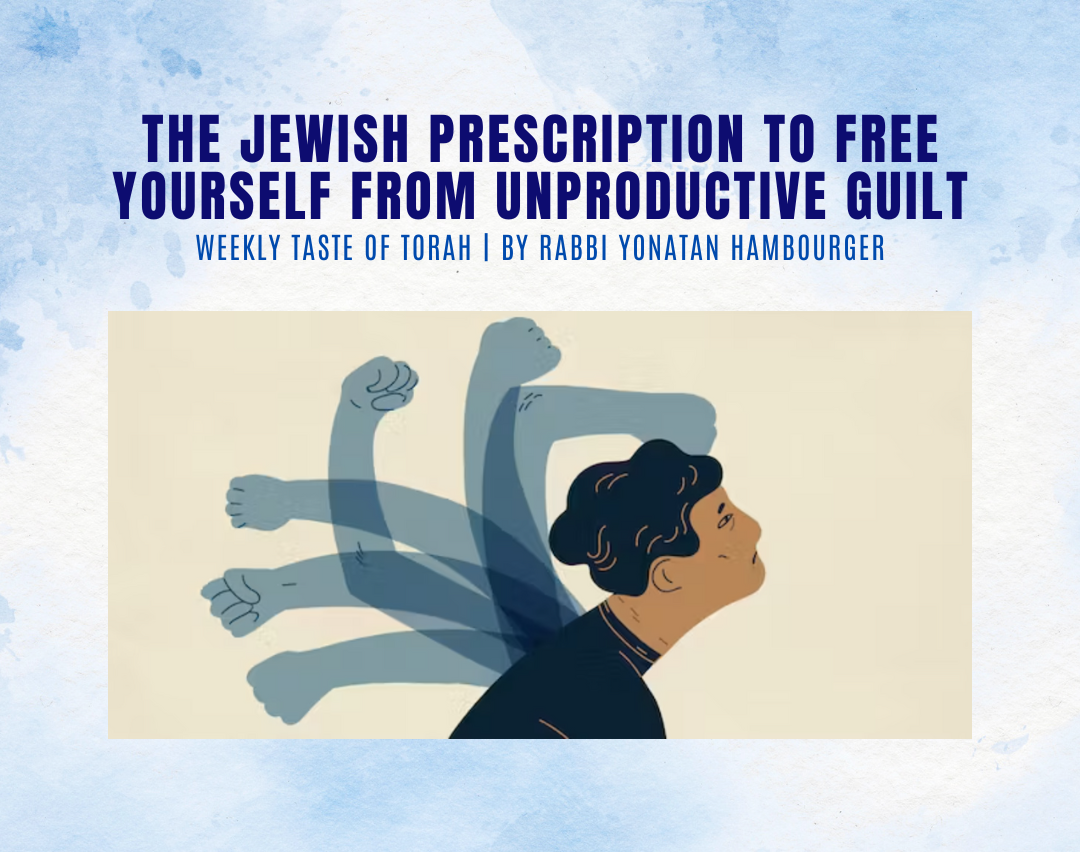
The Jewish Pathway to Liberation from Unproductive Guilt
This week’s Taste of Torah highlights Parshat Vayechi, Genesis 49:15-20. For many years, Joseph had generously cared for his brothers and their families, allowing everyone to thrive. However, when their father Jacob passed away seventeen years later, the brothers were consumed by fear, thinking, "What if Joseph harbors resentment and seeks revenge for the wrongs we inflicted upon him?"
Their hearts were so heavy with guilt that they devised a plan to ensure Joseph would continue to show them kindness. In response to this distressing display of insecurity, Joseph was moved to tears and reassured them with compassion that he would always provide for them.
Is there any value in holding onto guilt and shame over the years? Absolutely not!
At the heart of Judaism lies a profound principle that invites us to rectify our wrongs—no matter how daunting—and move forward. This principle served Adam and Eve after their transgression in Eden and guided the children of Israel after they strayed with the golden calf. Likewise, it can empower you!
Here is your guiding light to liberate yourself from unproductive guilt:
- Articulate your wrongdoings: Clearly express to G-d what you regret and acknowledge your mistakes. Hearing your own voice helps release the burdens that weigh on your spirit so you can let them go once and for all.
- Make amends: Take steps to apologize sincerely to those you've hurt, offering restitution where it’s possible. If forgiveness isn’t granted immediately, persist by trying two more times (after which you are free from obligation according to Jewish law).
- Increase your generosity: Give more charity than you're accustomed to giving. Acts of charity heal not just the world around us but also nourish your own soul.
- Transform your actions: Compensate for past mistakes by striving for improvement—be kinder in your interactions and commit yourself to learning more.
As we embark on this New Year, I urge you to embrace a fresh beginning!
Shabbat Shalom,
Rabbi Yonatan
January 1, 2025
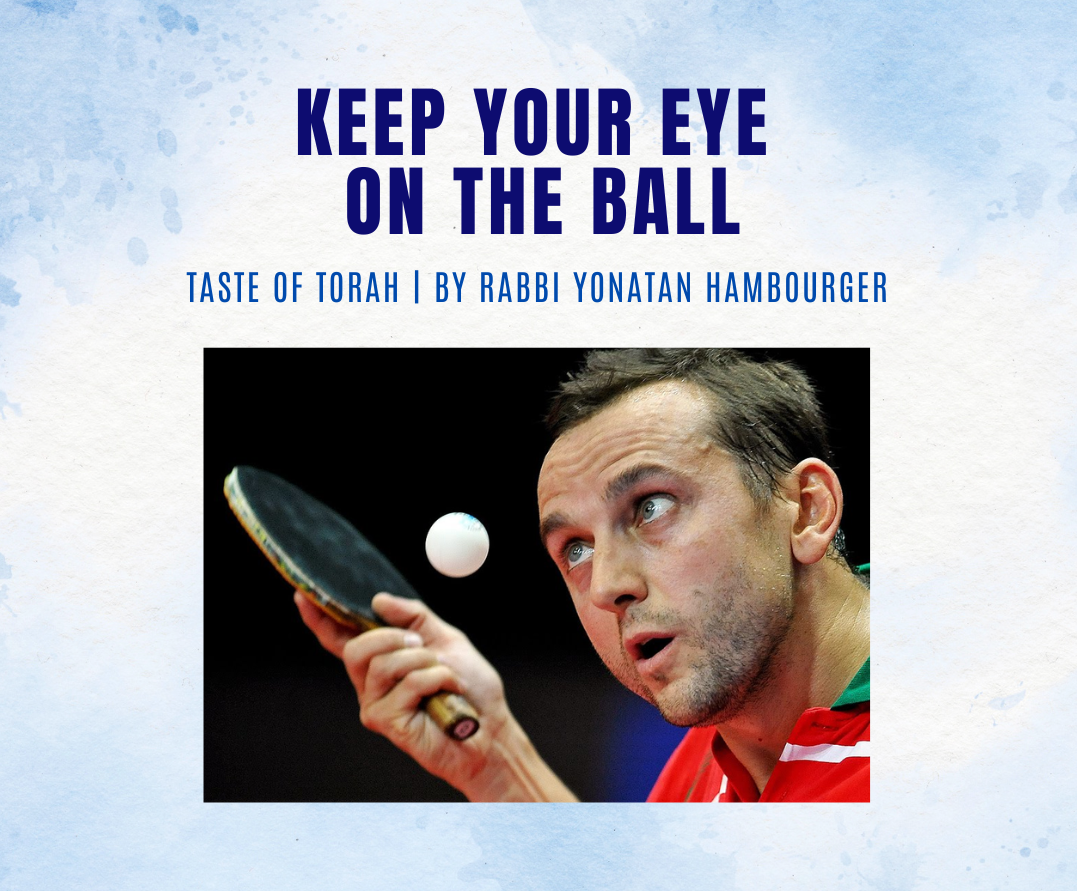
Keep Your Eye on the Ball
This week’s Torah portion of Vayigash can be found in is the book of Genesis, Chapter 44:18-47:27, which deals with the life of Joseph and his brothers…
Envision, for a moment, G-d forbid, a scenario where your own family harbored such deep resentment towards you that they actively sought to undermine your happiness and success during your formative years.
Despite the odds stacked against you, you rise to extraordinary heights of achievement and fulfillment. In stark contrast, your siblings find themselves in dire straits, grappling with poverty and despair. Now, you possess the resources to assist the very family that once treated you so unjustly.
Would you seek vengeance and repay their wrongs in kind? Let us reflect on how our forefather Joseph responded when he ultimately revealed his true identity to his brothers—those who had nearly taken his life and sold him into slavery over two decades prior.
Genesis 45:5-8 beautifully captures Joseph's response in Genesis Chapter 45: 5-8, “Do not be upset with yourselves,” he reassures them. “It was not you who sent me here, but G-d. It has all been ordained from Above to save us, and the entire region, from famine…So now you can understand that it was not you who sent me here, but G-d.”
Indeed, while Joseph’s brothers were responsible for their bad actions before G-d, it is crucial to recognize that had they chosen differently, G-d would have found another way for Joseph to fulfill his purpose.
Joseph grasped an essential truth—that every occurrence in life, no matter how negative it may appear, is woven into G-d’s larger design.
Our lives gain depth and richness when we direct our energies toward our mission rather than nurturing bitterness from perceived slights by others. Their actions are theirs alone—between them and G-d.
By embracing this profound message—even if just partially—we can liberate ourselves from the shackles of unproductive negativity. Let us release the habit of tallying grievances and instead commit ourselves to a greater number of acts filled with goodness and kindness.
Shabbat Shalom,
Rabbi Yonatan
December 26, 2024
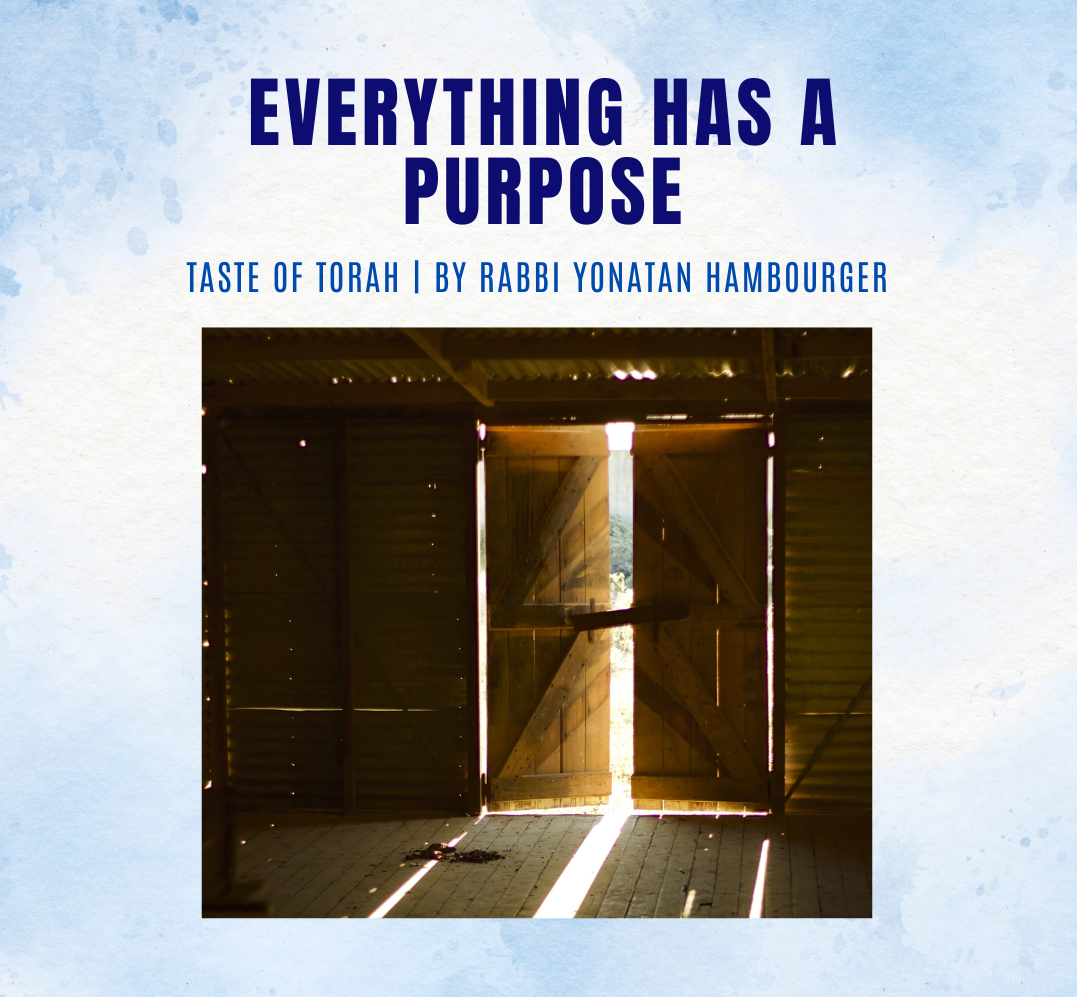
Everything Has a Purpose
This week’s Torah portion, Mikeitz (Genesis 41:1-44:17), unfolds a remarkable story in which the Pharaoh of Egypt elevates Joseph to the position of Viceroy. This decision follows Joseph’s prophetic insight that foretells seven years of plentiful harvests followed by seven years of famine. With wisdom and foresight, Joseph crafts a brilliant strategy to safeguard the nation from impending disaster. Impressed by his brilliance, Pharaoh entrusts Joseph with the crucial task of gathering and distributing grain to sustain the entire country, ensuring that neighboring nations can also purchase any surplus.
In nearby Israel, when famine strikes, Jacob sends ten of his sons to Egypt in search of food—unaware that Joseph is alive and holds power as Egypt's leader. When they encounter Joseph, they fail to recognize him as their brother whom they had sold into slavery two decades earlier.
In a dramatic turn, Joseph accuses them falsely of espionage. In that pivotal moment, the brothers grasp that there must be a higher purpose at play; they come to understand that G-d governs all events, affirming that nothing occurs without divine intention. Reflecting on their past actions, they realize they are enduring consequences for their grievous sin against Joseph—selling him into slavery and deceiving their father into believing he was killed by wild animals.
As they connect these painful memories with their present plight, repentance floods over them, leading to redemption. Eventually, Joseph reveals his true identity to his brothers, and Jacob and the entire family are invited to settle in Egypt’s most fruitful lands as honored guests.
The profound takeaway for us lies in recognizing that every event is imbued with meaning; nothing is merely coincidental. When faced with adversity, it may signify an opportunity from G-d for introspection and repentance regarding past misdeeds—even those long forgotten. Acknowledging our errors and seeking forgiveness can transform our circumstances toward a brighter future.
Happy Holidays, Chanukah Samayach, & Shabbat Shalom,
Rabbi Yonatan
December 19, 2024
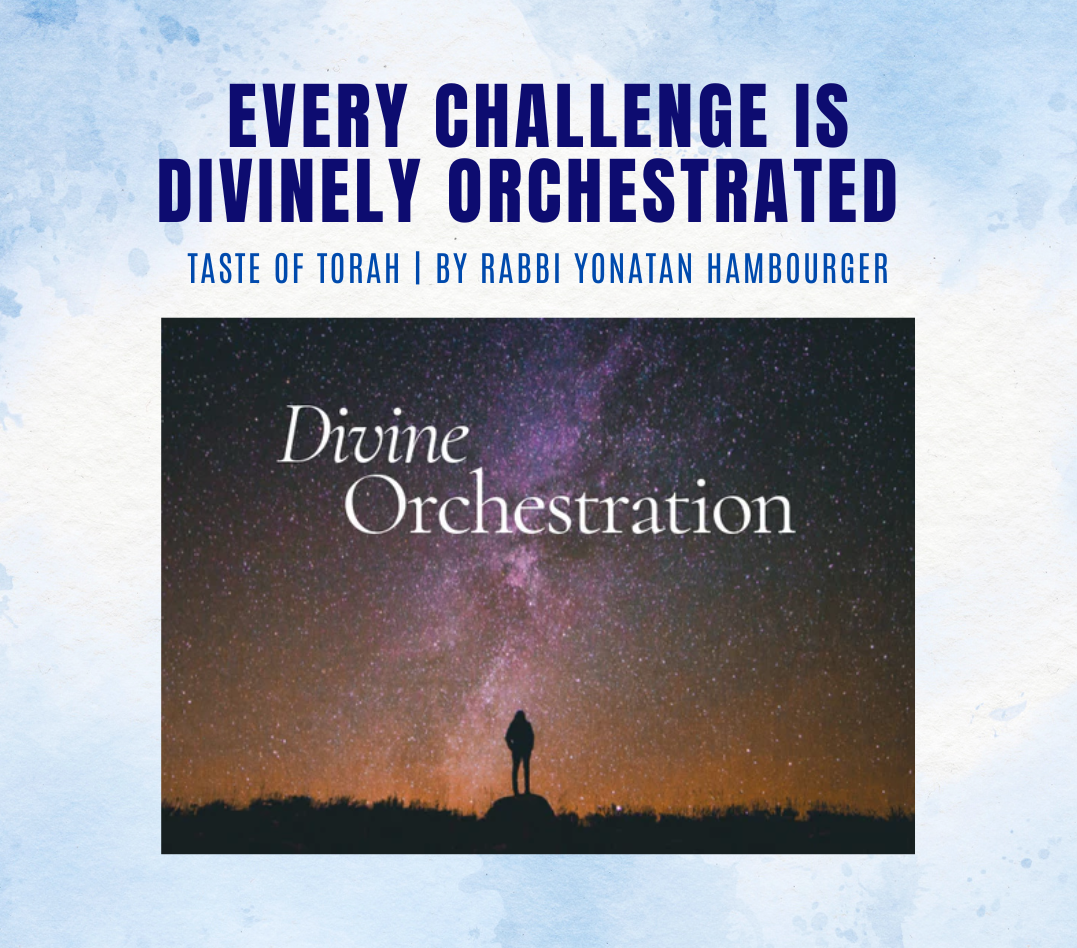
Every Challenge is Divinely Orchestrated
In this week's Torah portion of Vayeshev (Genesis 37:1-40:23), we read the remarkable story of Joseph. Despite being loathed by his brothers, who sell him to a group of Ishmaelite nomads, his journey turns for the worse as he is sold at an Egyptian slave auction to serve Pharaoh's royal butcher. When faced with the seductive advances of his master's wife, Joseph's steadfast refusal leads to his unjust imprisonment in a dungeon for twelve long years.
During his time behind bars, he encounters two fellow inmates—the royal butler and the royal baker—whose dreams he interprets with remarkable insight. This very gift becomes crucial when Pharaoh summons him to unravel his own troubling dreams, paving the way for Joseph’s liberation and rise to Pharaoh's trusted second-in-command. He goes on to save Egypt as well as his own family from starvation.
I would like to focus on a tiny but remarkable detail: While in prison, Joseph observes that the wine steward and the baker appear despondent. “Why are your faces looking so sad today?”
Why does Joseph care if these guys are having a bad day? They were not his friends. But to Joseph, the fact that G-d had arranged for him to notice someone in need indicated that it was his duty to help.
Joseph lived with an understanding that all events unfold for a purpose, believing wholeheartedly that each challenge was divinely orchestrated. In every circumstance, he embodied the belief that Divine Providence guides us toward our true path.
Let us draw upon this lesson as we face our own trials and tribulations. May we muster the courage to confront any adversities that may arise in our lives by recognizing that everything originates from G-d and serves a greater purpose. Rather than succumbing to feelings of victimhood, let us strive to seize the opportunities granted by Divine Providence with gratitude and determination.
Shabbat Shalom,
Rabbi Yonatan
December 12, 2024

Blessed Beyond Merit
This week's Torah portion, Vayishlach (Genesis 32:4-36:43), reveals one of the most poignant stories in scripture. Jacob had escaped his brother Esau’s temper more than thirty years prior. Now, Esau approaches with a formidable army of 400 men.
Decades earlier, following his mother Rebecca's command, Jacob had taken with ‘guile’ two blessings meant for Esau from their father, Isaac. It is crucial to differentiate this act from the Abrahamic blessing Isaac deliberately granted to Jacob, ensuring that the spiritual legacy of Avraham would remain with the Jewish people through him.
As the encounter loomed closer, Jacob devised a three-part strategy to ease Esau's hostility. He sent a generous gift to win Esau’s favor, turned to G-d in heartfelt prayer, and prepared himself for conflict if necessary.
G-d blessed Jacob, transforming what could have been a fierce clash into a moment of deep if fleeting, reconciliation with his brother.
Upon examining the essence of Jacob's prayer, we recognize that despite his many merits and prior divine promises of support and success, Jacob's heart was still weighed down by fear. In Genesis Chapter 32:4-13, he earnestly cries out to G-d, humbly admitting, “I am no longer worthy, due to all the acts of kindness and trustworthiness that You have done for me...” Jacob sought G-d’s help by placing his faith solely in divine mercy rather than in his own achievements.
Following Jacob’s example, when we reach out for G-d’s assistance, we too should appeal to His infinite kindness and compassion. If we anchor our requests in our own sense of worth, even with our many merits, G-d’s response may be limited to those very accomplishments. However, when we humbly relinquish our sense of entitlement and rise above our narrow viewpoints, as Jacob did, G-d can shower us with blessings that transcend the ordinary limits of the world.
Shabbat Shalom,
Rabbi Yonatan Hambourger
Click on the button to subscribe and receive an update each week!
December 5, 2024

Ladders Over Bridges
In this week's Torah reading, Vayetze (Genesis 28:10-32:3), we accompany Jacob as he departs from his hometown of Beersheba in Israel, embarking on a journey to Charan, which lies in present-day Turkey. During his travels, he arrives at “the place” (Jerusalem) and experiences a profound dream of a ladder that unites heaven and earth, with angels gracefully ascending and descending upon it (28:12).
The Torah employs the metaphor of the ladder to illustrate the connection between the divine and the earthly realms, allowing us to comprehend the essence of transformation.
As we stand at pivotal moments in our lives, we often attempt to bridge the distance from our current situation to where we aspire to be. However, even as we strive for change in location, true growth within may not occur. Remaining at a constant level can prevent us from rising above our existing state.
On the other hand, by climbing or descending the rungs of a ladder, we experience gradual shifts in elevation. We are perpetually either ascending or descending; stagnation is not an option. Our viewpoint expands as we rise higher, or it constricts as we descend.
We can utilize Jacob’s ladder as a tool for measuring our spiritual progress. Each rung represents our spiritual altitude at any moment—whether one is on a lower rung making strides upwards or perched high but slipping downwards. One thing remains clear: there is no static existence; we are either climbing towards our aspirations or sliding away from them.
Jacob’s ladder serves as a spiritual compass, guiding us to realign our thoughts, words, and actions toward positivity. You have the power to begin this journey right now by evaluating your position on your ladder concerning your own mindset. And always remember: should you find yourself sliding down a rung, you possess the strength to ascend even higher than before.
Shabbat Shalom,
Rabbi Yonatan
November 28, 2024
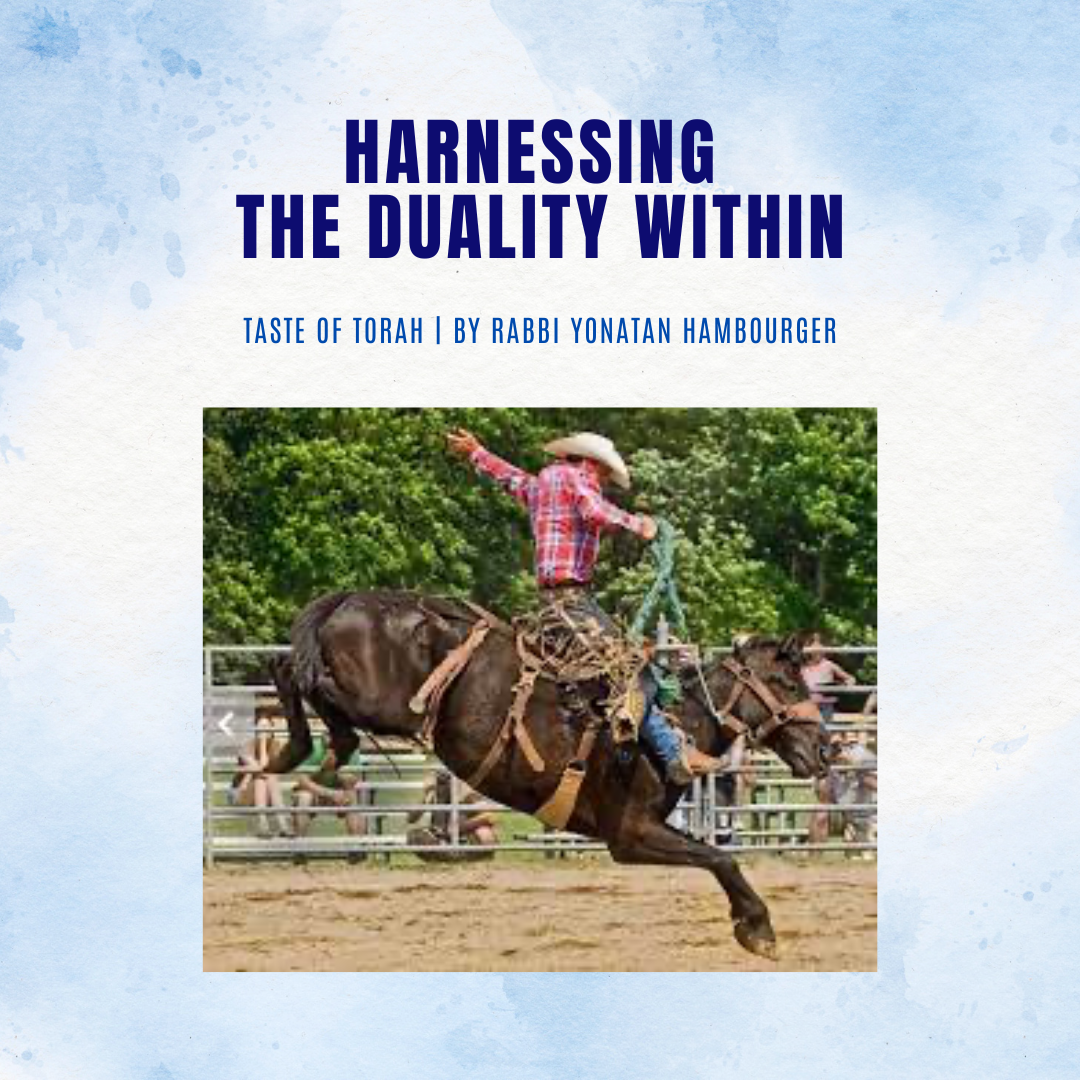
Harnessing the Duality Within
This week’s Torah portion, Toledot (Genesis 25:19-28:9), unfolds the narrative of Isaac and Rebekah's twin sons, Jacob, and Esau. From the very beginning, even while still in their mother’s womb, it is evident that these brothers will embody stark contrasts—both physically and spiritually. Their journeys through life are destined to intersect in a way that one’s achievements often come at the expense of the other’s. Yet, there lies a profound truth: despite being the firstborn, Esau is foretold to serve his younger brother, Jacob.
In a metaphorical sense, Esau symbolizes our animalistic instincts, while Jacob embodies our aspirations toward morality and spiritual growth. Just as Esau was born before Jacob, so too do our raw, animalistic impulses emerge ahead of our moral compass; our values develop gradually over time, while our base instincts are fully formed from birth.
Chapter 25:26 illustrates this dynamic beautifully with the image of “Jacob’s hand grasping Esau’s heel.” This signifies how our inner Jacob—the divine aspect within us—seeks to elevate and refine our inner Esau, which represents our base inclinations. The heel of Esau signifies the most materialistic dimensions of existence.
Essentially, our divine essence endeavors to uplift even those facets of life that may seem distant from holiness. When we allow our higher selves to shine forth, we diminish the grip of materialism on our lives.
Our inner "animal," though capable of wrongdoing, is not inherently evil; rather, its strength provides us with essential material sustenance. However, it is up to our inner "adult" to tame this “animal within,” channeling its power towards a greater purpose aligned with G-dly values.
Just as light effortlessly dispels darkness without struggle, so too does our higher self conquer animalistic urges. When we invite holiness into our lives through Torah study and adherence to G-d's commandments, we illuminate the shadows cast by selfishness and awaken a more profound goodness within ourselves.
Shabbat Shalom,
Rabbi Yonatan
November 21, 2024

The Torah’s Prescription for Aging Well
This week's Torah portion, Chaya Sarah, is drawn from Genesis 23:1–25:18. Let us hone in on chapter 24:1, where it states, “Avraham grew old, and he came in days.”
At first glance, the expression “he came in days” may seem redundant; it simply conveys that he grew old. However, Jewish mystics interpret this phrase as a testament to someone who maximizes each day by engaging in good deeds—these acts become a ‘garment of glory for his soul.’
Delving deeper, “he came in days” reflects not only the achievements of one’s life but also the mindset with which we approach our daily experiences.
In our youth, we often perceive endless possibilities within every interaction and moment. Yet as we face disappointments and setbacks over time, even our successes can start to feel monotonous. The joys of life lose their vibrancy while the sorrows dull.
When we consider that Avraham “grew old and he came in days,” we recognize a man who immersed himself fully in each moment rather than merely existing through them.
Earlier in Genesis 18:11, we find a similar description stating that “Avraham and Sarah were old, coming in days.” The repetition of this sentiment—forty years later—underscores how time did not lessen Avraham's zest for life.
What made Avraham truly remarkable was his ability to continue embracing each day as he aged. A lifetime filled with challenges and victories did not quench his desire for existence. He lived each day with full engagement, possession, and celebration.
Let us draw inspiration from Patriarch Avraham and embrace the wisdom of the phrase “Carpe Diem”— “Seize the day!”
Shabbat Shalom,
Rabbi Yonatan
November 14, 2024

No Man is an Island
In this week's Torah portion of Vayera, we find the Bible’s first illustration of the Value of Social Responsibility as articulated vis a vis Avraham in the book of Genesis (Chapter 18:20-33). While ancient civilizations prioritized individual survival at the expense of the vulnerable, the Torah introduced a transformative principle: the moral obligation to care for every member of society.
While Noah and Avraham stand as pivotal figures in the narrative of humanity, their different responses during times of crisis serve as powerful lessons for us today.
When faced with the impending destruction of the wicked, Noah complied with divine instruction, constructing the Ark to ensure his and his family's safety. Yet, he showed no empathy for those condemned around him, believing that since G-d had already decreed their fate, there was no reason for further concern. However, G-d had hoped for Noah to intercede on behalf of these lost souls.
In stark contrast, Avraham exhibited profound compassion for the wicked inhabitants of Sodom and Gomorrah. Their sin lay not only in neglecting the poor and needy but also in committing unspeakable acts of cruelty against guests and those who sought to help.
Avraham fervently advocated for these individuals despite their wickedness, engaging in a remarkable dialogue with G-d. Ultimately, his pleas did not alter their fate, but his determination was not in vain; G-d valued that commitment, even if it did not yield a tangible reward.
This exemplifies how the core of Social Responsibility is intricately woven into the fabric of Jewish identity. As Christianity adopted and spread this principle, the message to aid those in need resonated with a broader global audience.
Cultivating a sense of responsibility for others is vital, and we must act on it. Let us commit ourselves to caring for those around us, showing genuine interest in their well-being, and offering assistance in any way we can. Embrace the opportunity to uplift the person beside you!
Shabbat Shalom,
Rabbi Yonatan
November 7, 2024
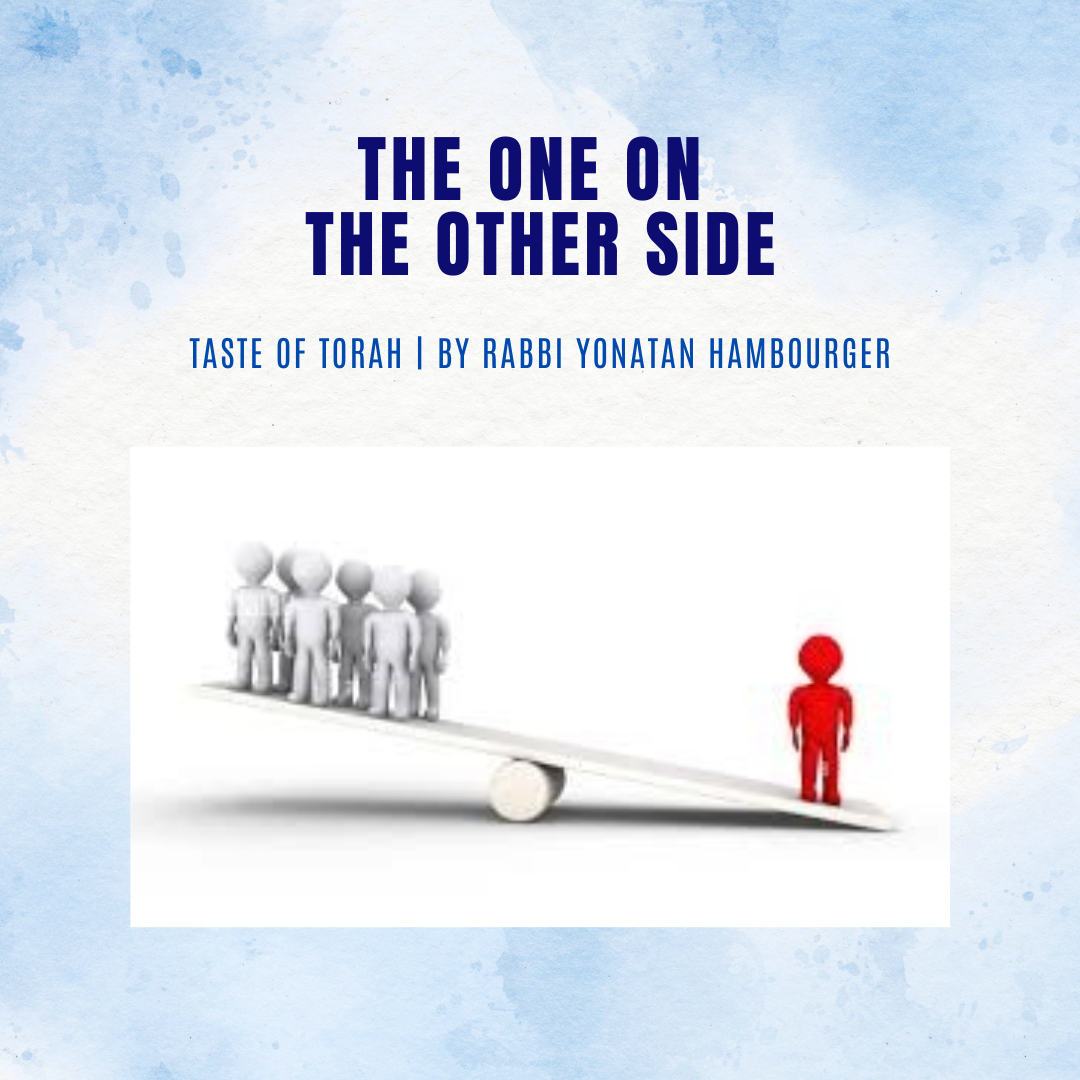
The One on The Other Side
In this week’s Torah portion, Lech Lecha (Genesis 12:1-17:27), we encounter Avraham, the founding father of the Jewish people, who brought forth the concept of ethical monotheism to humanity. This profound idea serves as the cornerstone for the religious beliefs that shape much of our world today and has significantly influenced how Western, secular societies perceive life in general.
Around 3,800 years ago, during Avraham's time, paganism dominated the world with a worldview that creation stemmed from multiple competing forces that remained indifferent to human affairs. In contrast, Avraham unveiled the truth of a singular Creator and embarked on a mission to eradicate idolatry. This is perhaps why the Torah designates him as “Ha’Ivri,” translated as “the Hebrew,” which means “the one on the other side,” symbolizing his position apart from a world steeped in cruelty and corruption.
Avraham introduced a revolutionary perspective: that Creation is a deliberate act by a unified and loving God, instilling within civilization a sense of purpose for our existence. With this understanding comes not only fulfillment but also an invigorating motivation to live life fully.
In contrast to the nihilistic tendencies of today’s neo-pagan philosophies—where life’s goodness seems merely contingent upon chance—Judeo-Christian values affirm that God embodies inherent goodness. He possesses infinite capabilities and cares deeply for His creations. This belief nurtures our trust in a positive outcome for our lives.
Does this imply that every situation unfolds as we wish? Not necessarily. However, regardless of life's twists and turns, we can face each moment without fear because we are in His capable hands; He understands what is truly best for us.
Understanding the Creator is not merely a goal; it embodies the essence of our very being. Inspired by Avraham's legacy, let us strive to share this profound truth with everyone we encounter.
Shabbat Shalom,
Rabbi Yonatan
October 31, 2024
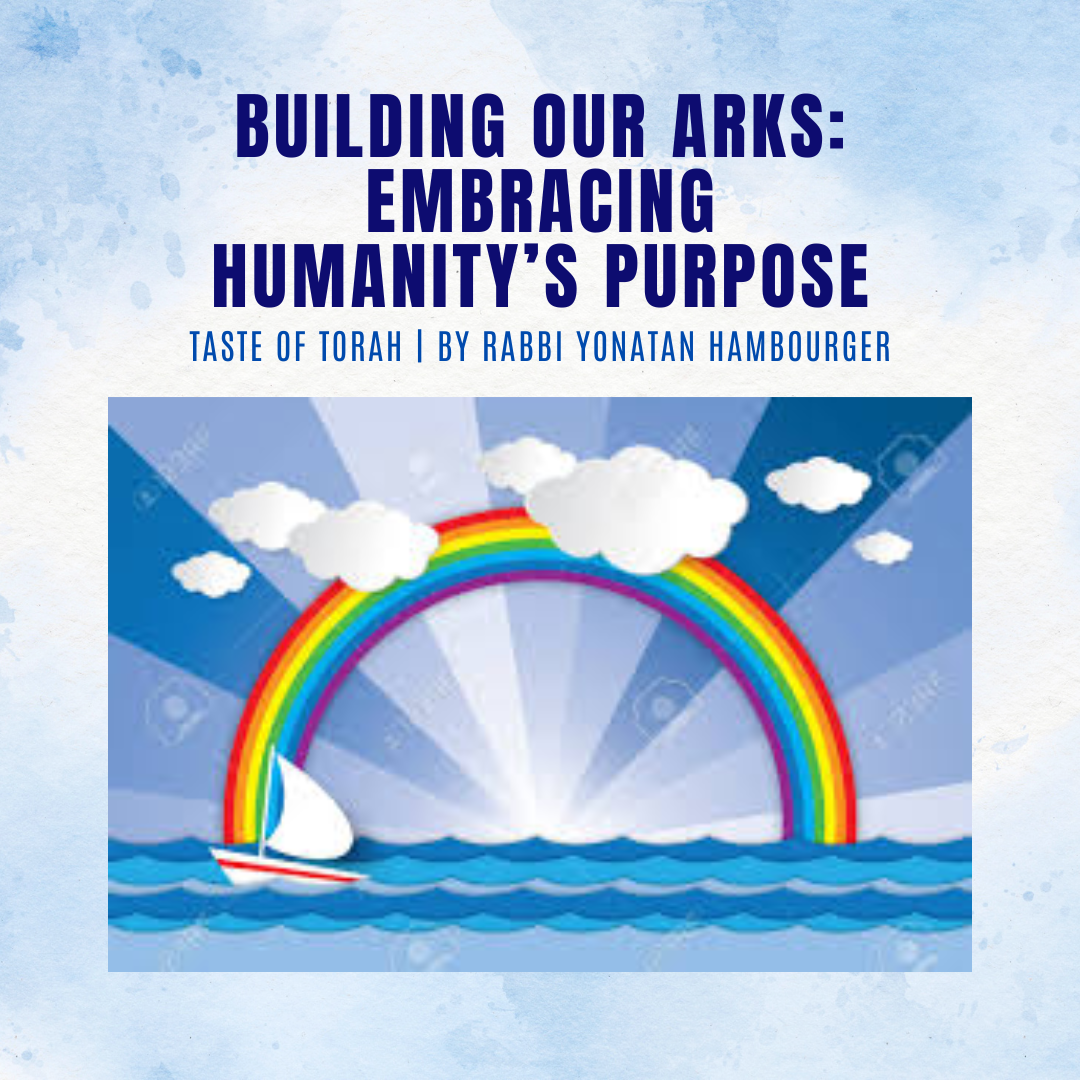
Building Our Arks: Embracing Humanity’s Purpose
This week we read in the story of Noah and the Ark, how humanity had sunk into an abyss of moral depravity. The one notable exception was Noah, “perfect in his generations,” who was tasked by G-d to build an ark to save his family as well as every species of animal from the coming deluge.
What you may not know is that even after G-d decided to flood the Earth, he gave everyone ample opportunity to change their ways and live. Even after the downpour started people could have transformed the destructive storms into rains of blessing, but they remained hard-hearted.
Upon leaving the ark, Noah and his family were charged with re-building humanity based on G-d’s original plan for Adam and Eve. They were provided with a set of ethical laws for all human society, for all time.
These universal laws include: (1) expressing gratitude to the Divine; (2) striving to improve the lives of others; (3) respecting the sanctity of human relationships, particularly within family life; (4) embracing a life of generosity and contentment; (5) being accountable for the welfare of all of creation, including animals and the planet; and (6) promoting a system of genuine justice and charity, encouraging others to act with fairness and generosity.
There are destructive rains in every generation, representing various anti-spiritual influences. They may appear harmless at first, but ultimately can destroy the very fabric of society.
Each person, each family, each community must make sure that their ark is watertight, by embracing G-d’s wisdom as established in these laws. But it’s not enough to keep darkness out. Each of us must encourage the light within to shine outward and transform the surrounding darkness into G-dly light.
All that’s missing is to embrace the common ground found in G-d’s message of humanity’s purpose.
Shabbat Shalom,
Rabbi Yonatan
October 22, 2024
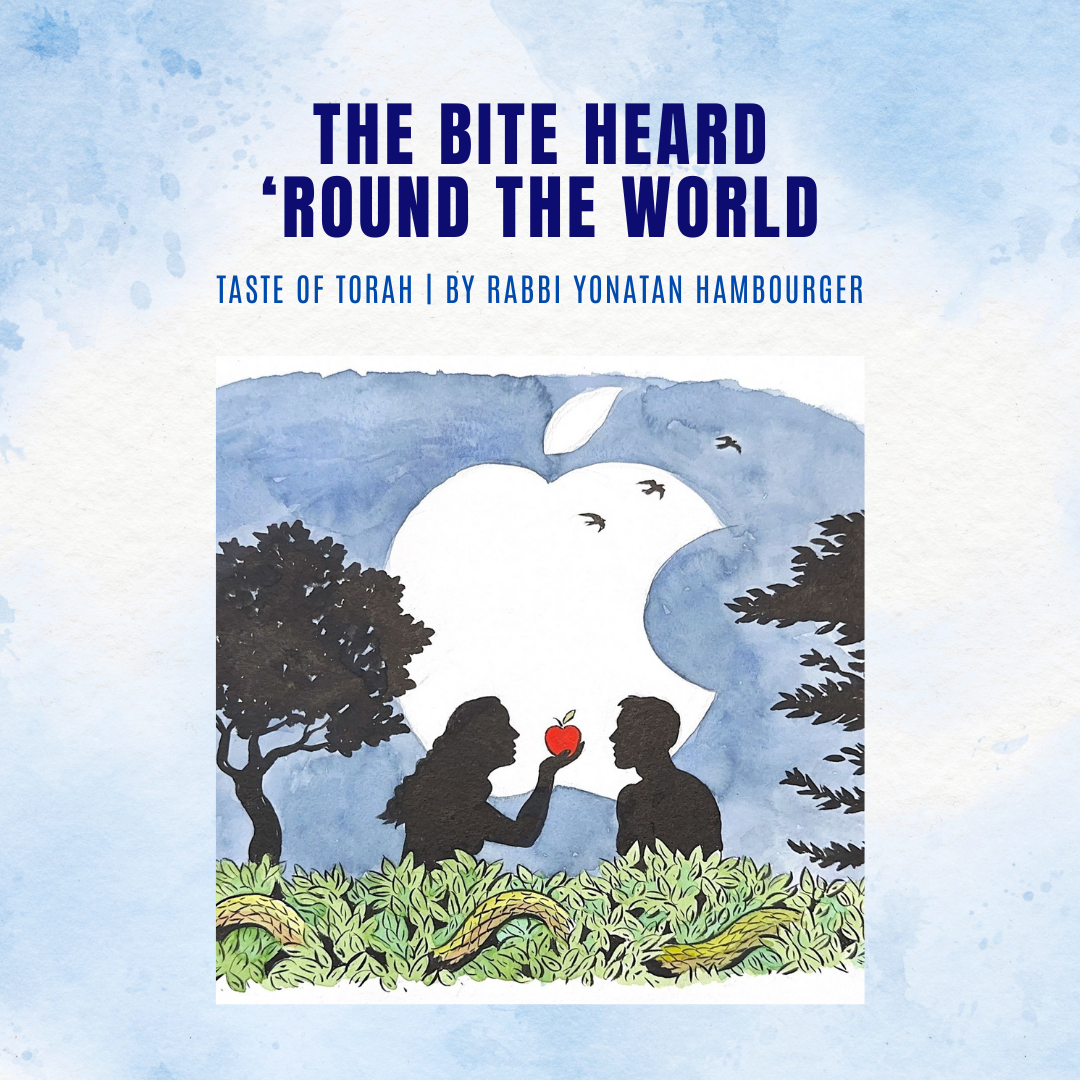
The Bite Heard ‘Round the World
This week, we start the Torah from “the beginning,” and we revisit the Garden of Eden with the bite heard ‘round the world, still reverberating through the present day.
Despite being furnished with everything they needed to live in paradise, with just one little condition not to eat the fruit from the tree of the knowledge of good and evil, Adam and Eve seemingly couldn’t resist!
But weren’t these perfect human specimens fashioned by G-d himself? Couldn’t they control their desires?
But what if they made a fully informed decision to trade paradise for toil, struggle, and certain death, not just for themselves and their family but also for all of humanity?
What if Adam and Eve didn’t want a perfect life given to them and all their descendants? What if they willingly chose a life challenged relentlessly by darkness, lust, and envy?
Maybe they knew what they were doing, and maybe they chose wisely, for people handed life on a silver platter seldom realize their full potential.
Thanks to Adam and Eve, humanity was gifted with a mission to bring heaven down to earth and transform G-d’s creation back into a garden. Yes, there are thorns and thistles, struggle, and pain, along the way but also the satisfaction of one’s own efforts on his way to accomplishing ultimate good.
Only with the coming of Moshiach (speedily in our days) when the world reverts to the perfection of the Garden of Eden, will we fully appreciate the fruits of our labor.
Most definitely a more challenging path, but also incomparably more rewarding.
Shabbat Shalom,
Rabbi Yonatan
October 15, 2024
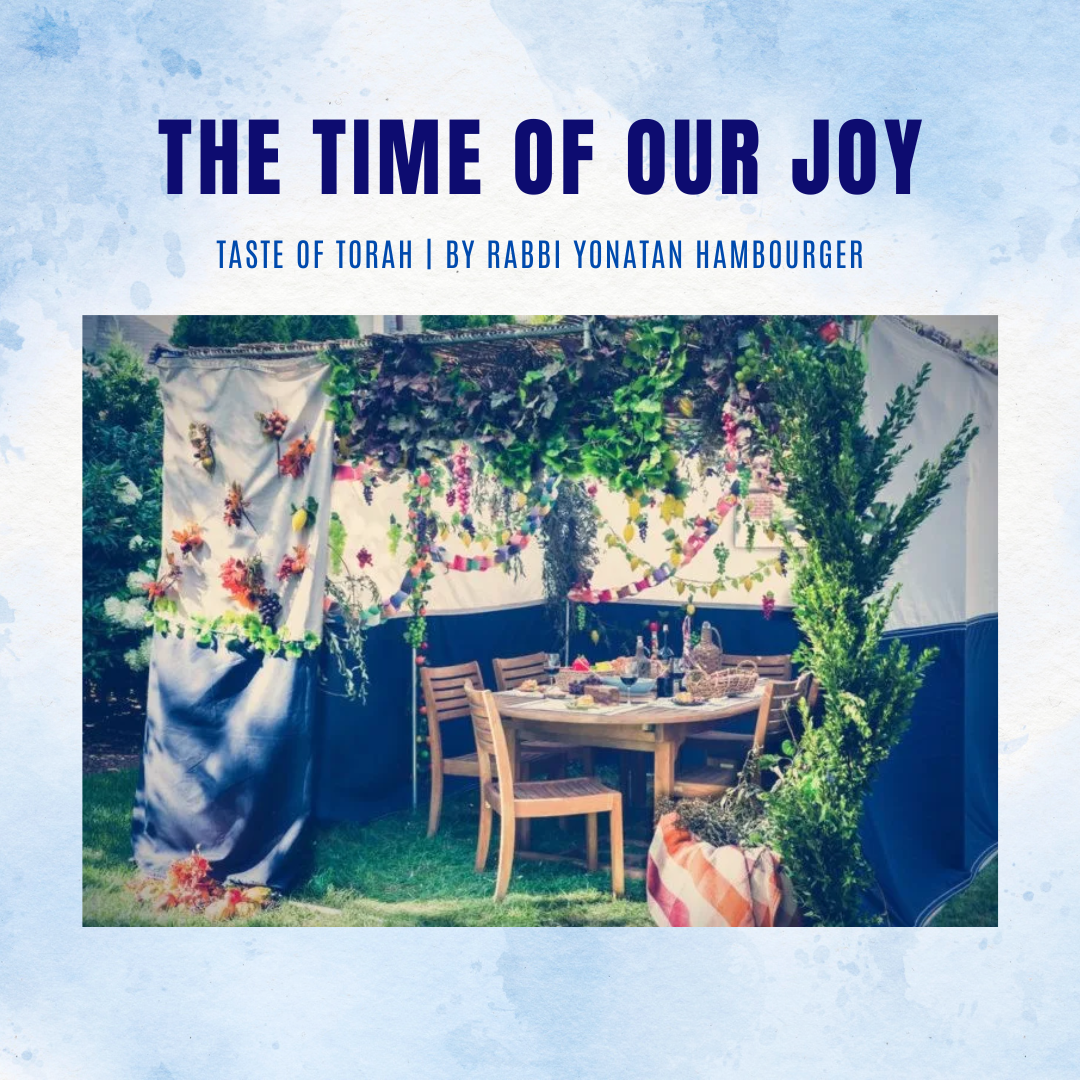
The Time of Our Joy
This coming Wednesday evening, October 16th, we begin the weeklong celebration of Sukkot, also known as the Feast of Booths. Sukkot is referred to in the Torah as “the time of our joy.”
We began this Jewish month of Tishrei on Rosh Hashanah by making good resolutions, giving extra charity, accepting G-d as our King, and pleading to be written into the Book of Life, Health, and Prosperity.
As soon as we finished with Rosh Hashanah, we entered the solemn period known as the Ten Days of Repentance, when we examined and improved our ways.
Then, last week, we experienced the holiest day of the year, Yom Kippur, when neither food nor drink passed our lips for 26 hours as we cried out and atoned by articulating our misdeeds and resolving to do better.
Immediately after breaking our fast, with one hand grasping a bagel and cream cheese, we began building a flimsy, thatched hut in our backyard, known as a Sukkah.
Every night of the week, we invite friends and strangers to our sukkahs, where we eat yummy holiday delicacies, drink plenty of wine, sing, and dance.
Why do we move so quickly from the formality and solemnity of the High Holidays to what best could be described as a Jewish Hootenanny?
More important than whatever we promised while pleading and fasting is how we are going to apply all the good resolutions we made and turn them into reality.
We seldom accomplish our goals by “white knuckling”; quite the opposite, the only way to create lasting change is through joy!
There are thirty-two Chabad Shluchim (Rabbis) throughout Georgia, and each one is waiting to welcome you to their sukkah. Please let me know if I can help facilitate a fun and spiritual experience for you and your family.
Good Yom Tov, Happy Holidays!
Rabbi Yonatan
October 10, 2024
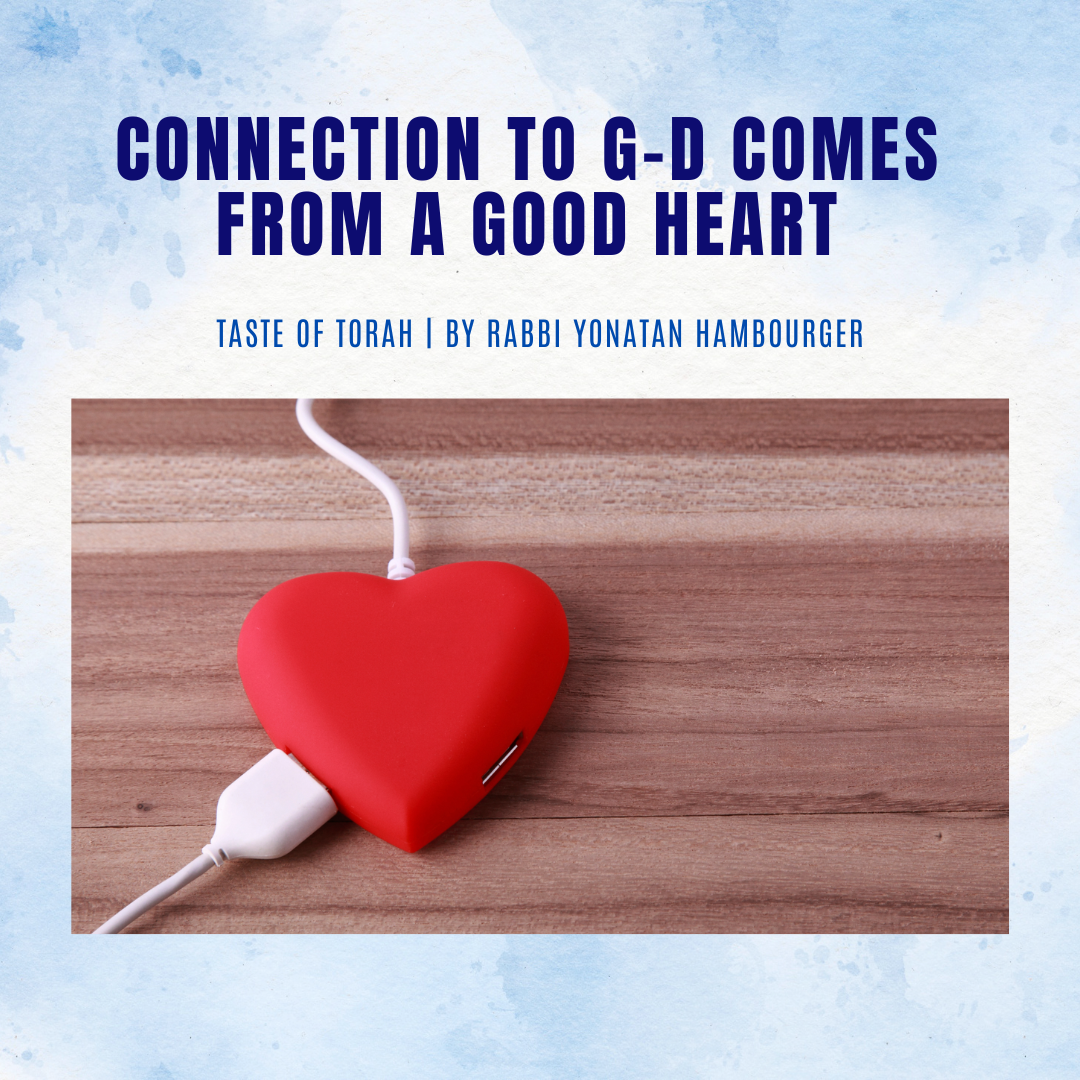
Connection to G-d Comes From a Good Heart
Friday evening, October 11th marks the onset of Yom Kippur which is known in English as the day of repentance. Neither food nor water passes our lips for 25 hours, until Saturday night.
There are several means to strengthen or re-establish our connection to our Father in Heaven. One such way is to practice the well-known dictum to love your neighbor as yourself because “anyone with whom his fellowmen are pleased, G-d is pleased with.”
To illustrate, I would like to share a well-known story: One Yom Kippur eve, the Alter Rebbe took his place in the synagogue, put on his prayer shawl, and began his preparations for the solemn opening (Kol Nidrei) prayers. Suddenly he stopped, removed his tallis, and left the synagogue.
He walked to the end of the town and entered a dilapidated cottage, where a young mother was lying with her newborn child. He chopped wood, made a fire to warm the house, and prepared her some soup. He returned to the synagogue only when he was sure she had everything she needed.
Now, there were other people in the synagogue at that time. Nevertheless, the Alter Rebbe did not instruct someone else to help the woman: he went to help her himself. And when did he do so? When he was deep in meditation before prayer, while intensely bonded with G-d. At that time, too, he was sensitive to her distress.
To “love your neighbor as yourself” is the path to connection and re-connection to G-d that comes from a good heart—wishing you an inspiring and uplifting Yom Kippur and a new year filled with an abundance of G-d’s revealed blessings in all domains of your life!
Shabbat Shalom & Good Yom Tov (Happy Holiday)!
Rabbi Yonatan
October 3, 2024
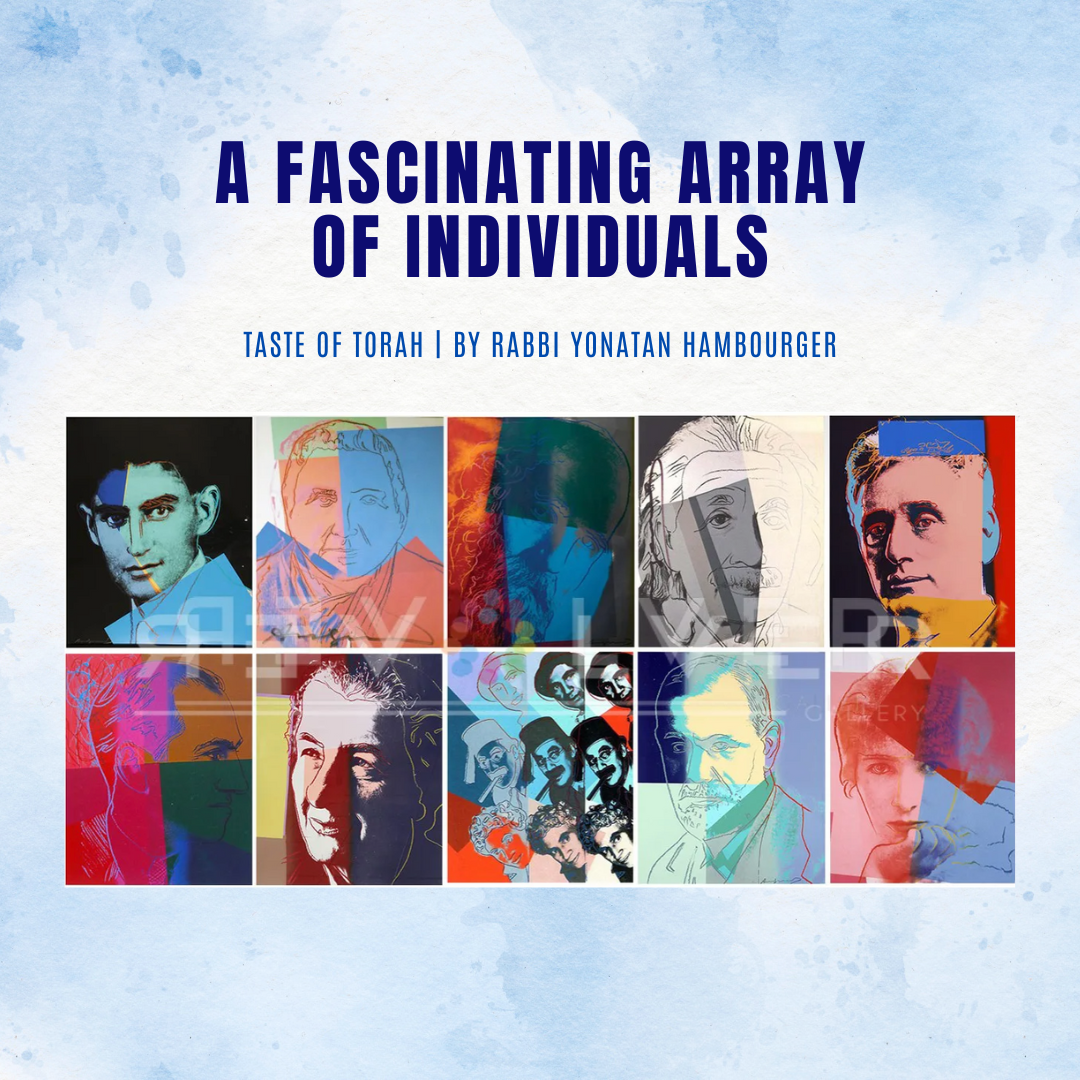
A Fascinating Array of Individuals
Going to synagogue during Rosh Hashanah, which falls on Thursday, October 3rd, and Friday, October 4th, offers a wonderful opportunity for observing the rich tapestry of humanity around us.
You'll encounter plenty of "observant" Jews, who always know the correct page in the prayer book. But the real excitement lies beyond that...
As you look around, you’re likely to meet a fascinating array of individuals: Jewish atheists, JINO’s (Jews in Name Only), Jewish Buddhists, Jews who embrace diverse pronouns, and Jews adorned with piercings and tattoos.
What binds this eclectic group together, and what do they hope to gain from the experience?
The Rebbe poignantly captured this sentiment when he shared a vivid scenario:
“Imagine a non-observant Jew who awakens on Rosh Hashanah morning, shaves, brews a cup of coffee, and tunes in to the radio only to hear the announcement, ‘Today is Rosh Hashanah.’ In a rush, he dashes out of his house, hops into his car, and speeds to the synagogue. Once inside, he finds his seat and opens his prayer book for a brief fifteen minutes. Suddenly, he realizes he’s late for a business meeting, slaps his forehead, closes the prayer book, and rushes out.”
The Rebbe concluded, “You cannot fathom the joy G-d experiences from those fifteen minutes he spent in the synagogue.”
Jews are inspired not out of fear of consequences, but rather because they sense that G-d—whom some may claim not to believe in—has unwavering faith in their potential to grow and to foster a better world!
We are all born as believers, descendants of those who received the divine revelation at Mt. Sinai. Although we may sometimes feel detached from our essence, the hearts of all remain receptive to the profound truths of the Torah.
May you be inscribed in the Book of Life for a good and sweet new year!
Rabbi Yonatan
September 26, 2024
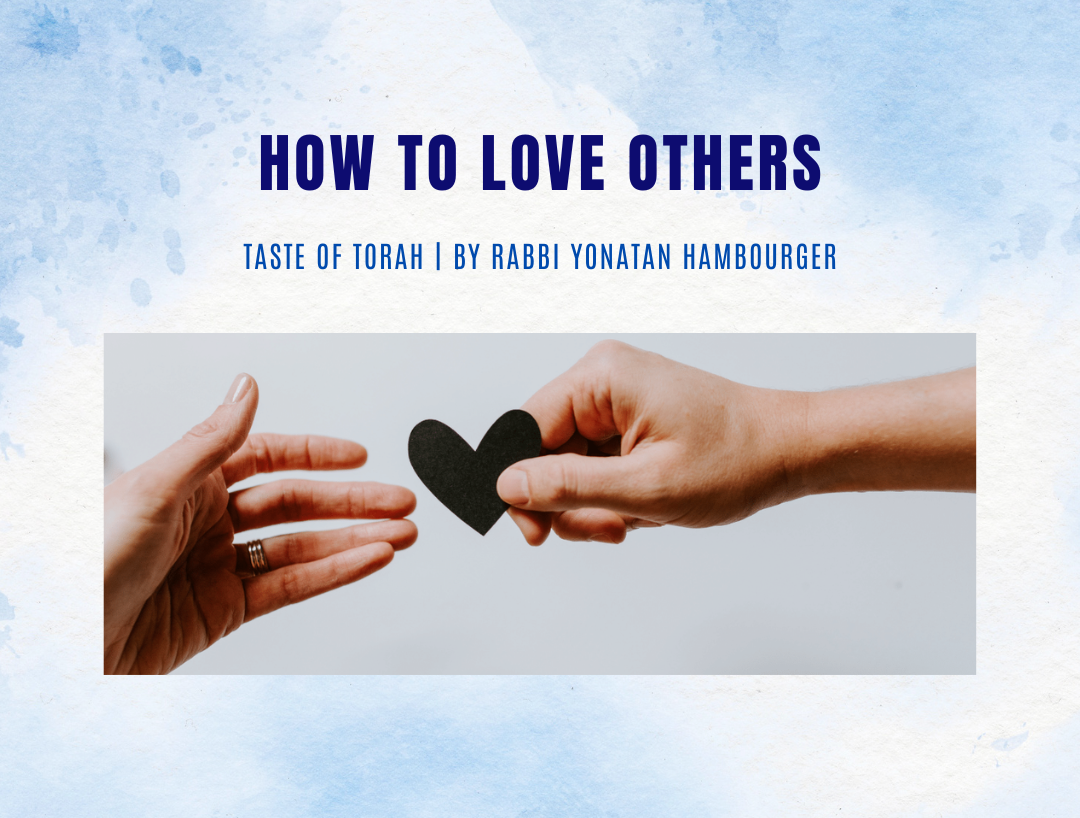
How To Love Others
Today's message is derived from this week's Torah portion, Nitzavim, found in the Book of Deuteronomy (29:9-11). In this passage, Moses addresses the Children of Israel, stating, “You are all standing today before G-d… the leaders of your tribes, your elders, your sheriffs… from your woodcutters to your water drawers.”
Essentially, Moses conveys that to receive G-d’s unconditional love, we must extend unconditional love to one another.
Reflecting on the 1969 Woodstock festival brings to mind the lyrics: “Come on people now, smile on your brother; everybody get together; try to love one another right now.” This sentiment represents a noble aspiration that has often fallen short of reality.
So how can we strive toward such an ambitious objective? It is important to recognize that some individuals may be seen as "leaders," while others may fulfill roles such as "water drawers." What common ground can exist among people with such diverse social standings?
Firstly, who determines who ranks higher in terms of achievement? We often find ourselves overestimating our own value and undervaluing others. Furthermore, even if our self-assessment is accurate, excelling in one area does not preclude others from surpassing us in different domains.
Every individual holds leadership potential in a particular area; thus, our collective success hinges on each person's unique contributions.
Moreover, the disparity between our Creator and any other being is immeasurable. Understanding our relative insignificance compared to G-d's absolute reality helps dissolve any perceived superiority we might harbor over others. After all, G-d fashioned all humanity from a single individual—Adam—thereby negating claims of superiority among people.
By taking these considerations into account, we can genuinely unite—not only through feelings of affection for one another but also through actions that reflect the authenticity of those sentiments.
Shabbat Shalom,
Rabbi Yonatan
September 19, 2024
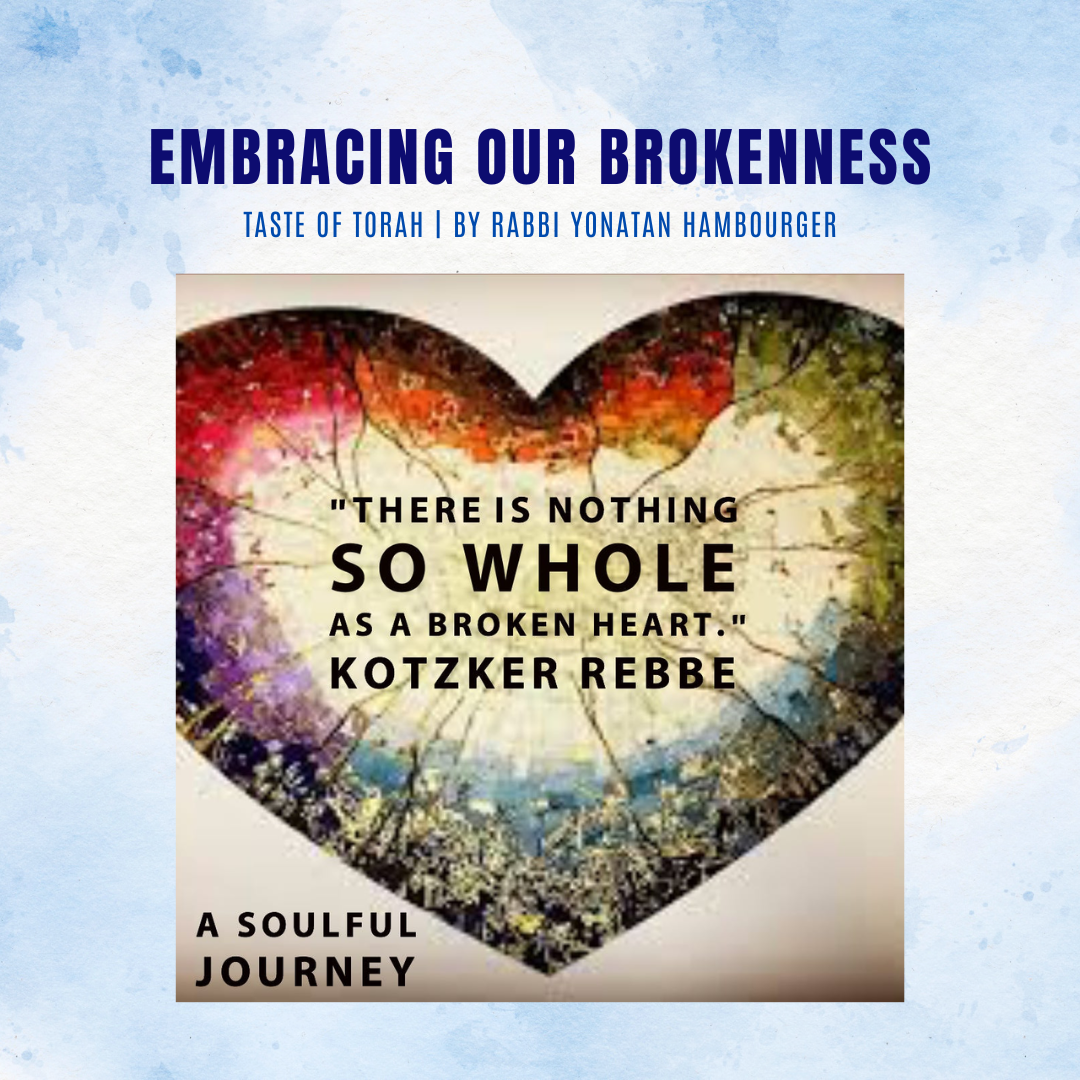
Embracing Our Brokenness
If you had the chance to transform your very essence, inviting a flow of blessings into your life, would you seize it? The time leading up to Rosh Hashanah presents this remarkable opportunity for renewal.
It was at this very time that Moses sought and secured divine forgiveness for the Children of Israel after the transgression of the Golden Calf. G-d also gave Moses a formula for generations to come, empowering them to realign with their true path and access the flow of divine goodness.
We too can harness this precious period to find compassion and forgiveness—for ourselves and others.
We begin this journey by releasing any lingering negativity. This doesn’t mean dismissing our feelings of hurt or anger; rather, it calls us to transcend these emotions by recognizing the limitations of both our own character and that of others.
In doing so, we cultivate the compassion we yearn for from G-d.
Next, we embark on a spiritual inventory that allows us to reconnect with what truly matters in life. This involves acknowledging our missteps and lost opportunities while also celebrating our positive contributions over the past year.
While it may seem simpler to focus exclusively on future goals, true progress requires us to reflect deeply on our past because in the words of the Kotzker Rebbe, “there is nothing so whole as a broken heart.”
The journey toward wholeness begins with embracing our brokenness; thus, every pain we endure serves as a hidden blessing.
May each one of us welcome an abundance of revealed blessings into our lives in this New Year and beyond!
Shabbat Shalom,
Rabbi Yonatan
September 12, 2024
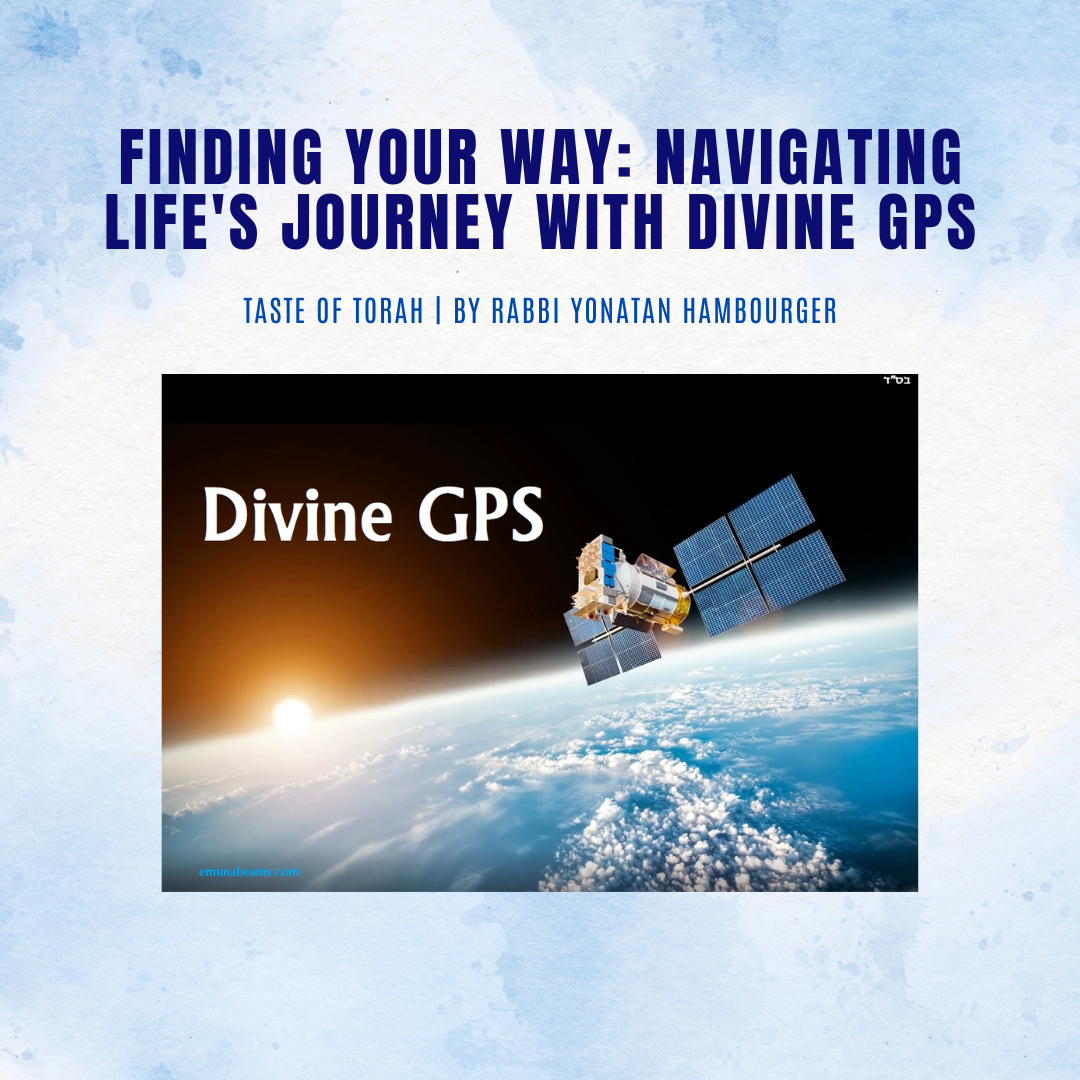
Finding Your Way: Navigating Life's Journey with Divine GPS
Have you ever experienced the unsettling feeling of driving confidently, only to realize you’re hopelessly lost? In a world before GPS technology, people would wander aimlessly, relying on the advice of strangers, often leading them astray.
Today, however, we live in an age where a simple voice command can set us back on the right path. “Rerouting,” your device chirps, offering a new direction and hope for the journey ahead.
Yet it’s fascinating how many of us only take those vital course corrections in life when we reach a breaking point. As despair mounts, we may turn to sources that don’t truly understand our needs, leaving us feeling even more stuck.
Fortunately, there’s a powerful tool available to us: what we might call “GPS for the Soul.” This divine navigation system is activated by inviting G-d into our lives to help us find our true path. But what happens when our spiritual signal is weak?
During the spiritually charged month leading up to Rosh Hashanah, our connection to G-d is stronger than ever, with little effort required on our part. All we need to do is make the “first move!”
God loves you unconditionally and is eagerly waiting for you to reciprocate that love. So let go of any doubts that may be weighing on your heart. Activate your spiritual GPS by simply reaching out. Remember, this connection is as simple as a heartfelt plea—truly voice-activated!
Now is the perfect time to strengthen this bond before the grandeur of Rosh Hashanah commences, when God returns to His celestial throne. Let us seize this moment to realign ourselves, fostering a deeper connection that will guide us through the coming year.
Embrace the journey ahead, for with every step taken in faith, we can navigate the twists and turns of life with divine assurance. Your destination awaits!
Shabbat Shalom,
Rabbi Yonatan
September 5, 2024
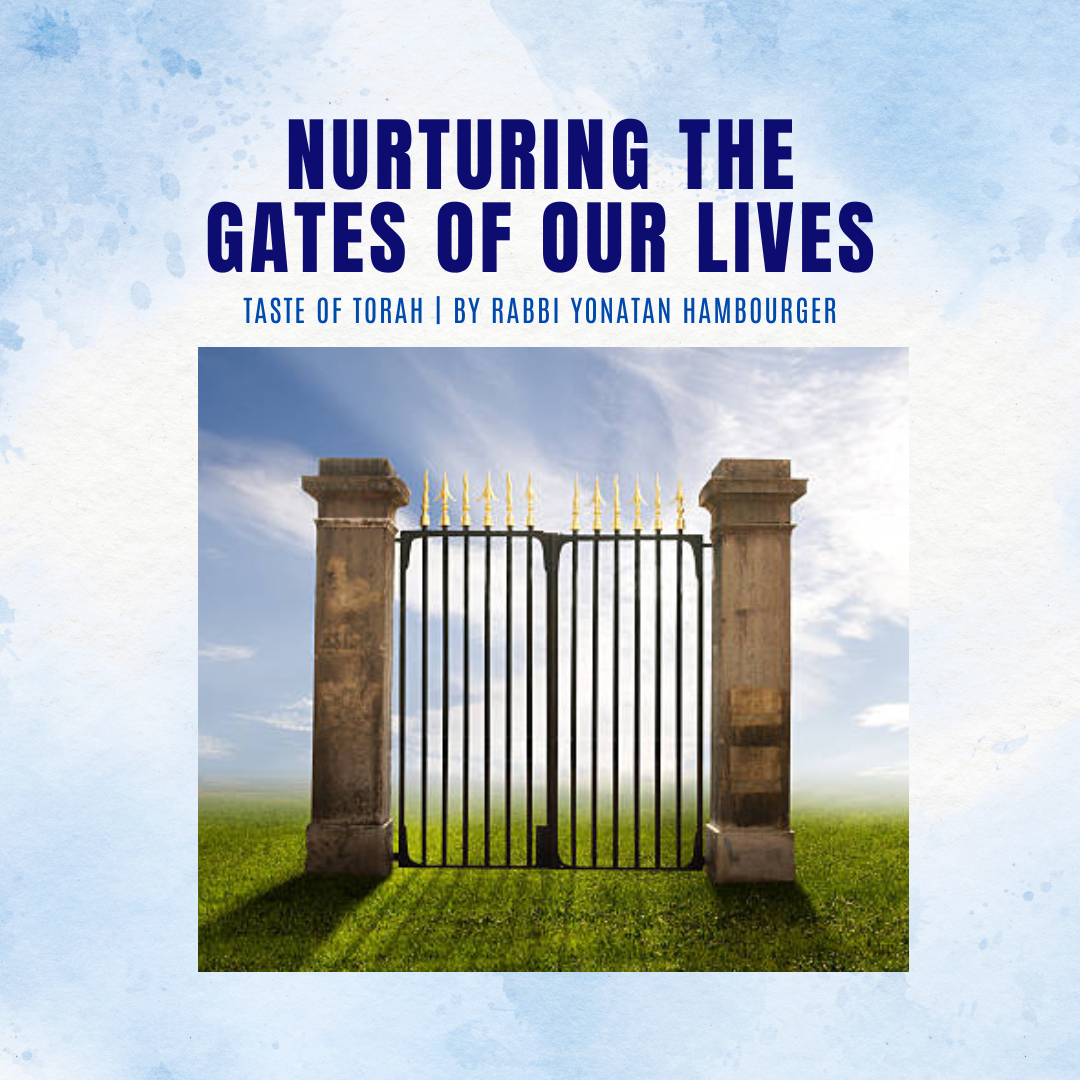
Nurturing the Gates of Our Lives
This week's Torah portion of Shoftim is from the book of Deuteronomy, Chapters 16:18 to 21:9. Therein, Moses conveys a fundamental instruction to the Children of Israel stating: “You must appoint judges and officers for yourself in all your cities.”
The Hebrew word for “cities,” she’arecha, literally translates to “gates.” These gates serve as a metaphor for our senses—our ears, eyes, nose, and mouth—acting as conduits through which we interact with the world around us. This imagery serves to remind us how these sensory experiences shape our internal lives.
This teaching underscores the importance of appointing judges and officers who will safeguard these gates from negative influences that could compromise our spiritual health. By learning scripture and consulting with our spiritual advisors, we become adept at distinguishing between influences that enrich our souls and those that pose a threat to our true selves.
The role of the officer is to execute the decisions made by the judge. Analogously, our internal officers symbolize the coping strategies we develop to counteract the temptations and distractions that challenge the wisdom of our inner judges.
The Prophet Isiah tells us that in the Messianic future, G-d promises to "restore your judges as in former times." Notably absent from this promise is the mention of restoring officers, because in that future time, negativity will lose its power over us. Thus, we will not require protective measures to align ourselves with G-d’s intentions. May this occur speedily, in our days.
By nurturing our spiritual gates and developing our internal judges and officers, we can aspire toward a future of justice, peace, and divine connection.
Shabbat Shalom,
Rabbi Yonatan
August 29, 2024
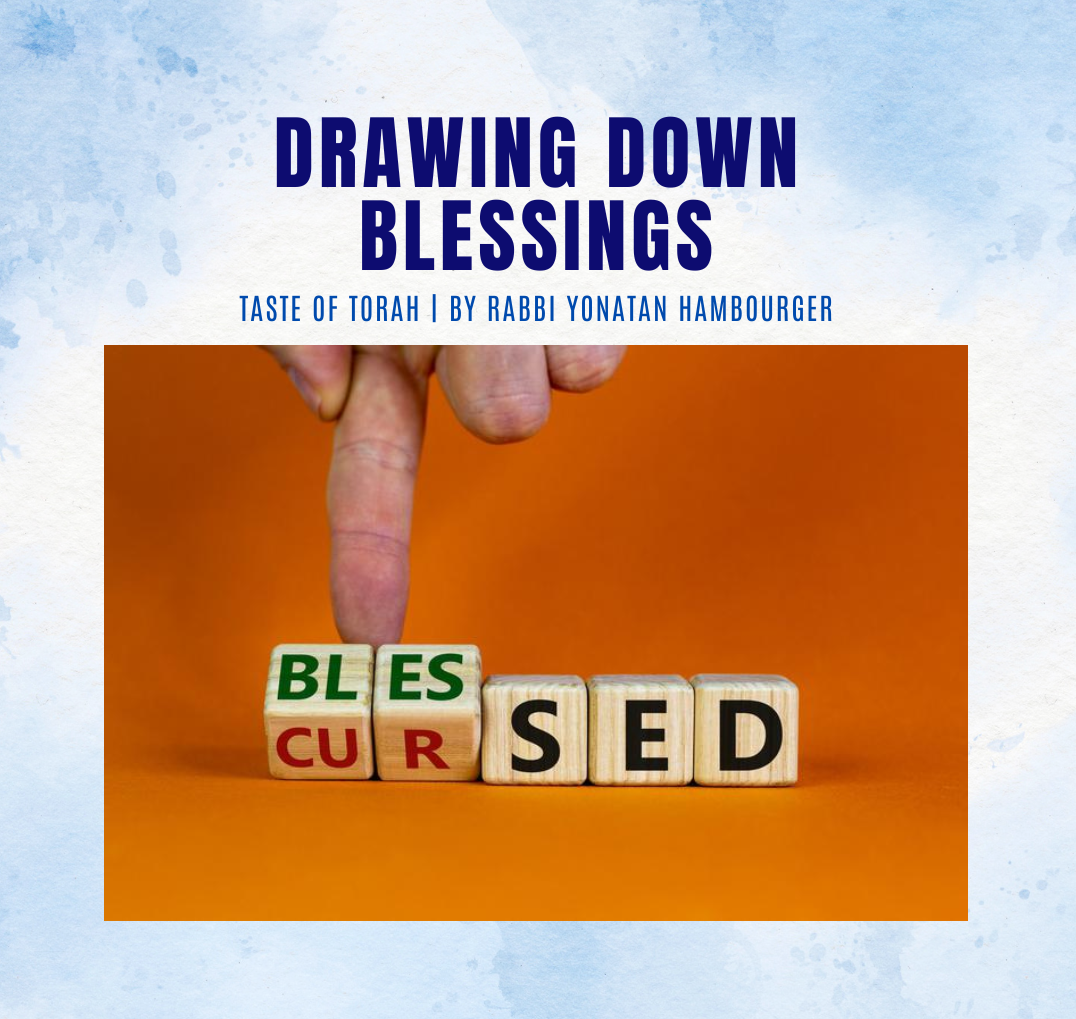
Drawing Down Blessings
In this week’s Torah portion of Re’eh, Moses inspires the Children of Israel to recognize the profound gift of choice bestowed upon them by G-d, which allows them to choose between good and evil. This pivotal decision leads either to a life enriched with blessings or one shadowed by curses.
G-d embodies goodness and desires nothing but the best for all His creations, equipping us with everything necessary to fulfill our purpose in this world. He wants us to use His gifts of vibrant health, joyful families, and financial abundance, inviting us to partner with Him in a divine mission.
Yet, despite these divine gifts intended for us, obstacles may arise that hinder their arrival. It is not that G-d holds back; rather, our own actions can obstruct the flow of blessings from potentiality into reality. In such moments, we find ourselves in need of a “blessing,” to open a channel to receive His goodness in an open and revealed way.
A blessing does not bring something new into existence; instead, it clears away barriers so we can embrace what G-d has always envisioned for us. When G-d proclaims in Deuteronomy 11:26, “Behold, I set before you today a blessing and a curse,” He empowers us to realize that our choices dictate how much of His stored blessings will manifest in our lives.
And it gets better still! As we align ourselves more closely with our divine purpose, G-d generously amplifies the resources available to help us achieve our aspirations. Not only do we gain access to the treasures He has set aside for us, but we also have the opportunity to expand the abundance flowing into our lives.
Shabbat Shalom,
Rabbi Yonatan
August 22, 2024

The Battlefield
The children of Israel lived an idyllic life in the desert for 40 years with their every comfort provided for in miraculous fashion. And, with Moses at the helm, they handily beat all their enemies.
But in this week’s Torah portion of Eikev, The Israelites are poised at the border of Israel as fear and dread set-in.
For the people understood that Moses would not accompany them into the Promised Land, to manipulate nature, nor was G-d going to perform any Hollywood style miracles. They would seemingly have to confront the enemy all by themselves, on an even playing field.
Therefore, Moses prepares the Israelites in Deuteronomy 7:17-21, “will you say to yourself that these nations are more numerous than us; how will we be able to drive them out? You shall not fear them…for the L-rd your G-d is in your midst and is great and awesome.”
Moses didn’t deny that the enemy was vastly superior. Rather he reassured the people that G-d would insure their victory. They only needed to do their part on the battlefield, and G-d would arrange a favorable outcome.
So too, we each face intrapersonal and interpersonal battles which seem unconquerable. Whether overwhelmed by life’s troubles, or enslaved by our own impulses, we’d be foolish to underestimate their significance.
It might be true that we do not have the ability to succeed based only on our own power. So, here Moses reminds us that we are not alone on life’s battlefield, when he says in Deuteronomy 7:22, “The L-rd, your G-d, will drive out those nations from before you, little by little.”
It’s true that the process can be slow, but with consistent effort and determination, we can vanquish our “enemies.” Gd wants us to put forth the effort, but when we do so, He personally guarantees our victory.
Shabbat shalom,
Rabbi Yonatan
August 15, 2024

Sometimes a Step Backwards Becomes a Giant Leap Forward
A foundational belief in Judaism asserts that every descent is for the sake of an even greater ascent. Since the Almighty wants only good for us, a setback becomes a springboard for greater achievement.
We are now learning the final book of the Five Books of Moses. Whereas the first four books are spoken by G-d, the book of Deuteronomy is written in Moses’s voice, wherein he retells the story of the ancient Israelites and their journey from Egypt.
The children of Israel were concerned about the challenges that awaited them in the Holy Land where they would have to deal with preparing meals, earning a living, and the like. Afterall, in the desert, G-d provided all their needs, while they remained immersed in spirituality exclusively.
It looked like a descent. Yet, Moses reassured them that although it would be a departure from the comforts and G-dly revelation they enjoyed in the desert, it was specifically through embracing physicality, that they could connect the mundane with the divine.That Moses speaks rather than G-d, also seems like a descent. But it signifies that we must internalize the word of G-d, making it our own. He wants our connection to be relevant, and for us to embrace even His loftiest concepts, but in a natural and recognizable way.
Remember, if confronted with what appears to be a descent, it is actually a gift from G-d to lead you to a higher place.
G-d wants that you and I should use the materiality in our lives to create a world so holy, that He will dwell amongst us. We do this by acting kindly to everyone, regardless of differences. Let us bridge the current cultural and political divide one genuine smile at a time.
Shabbat Shalom,
Rabbi Yonatan
August 8, 2024
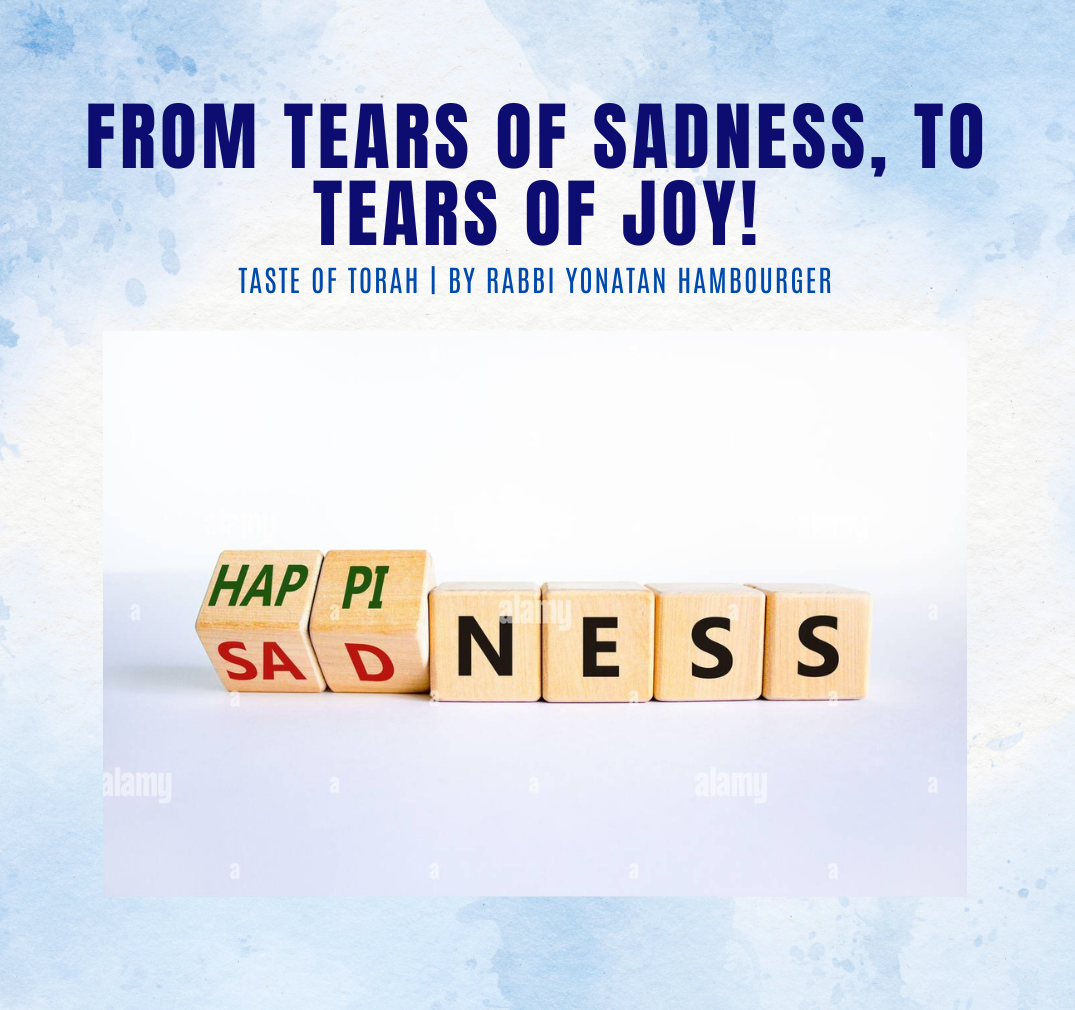
From Tears of Sadness, To Tears of Joy!
The Code of Jewish Law instructs the Jewish people to decrease in joy during their nine-day period of national mourning, leading up to the saddest day of the year, known as Tisha B’av.
The first of the Nine Days of mourning began last Monday, August 5th, and culminates on “Tisha b’Av,” marked by 25 hours without food or water beginning next Monday evening, August 12th.
Tisha b’Av memorializes many historical tragedies that befell the Jewish people on this date, including the destruction of both the First and Second Holy Temples, in 586 B.C.E. and 70 C.E. respectively.
In addition to fasting on Tisha b’Av, it is custom to sit on the floor in the synagogue with the lights dimmed low, reciting the book of Lamentations, while tears and cries of anguish flow without inhibition.
A story is told that on the night of Tisha b’Av, Napoleon Bonaparte was strolling in his capital city of Paris. Low and behold he heard crying and sobbing coming out of a dimly lit synagogue.
When told that the Jews were mourning the loss of their Holy Temple, Napoleon was so moved that he offered to personally provide the funds to rebuild their Temple.
When the Emperor learned that the Holy Temple was in Jerusalem, and was destroyed over 1,700 years ago, he replied:
“If indeed this people is mourning their Temple after almost two millennia, such a people so attached to their history, will indeed be restored to their land and their Temple rebuilt.”
May the third and final Holy Temple in Jerusalem be speedily rebuilt and usher in an era of peace and plenty where humanity will be solely focused on learning and practicing the ways of G-d.
Wishing you a Shabbat Shalom,
Rabbi Yonatan
August 1, 2024
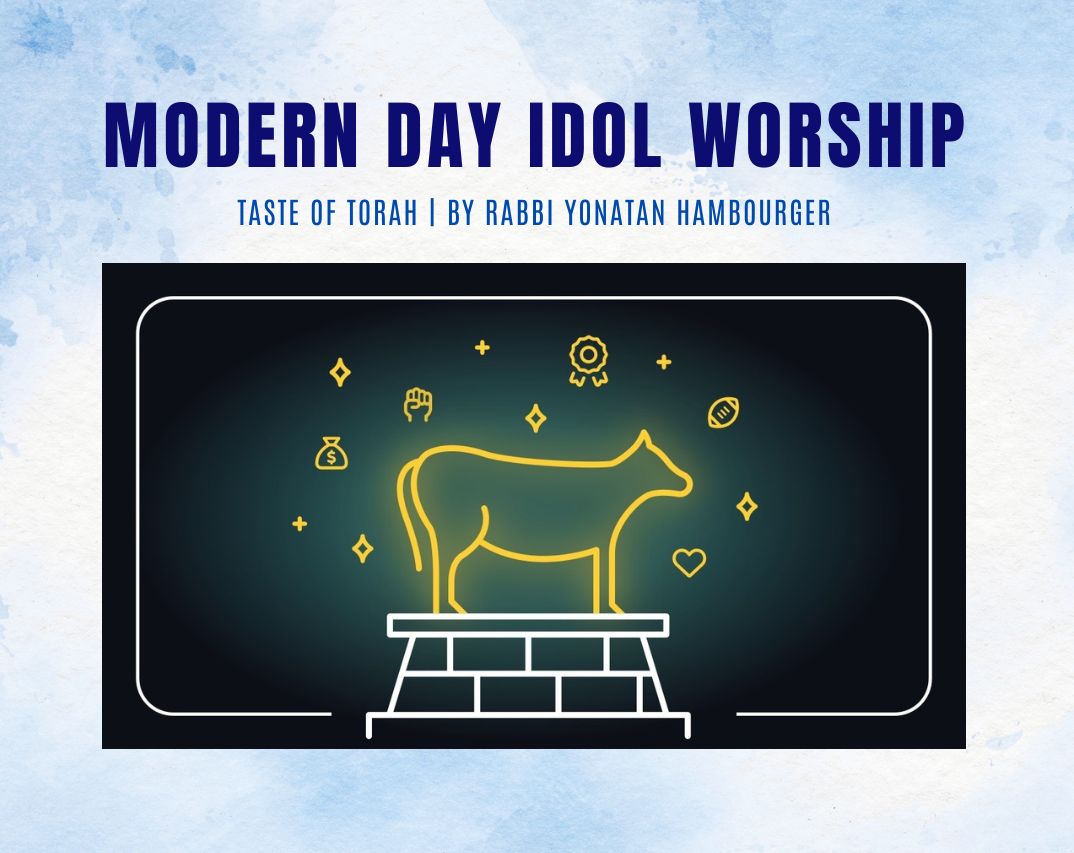
Modern Day Idol Worship
In this week’s Torah portion, upon entering our Promised Land G-d instructs Moses to tell the Children of Israel to destroy all remnants of idol worship, even the most subtle forms left by the previous inhabitants.
The word for idolatry in Hebrew can be translated as “foreign servitude.” I am not aware of many people today bowing down to graven images, but many do indeed serve foreign gods in their insatiable quest for money, success, beauty, control, and fame.
The Torah teaches us that all our choices in life fit into three broad categories: the holy, the forbidden, and the permissible.
Though not necessarily easy, the holy as well as the forbidden are relatively simple, notwithstanding all the “thou shall’s”, and “though shall nots.”
But our mission is to take what’s permissible (the third category), and turn that into something holy. For example, what about a steak dinner?
How do you turn a grilled ribeye (kosher ribeye if you’re Jewish) into something holy? You thank G-d before and after you partake, and then use your added vitality to engage in even more acts of goodness and kindness.
Our goal is to develop the simple awareness that everything comes from G-d!
When we learn to orient even our most mundane, permitted activities towards holiness, we live free of the inner conflicts that take their toll on the physical, mental, emotional, and spiritual health of so many people.
Our job is to become spiritual samurai and smash our inner idols. What awaits us is the Promised Land of joy and peace that comes from G-d oriented living!
Wishing you a Holy Shabbos,
Rabbi Yonatan
July 25, 2024
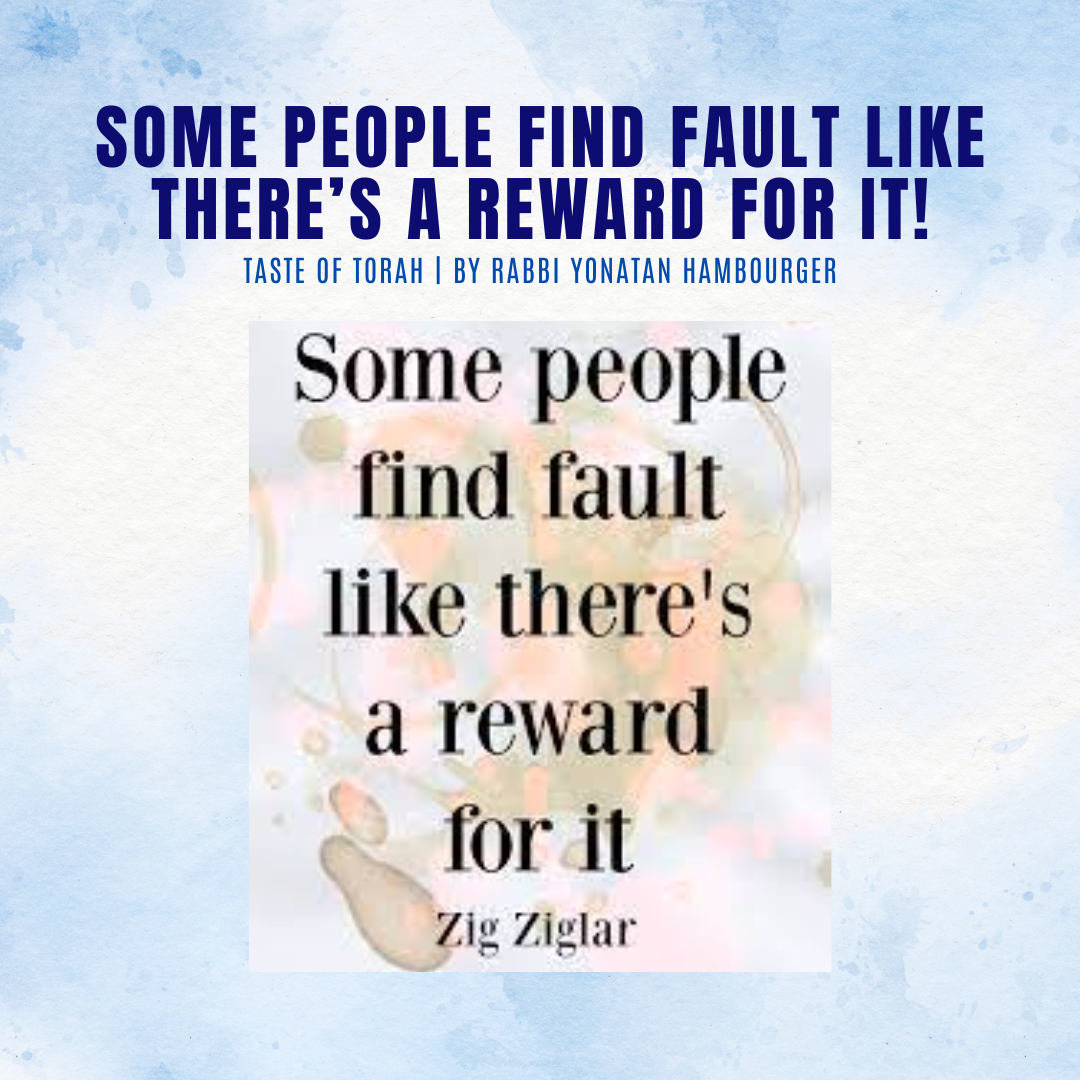
Some People Find Fault Like There’s a Reward For It!
Many years ago, there was this guy I used to see every day in the synagogue. He had his issues, like all of us and we all got along fine.
Then one day he decided to actually apply the things we were learning in the Torah to try to become a better person. That made the rest of us quite uncomfortable.
We would watch in astonishment as he remained calm in situations that used to illicit rage. And he stopped gossiping about people we used to love to talk about!
We waited impatiently for him to slip up and show his “real” self. Thankfully, that day never came which was a very strong lesson for his “friends.”
Why do people look for faults in other peoples’ good acts and motives?
In this week’s Torah portion, we meet Pinchas, an “average” person who took a bold action and averted a national calamity while the Elders and Moses were passive. Yet many of those he saved claimed Pinchas had ulterior motives.
So long as a person is doing good, he should not be criticized. Even if he has egotistical motives, doing good even for the wrong reason will eventually lead him to have purer motives.
But where does the desire come from to find fault in people who are doing something good?
Criticizing another’s accomplishments is probably due to the critic himself being egotistical and lazy. He can’t stand the thought that someone accomplished something that he did not.
In fact, the critic is annoyed because he can’t admit that he is also an egotist. So, he feigns righteous indignation.
It is much better to be a doer than a critic. A good deed always remains good, regardless of the intention.
Wishing you a peaceful and fun Shabbos,
Rabbi Yonatan
July 18, 2024
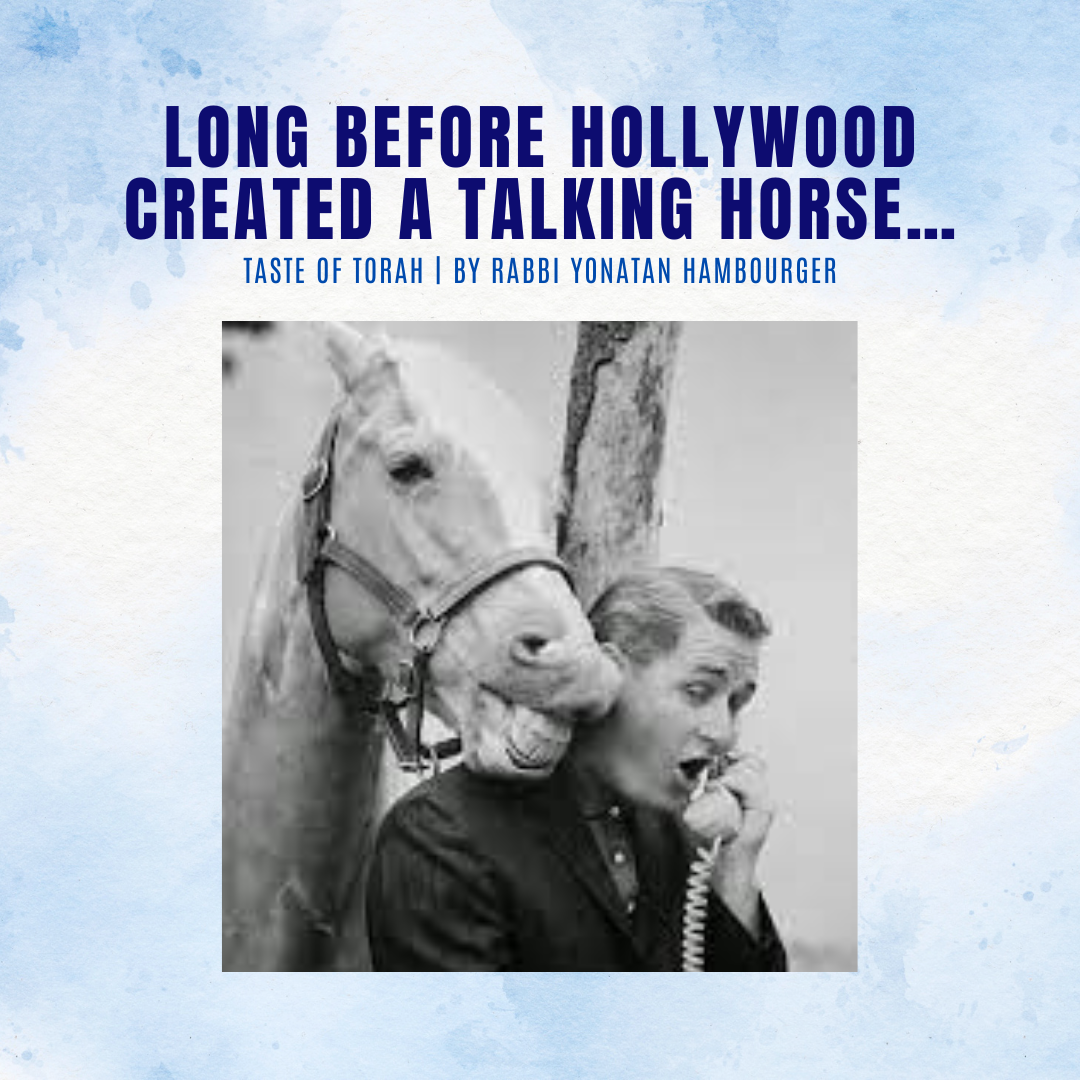
Long Before Hollywood Created a Talking Horse…
Long before Mr. Ed the talking horse and Frances the talking Mule, lived Balaam’s talking donkey. This donkey was smarter than his master because he had the good sense not to mess with the Jews.
His master, Balaam, was a sorcerer extraordinaire, and the personification of evil. He was paid big bucks by the king of the Moabite nation to curse the children of Israel.
Try as he might though, each time Balaam attempted to utter a curse against the Jews, it was vocalized as a blessing. I won’t use space herein to describe his undoing, but suffice to say, when’s the last time you met a Moabite?
Over the centuries the Jews have been accused of killing G-d, spreading the bubonic plague, and controlling the governments of sovereign nations.
First, they told the Jews to get out of their countries, and now they tell them to get out of Israel.
They wish the Nazis succeeded, yet they deny that the Holocaust ever happened.
We have a responsibility to educate the ignorant and confront antisemites. Various Jewish and Christian organizations have been doing this for decades. Yet the voices of the antisemites are getting stronger.
The antidote is for Jews today to live with pride and confidence, and influence everyone with courage, positivity, and encouragement. In the words of the late Rabbi Lord Jonathan Sacks: “non-Jews respect Jews who respect themselves!”
If you’re Jewish, take on a new mitzvah. If you’re Christian, take on a new act of kindness. If you’re not religious, do it anyway, to spite the anti-Semites!
It is this attitude that contributes to the secret of Jewish eternity.
A new era of peace and prosperity will soon be here, and the occupation of all humanity will be to know G-d and walk in his ways.
Shabbat Shalom U’Mevorach (have a peaceful and blessed Sabbath),
Rabbi Yonatan
July 11, 2024
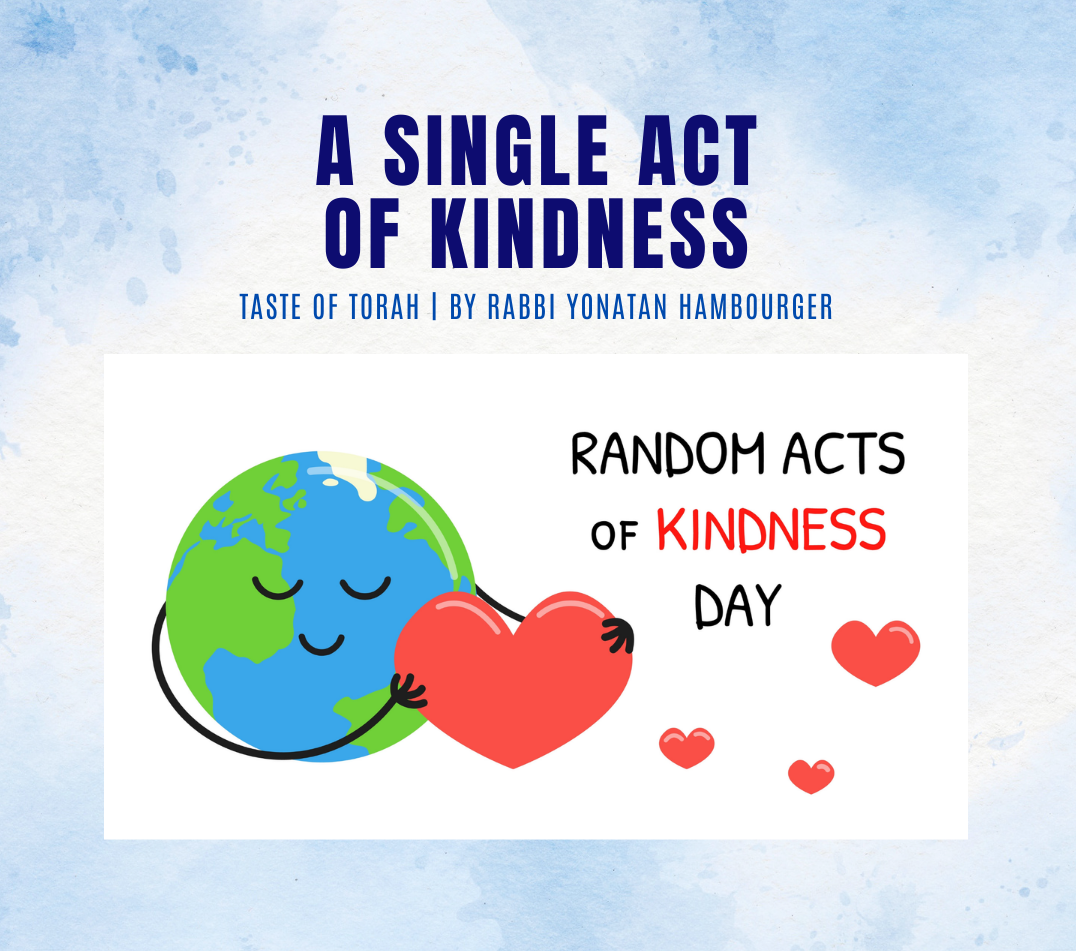
A Single Act of Kindness
Moses, the greatest leader in the history of the Jewish people had a long and illustrious record of defeating superior enemies who wished to annihilate the Jewish people. Taking his marching orders directly from G-d Almighty, Moses knew no fear.
In this week’s Torah portion alone, Moses leads the Children of Israel in battle and defeats three formidable enemies, without flinching.
But when it came to the final enemy in this week’s portion, we read that G-d had to reassure Moses and tell him, "Do not fear him.” But what engendered such fear in Moses?
Og, the king of Bashan who Moses was poised to engage in battle, had a long history with the Jewish people. Many generations prior, Og tipped off Moses’ ancestor Abraham, that Abraham’s nephew at been kidnapped.
Moses sprang into action, defeated the captors, and freed his nephew. Lest you think that Og was a nice guy, his motive was to get Abraham killed in battle so that Og could abscond with Sarah, Abraham’s wife.
Although Og’s reasons were less than noble, the end result of his deed was good, and Abraham considered it a favor.
That’s why Moses was afraid that Og’s spiritual credits might protect him. And that is why the Almighty needed to put Moses’ mind at ease.
That one good turn, performed so many years back and out of an ignoble motivation, could cause Moses so much anxiety is proof positive of the awesome and long-term positive effects of a single act of kindness.
Acts of kindness have the power to protect us from harm. Let this story inspire us to be a little kinder and more compassionate to those around us. And may our kindness protect us and our families from any harm.
Shabbat Shalom,
Rabbi Yonatan
July 4, 2023
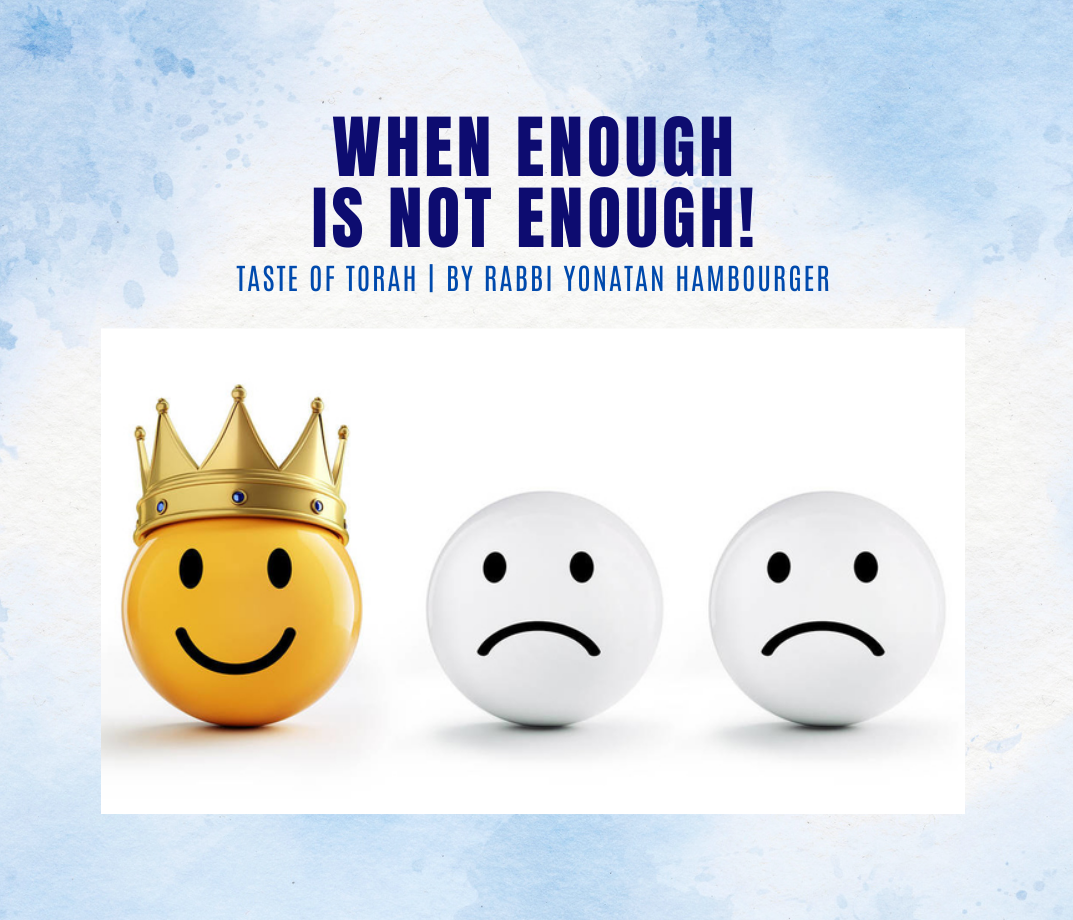
When Enough Is Not Enough!
We meet a fascinating, albeit tragic figure in this week’s Torah portion, named Korach.
Korach had it all; prestige, fortune, & fame. Only a handful of people had more and that’s exactly what Korach obsessed about.
Because he could not control his envy, lust, and desire for honor, he instigated a rebellion amongst Moses.
In Biblical fashion no less, the earth opened beneath his feet and swallowed him alive, along with his co-conspirators, putting an end to the entire affair.
We are all born with a propensity towards envy, lust, and a desire for honor. Left unchecked, it never ends well.
The Midrash Shmuel relates that a king had summoned both an envious person and a hedonist to his court:
The king said: “The 1st person to ask for something will receive it. And the other will receive double!” Both remained silent.
The hedonist wouldn’t speak first because he wanted the double portion.
The envious person wouldn’t speak first because he couldn’t stand the thought that the hedonist would receive twice his portion!
Finally, the envious person spoke: “I would like the king to poke out one of my eyes.”
Channeled properly however, these personality challenges can actually help refine us:
Envy can be used to emulate those who are more spiritually refined than us; one can learn to lust for closeness to the Divine, and one can experience honor by honoring others.
To paraphrase the Rebbe: if we are preoccupied with our personal status, we are likely to be unhappy, for our sense of worth is based on prestige, fortune, and fame.
Happiness, however, can be found — by transcending self-concern, and investing our personal resources in a purpose of greater scope than ourselves.
Wishing you contentment with your lot in life, this Shabbat & always!
Rabbi Yonatan
June 27, 2024
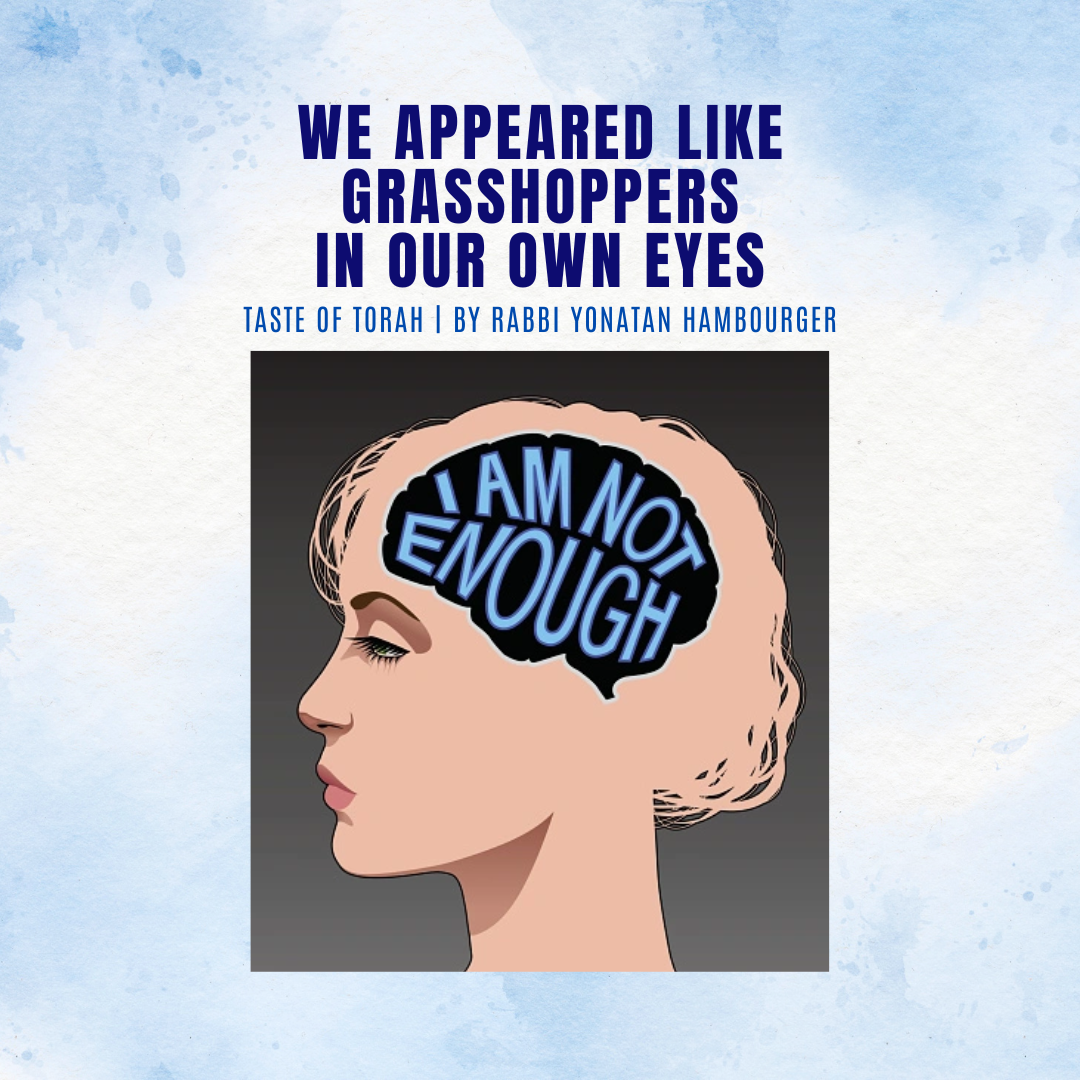
We Appeared Like Grasshoppers in Our Own Eyes
The Children of Israel had just received the Torah at Mt Sinai from G-d himself.
Poised at the border of the Promised Land, they were assured that The Almighty would fight their battles and deliver their enemies into their hands.
Then, on their own initiative they decided to send scouts into the Land of Israel.
They came back with a negative report that the land could not be conquered.
How pray tell, could a people under the direct Divine protection of the Master of the Universe lose their nerve?
Scripture states: “We are unable to go up against the people, for they are stronger than us…we appeared like grasshoppers in our eyes, and that’s how we were in their eyes.”
That’s right! They suffered from a collective case of low self-esteem.
As a result, G-d told the people that He would extend their desert itinerary for an additional 39 years so the next generation would be rid of the “slave mentality” that plagued their parents, and be ready to inherit the Promised Land.
With the news that their entry was denied, they had a change of heart and pleaded with G-d to let them enter the Promised Land. But the moment had passed. It was too late!
What caused the people to have such a dramatic change of heart?
A few moments earlier they were petrified. Now they were ready to march into the land of Israel singing The Theme from Rocky!
Initially their faith was overshadowed by fear. But as soon as they realized the consequences of their behavior, their inherent faith was awakened!
We all experience doubts and fears from time-to-time. The way to overcome them is simply to reawaken the pure childlike faith that lies dormant within us!
Be strong and of good courage!
Shabbat Shalom,
Rabbi Yonatan
June 20, 2024
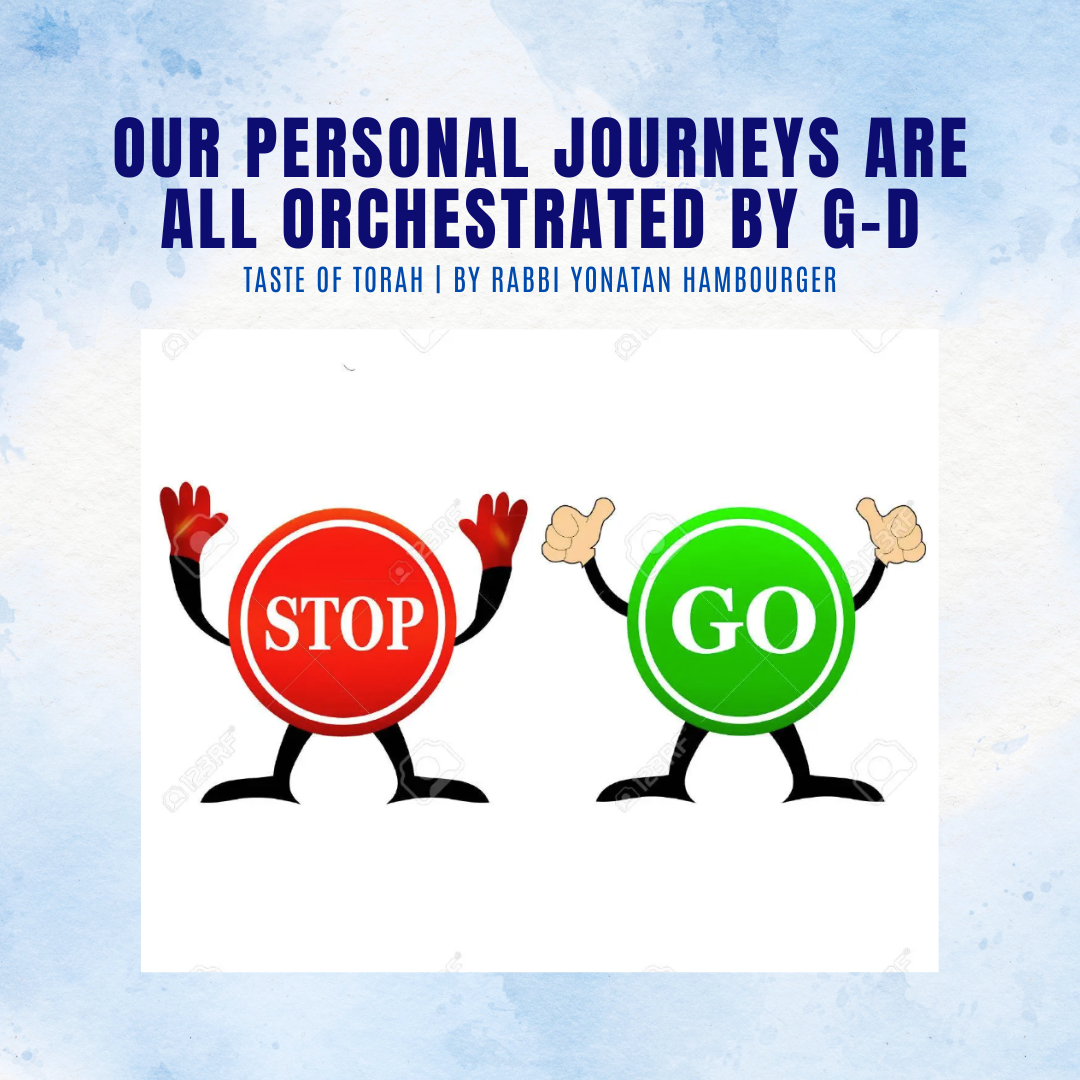
Our Personal Journeys Are All Orchestrated By G-d
We feel good when we are making progress towards our life’s goals. Conversely, we feel frustrated when we get stuck!
How must the Children of Israel have felt, wondering around Sinai for 40 years with one overarching goal…to enter the Promised Land!
This week’s Torah portion describes how G-d’s Cloud of Glory led the Children of Israel through the desert:
“…and according to the cloud's departure from over the Tent (Tabernacle)…the children of Israel would travel, and in the place where the cloud settled, there the children of Israel would encamp.”
There were 42 stops on their way to the Promised Land. The shortest encampment was overnight, and the longest was 19 years. Somehow, their willingness to stop and make camp was equal to their desire to move on, which seemingly defies human nature.
You see, they were able to recognize that G-d always acted in their best interest, even when they felt impatient and stuck in place.
Our personal journeys as well, are orchestrated by G-d who “directs the footsteps of man.”
True, we have free choice and therefore it’s fully appropriate to set out to achieve our goals. Still, we must recognize that only G-d sees the big picture, and only G-d knows what’s in our best interest.
So next time you feel stuck because the check-out line is long, or traffic isn’t moving, remember that this is also in your best interest. Embrace it, and ask yourself “what does G-d want from me in this moment?”
Wishing you tons of Blessings in all areas of your life, this Shabbat & always,
Rabbi Yonatan
June 13, 2024
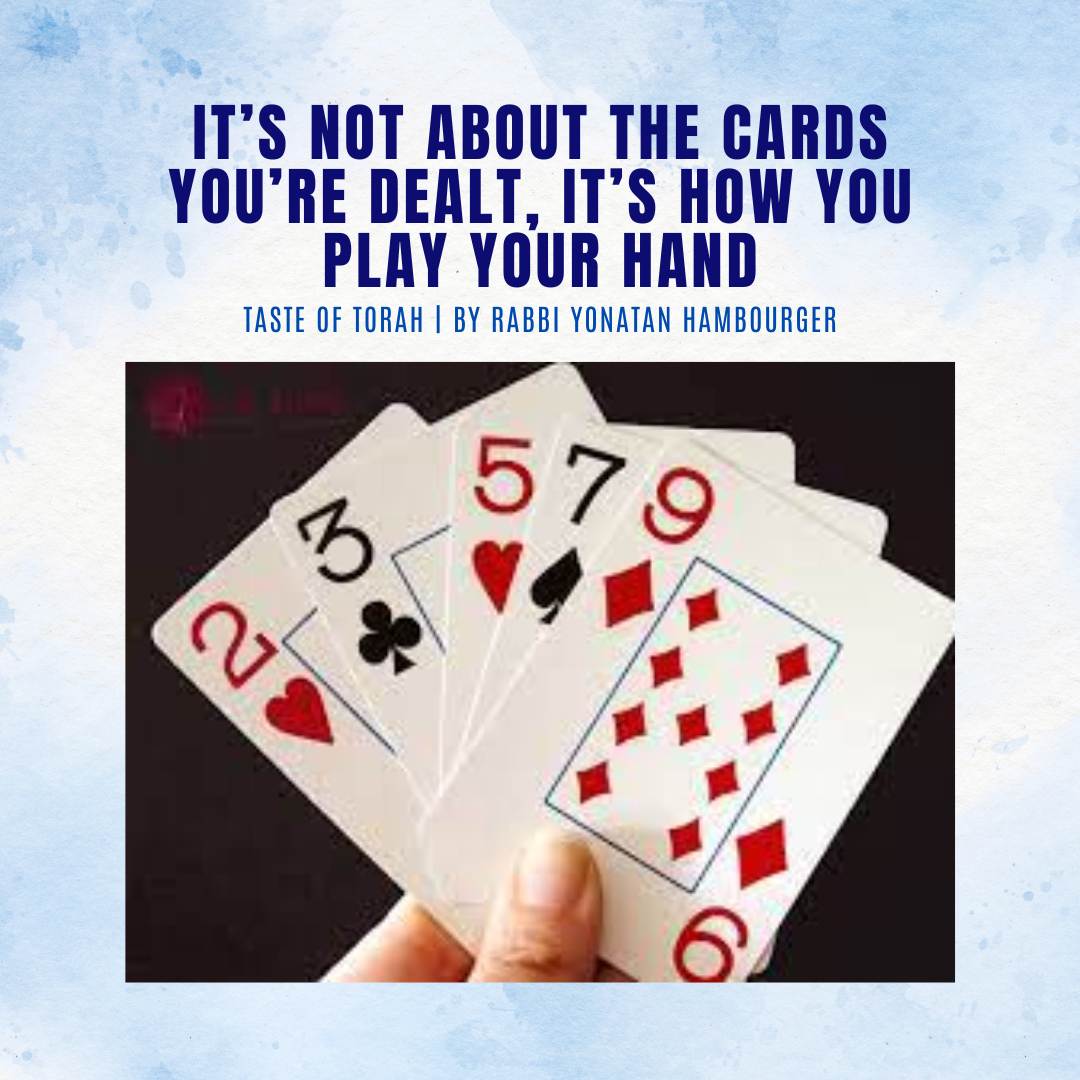
It’s Not About the Cards You’re Dealt, It’s How You Play Your Hand
Have you ever wished that you were taller, wealthier, skinnier, more attractive? Have you ever thought that if you were, you would be further ahead in life?
The truth is that G-d has given each of us the specific resources in potential that we need to fulfill our specific mission in life.
This week’s Torah portion is a lesson in how to maximize our own potential, & not focus on what we think we think we are lacking.
When the traveling sanctuary (Tabernacle, or “Mishkan” in Hebrew) was built in the desert by Moses and the Children of Israel, the articles were mostly made of gold and precious stones. No expense was spared!
Yet oddly, the Leaders of the 12 Tribes donated only six wagons to transport the contents of the Tabernacle, only one wagon from each two Leaders.
The Talmud analyzes the exact dimensions of all the Tabernacle’s contents and determines that each of the six wagons was filled to capacity without room for even an extra matchstick.
Wouldn’t it have made more sense to have some extra wagons, so things didn’t have to be loaded and unloaded with such painstaking precision?
The Torah is telling us that everything exists in the world for a purpose. If six wagons were sufficient, then any extra ones would be superfluous.
G-d created each of us with a purpose. Are we fulfilling that purpose? By fully utilizing everything G-d endowed us with, we fulfill the divine plan, living our best lives possible.
In closing, this Torah portion also includes the Priestly Blessing:
“The Lord bless you and keep you; the Lord make his face shine on you and be gracious to you; the Lord turn his face toward you and give you peace.”
Good Shabbos,
Rabbi Yonatan
June 6, 2024
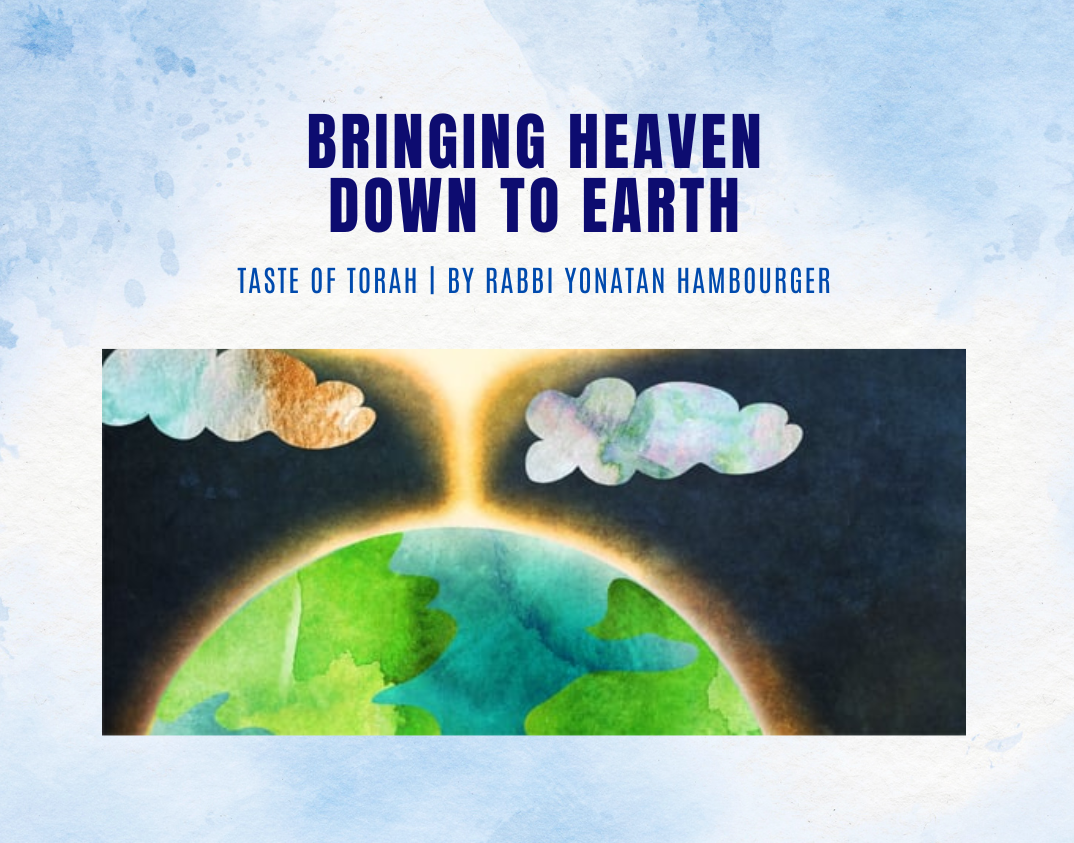
Bringing Heaven Down to Earth
This coming Tuesday evening through Thursday at nightfall, marks the holiday of Shavuot. It doesn’t get the fanfare of Rosh Hashanah, Yom Kippur, or Pesach, but it is the foundational event that transformed the Jewish people from a family clan to a nation with a religion.
3,336 years ago, the three million Jews who left Egypt camped at the base of Mount Sinai. There, G-d Almighty descended, declared His covenant with the Jewish people, and gave the world the Ten Commandments. But that’s not all…
What happened on this day completely changed the effect of human events forever. You see, prior to our encounter at Mt. Sinai, there was no connection between the physical world and the spiritual world. What was above stayed above; what was below stayed below.
At Sinai, G-d fused the two realms together giving us humans the ability to affect what goes on above. As a case in point, Psalm 121 states, “G-d is your shadow,” which means that just as a shadow mimics what a person does, so too, G-d so to speak, mimics what a person does.
We receive everything from G-d, but we are not passive recipients. Rather, we trigger the nature of G-d’s flow of blessings in our lives. We accomplish this by fulfilling G-d’s desire that we “tend His garden.”
We tend His garden through acts of love and kindness towards others, performing G-d’s commandments, and learning His wisdom in the Torah, thereby drawing down Divine kindness for the benefit of all humankind.
The Jewish peoples’ encounter with G-d at Mt. Sinai was not for the exclusive benefit of the Jewish people. A channel was opened for all of humanity to bring heaven down to earth. Now more than ever, is a good time to actively pursue this goal.
Wishing you Shabbat Shalom and a Happy Shavuot,
Rabbi Yonatan
May 30, 2024
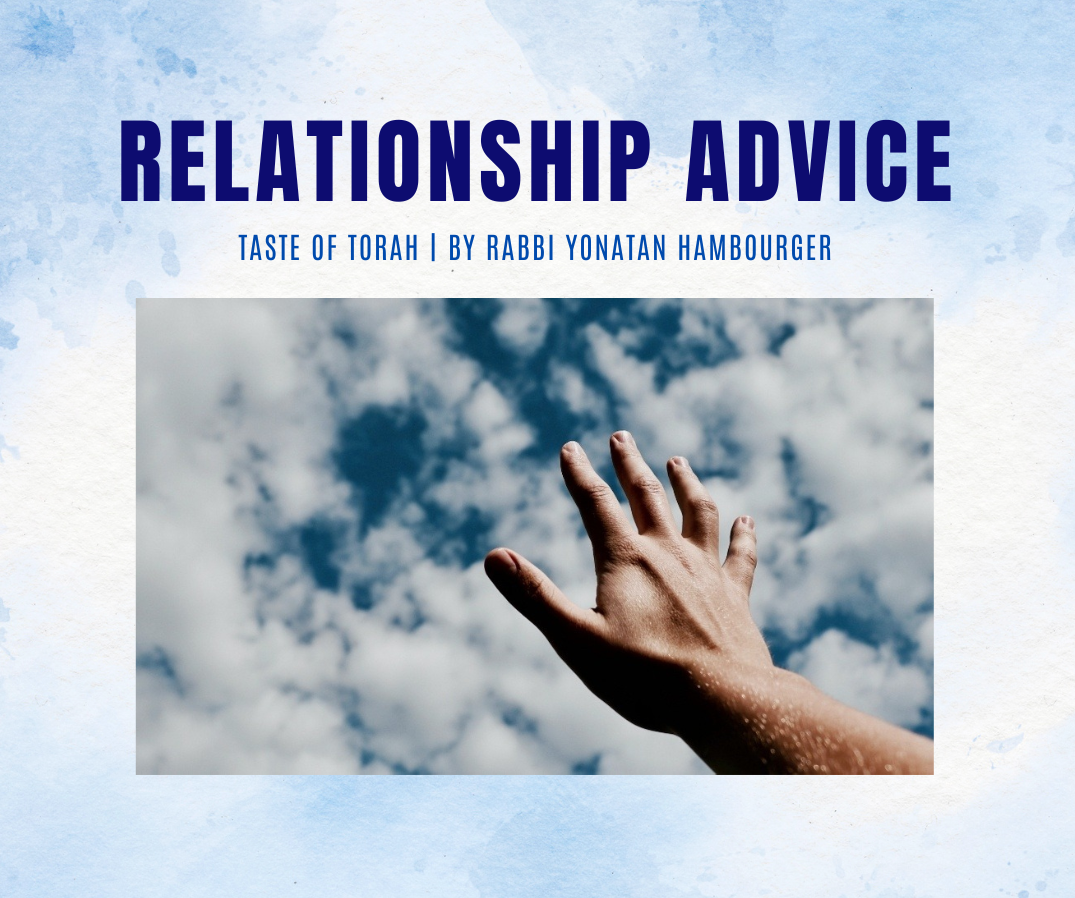
Relationship Advice
Have you ever felt taken for granted in a relationship? You do, do, do for the other and when don’t do, you don’t hear from them?
Well, you’re in good company. G-d himself cautions us in this week’s Torah portion to not look upon our good fortune as something random, or attributable exclusively to our own efforts.
It’s like the old joke about the guy who’s late for an important appointment, driving around the block for the umpteenth time looking for a parking space.
In desperation he cries out to G-d, “if you give me a parking spot right now, I will make a large donation to charity!” Just as the words leave his lips, a spot becomes available & he says: “Never mind G-d, I got this one covered!”
The problem with this kind of mindset is that it becomes a self-fulfilling prophecy, wherein G-d abides by our desire for distance (G-d forbid) and fulfills our wish to be governed by the laws of cause and effect, rather than by his personal providence.
Every green light, as well as every bump in the road is a custom-sent message from G-d. But just as your phone must be turned on to receive a text message, your spiritual sensitivity must be turned on to receive G-d’s messages.
This is accomplished through learning Torah and fulfilling His precepts. Rather than attributing things to ‘coincidence’ (which is just an eleven-letter name for G-d), we experience divine providence in all aspects of our life.
Take a few minutes right now and review everything that occurred to you today and contemplate the messages that G-d has sent you. Make efforts every day to deepen your relationship with your Creator and express your gratitude proactively.
Wishing you a Sabbath replete with peace and blessings,
Rabbi Yonatan
May 23, 2024
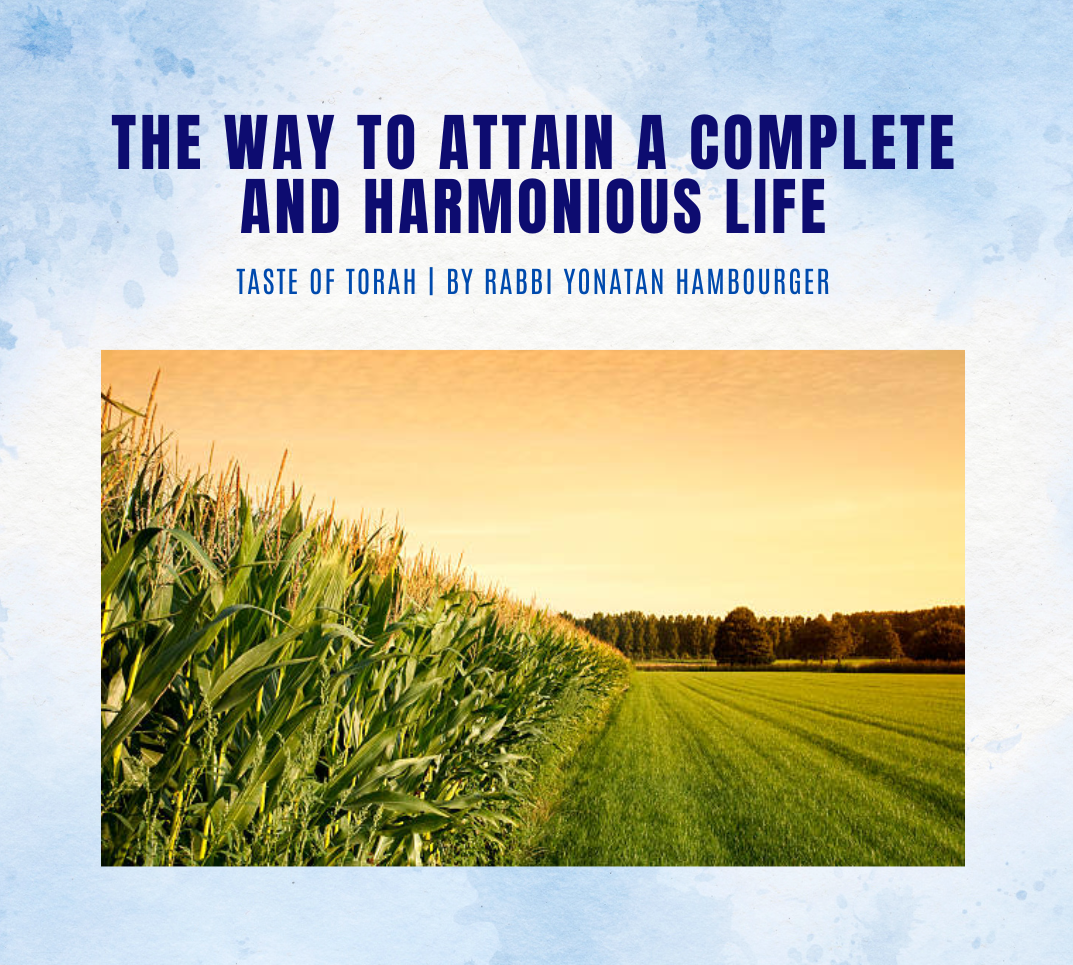
The Way to Attain a Complete and Harmonious Life
This week’s Torah Portion instructs us, “When you come to the Land that I am giving you, the Land should rest a Sabbath to God: you may sow your field for six years, but in the seventh year, the land should have a complete rest, a Sabbath to G-d.”
Isn’t the text in reverse order? Shouldn’t G-d have mentioned the six years of work first, before the year of rest which comes after? Afterall, when one “comes to the Land” to establish one’s way of life, first an abundance of labor is required.
First and foremost, we should bear in mind that while the means is earthly and material, our actual goal is spiritual and sacred. This approach ensures that we not become consumed by the material and mundane aspects of life.
Also, keeping the goal in mind transforms the drab and dreary aspects of our lives and makes them more refined and meaningful. Further, this perspective actually elevates the spiritual and sacred even higher!
Much of our daily lives is preoccupied with earning a livelihood, eating, and drinking—here, humans and animals are indistinguishable. But there is also the area of “earthly rest”—of breaking away from mundane living.
Perhaps the text is teaching us that we should begin the day with the idea that although it may be necessary later in the day to engage in mundane activities, the essence and purpose of these things is to attain a “Sabbath unto G-d.”
In this way, even the mundane aspects will attain meaning and refinement, while the holy aspects will be intensified and elevated to a higher order.
This is the way to attain a complete and harmonious life.
These concepts were excerpted from a public letter written by the Lubavitcher Rebbe in 1965.
Shabbat Shalom,
Rabbi Yonatan
May 16, 2024
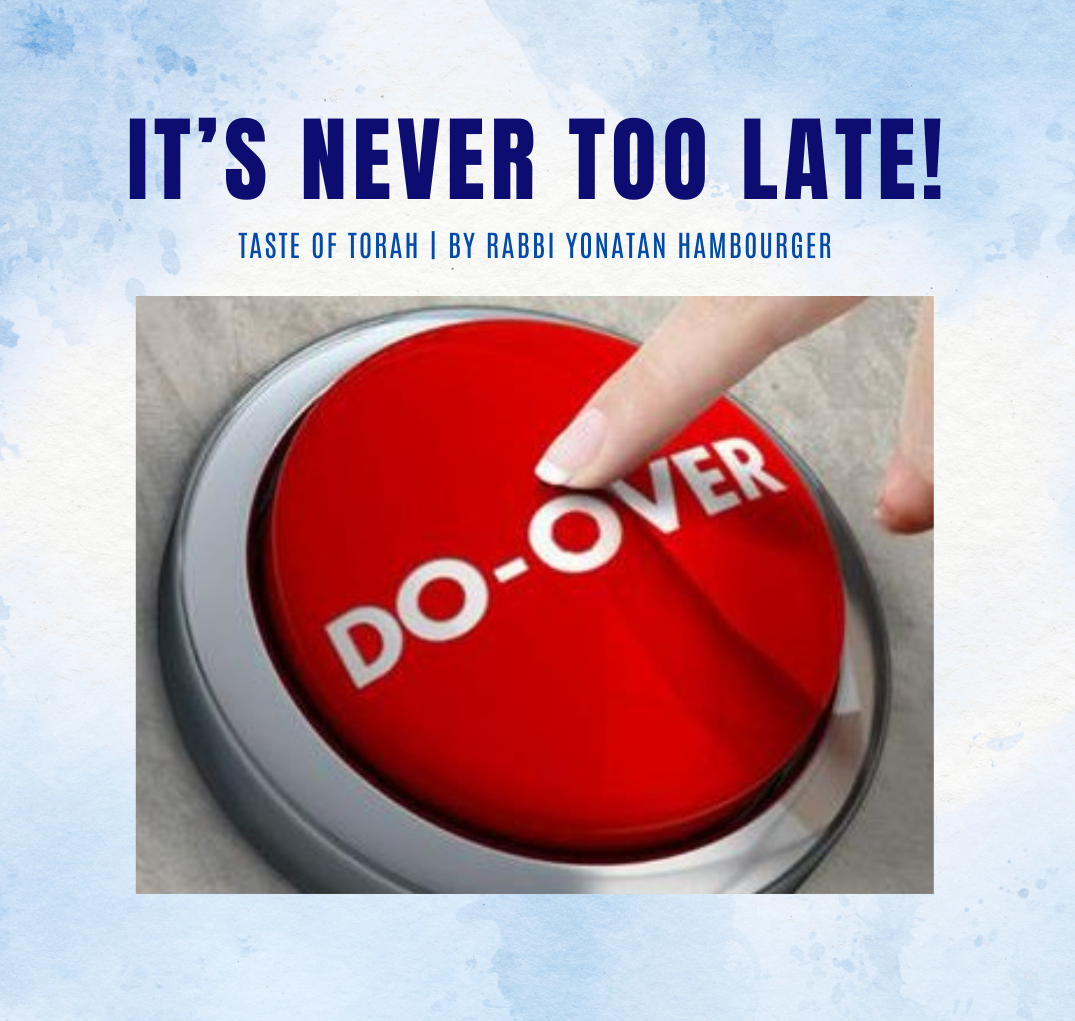
It's Never Too Late!
Next Wednesday, May 22nd marks my personal favorite holiday on the calendar! No, it’s not International Chocolate Lovers Day which would be a close second! It is the “Second Passover.”
It is observed one month after Passover, for anyone who was unable to participate at the proper time. Even if you celebrated Passover, it is customary to mark this day by eating matzah, as well as a good excuse to drink four cups of wine.
On the first anniversary of our exodus from Egypt, G-d commanded us to celebrate Passover, which we re-enact each year, to this very day.
But there were people who were not able to join because they had left the camp in order to fulfill another important good deed. When they returned, they were distraught that they missed the opportunity to celebrate Passover as G-d had commanded.
Moses assured them that they were fully exempted by G-d Himself. But that didn’t satisfy them. They demanded to celebrate Passover! They made such a ruckus that G-d relented!
He declared that each year, exactly one month after Passover would come a second chance known as the second Passover!
The lesson for us is that it’s never too late! There is no justification for despair, no matter how far away or lost we may be!
It is by recognizing how far gone we actually are, that we can rebound. And this Second Passover shows us that this rebounding is not the regular step-by-step formula. In a single instant we can redefine our past and mold our future.
There is no cause for despair. Quite the contrary, there is cause for acknowledgement, resolve, and then action.
Today, and every day, G d is giving us all a second chance. Let’s grab it.
Shabbat Shalom,
Rabbi Yonatan
May 9, 2024
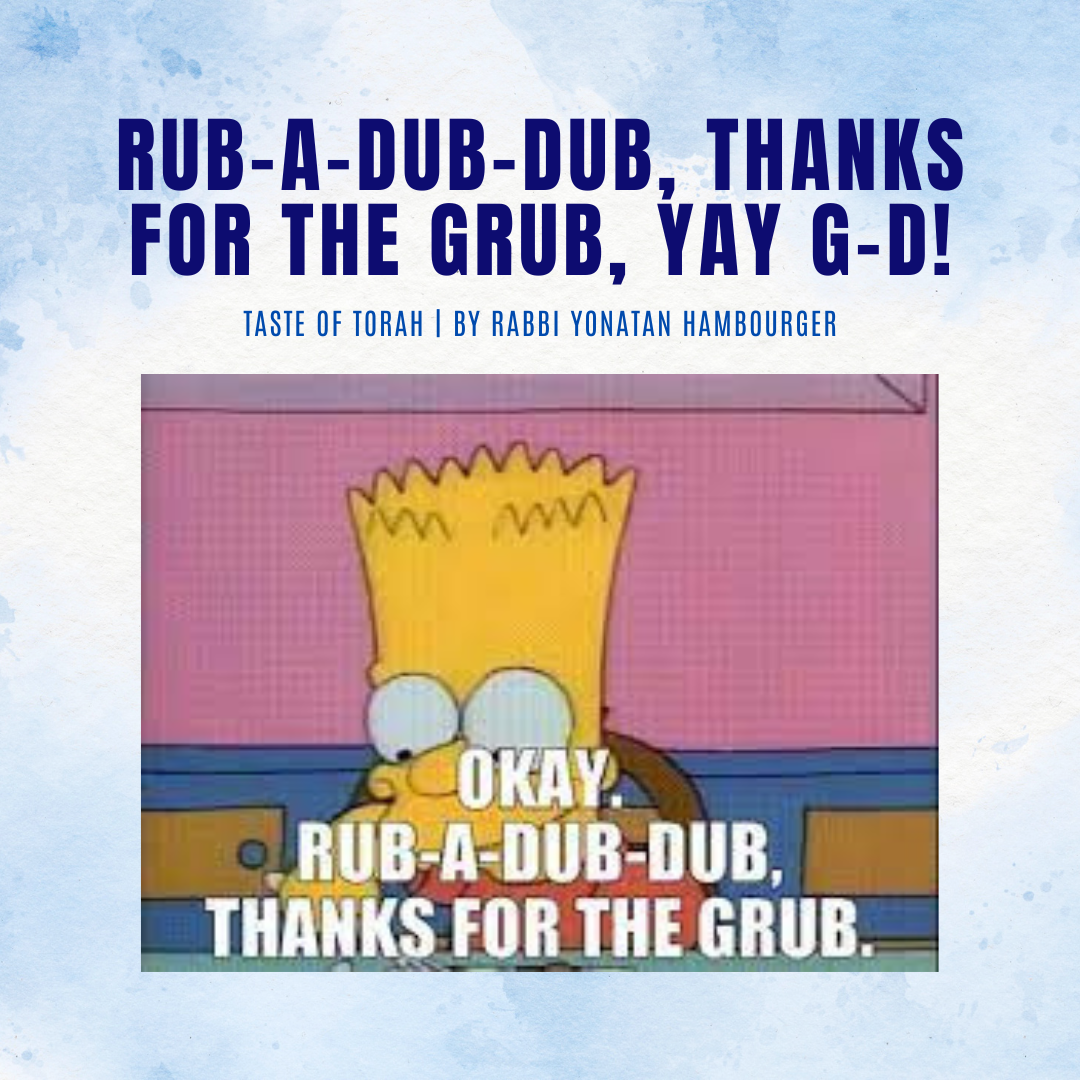
Rub-a-dub-dub, thanks for the grub, yay G-d!
When we go to a restaurant, we thank the hostess, the fellow who brings us water, the server, the chef, the valet parking attendant, and the one who pays the bill. Have I missed anyone?
In this week’s Torah portion, we learn that we must abstain from eating the first three years of fruits from our orchards, and then bring the crop from the fourth year to Jerusalem.
The purpose is to honor G-d with the first, best crops which grow during the third year. Similarly in our own lives, before deriving benefit from something, we are commanded to thank G-d for granting it to us.
The reason is that we don’t have permission to partake of G-d’s world unless we acknowledge what He has blessed us with. So, we recite blessings constantly; upon awakening, during prayers, before and after eating, and more.
Looking from the outside in, one could say that we are obsessive! Why can’t we just do one big “rub-a-dub-dub, thanks for the grub, yay G-d” each morning and be done with it?
Because reciting a blessing channels G-d’s goodness and reveals His presence in the world. From this perspective the blessing is not secondary to the food; it is actually the main thing.
For example, a basic blessing is, “Blessed are you Lord our G-d, by Whose word all things came to be.” This reminds us that everything comes from G-d; that He is the source of our life; that He is intimately involved in our affairs, and that everything was created by Him.
Try it for yourself with a glass of water. Before you take the first swig, recite the blessing above. There are different blessings for different food groups, but this is not the place to exhibit my obsessiveness, because I don’t want to scare you away!
Wishing you a Shabbat Shalom Umevorach, a peaceful and blessed Sabbath!
Rabbi Yonatan
May 2, 2024
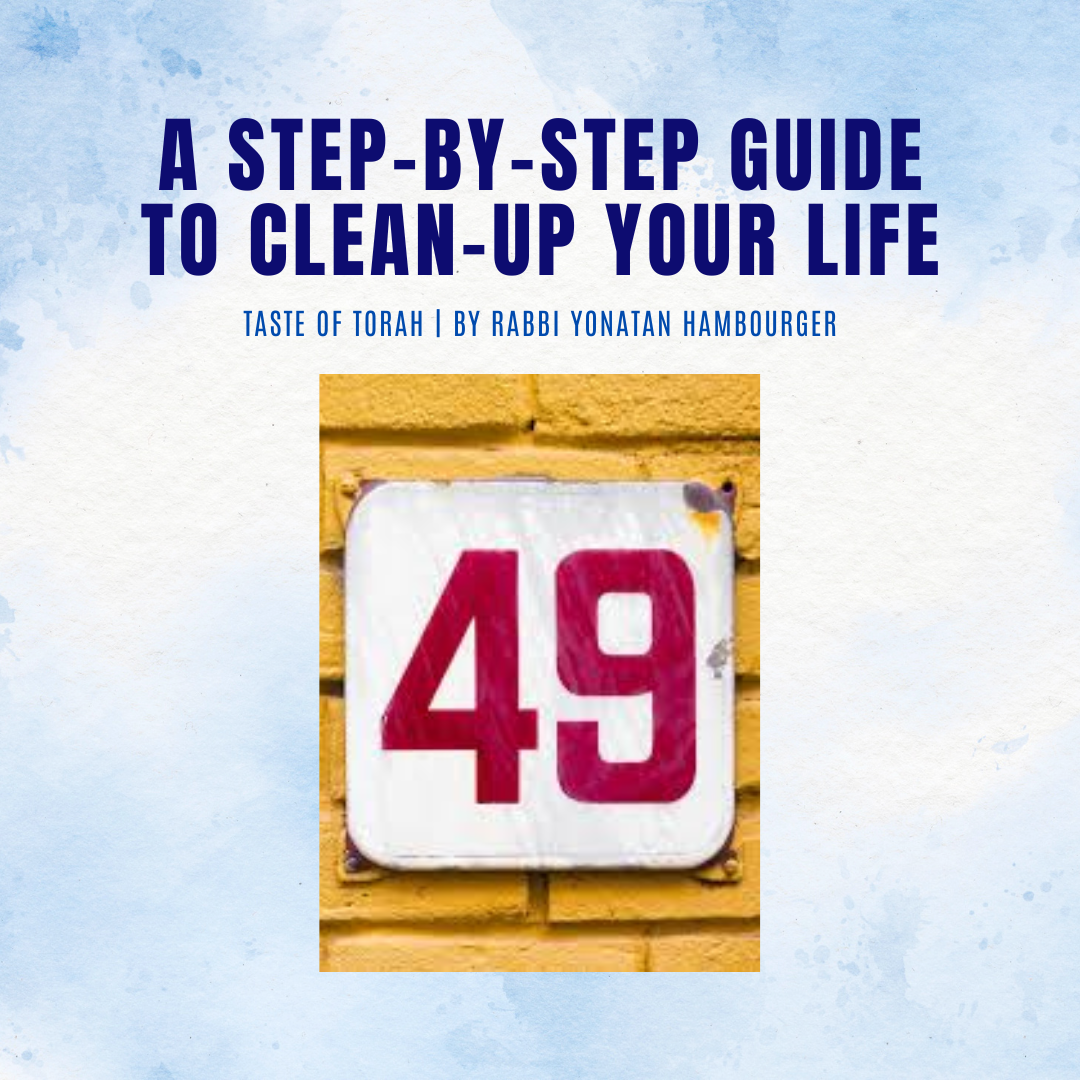
A Step-By-Step Guide to Clean-Up Your Life
Parshat Achrei Mot, 5784
The Jewish peoples’ 210-year bondage in Egypt left them totally broken. They were in such a sorry state that they had nothing to contribute towards their own redemption, so G-d took them out of Egypt with “a strong hand and an outstretched arm.”
Upon leaving Egypt, the Israelites began a march to Mount Sinai where fifty days later, they would experience G-d face-to-face and receive his entire Torah and Laws, including the Ten Commandments.
In order to prepare themselves for such an encounter, The Children of Israel had to undergo a spiritual deep cleansing because their psycho-spiritual-emotional framework had become so degraded.
The Kabballah informs us that we each have seven emotional attributes: love, fear, compassion, ambition, humility, connectiveness, and receptiveness.
At the root of everything that is not great in our lives, lays distortions amongst these seven emotive attributes.
Each emotion is a composite of all the others. For example, love is comprised of itself plus the other six emotions. Hence there are a total of forty-nine ‘parts’ to re-assemble in proper working order.
Each of the 49 days we walked in the desert, we refined another aspect of our psyche. On the 50th day, we met G-d at Mt. Sinai and received the Torah.
Today we continue the spiritual deep cleansing, by saying a short Blessing each day followed by counting the day corresponding to the emotion we are refining.
Try it out for yourself…
“Blessed are you, Lord our G-d, King of the Universe, who has sanctified us with your commandment to count the Omer”.
Then look for today’s date with its corresponding emotion and say it out loud:
https://www.chabad.org/holidays/sefirah/omer-calendar_cdo/jewish/Omer-Ca...
That’s it! The key is to do it, whether or not you understand or believe.
At the conclusion of the 49 days, you will have refined your emotions!
Happy counting!
Rabbi Yonatan
April 25, 2024
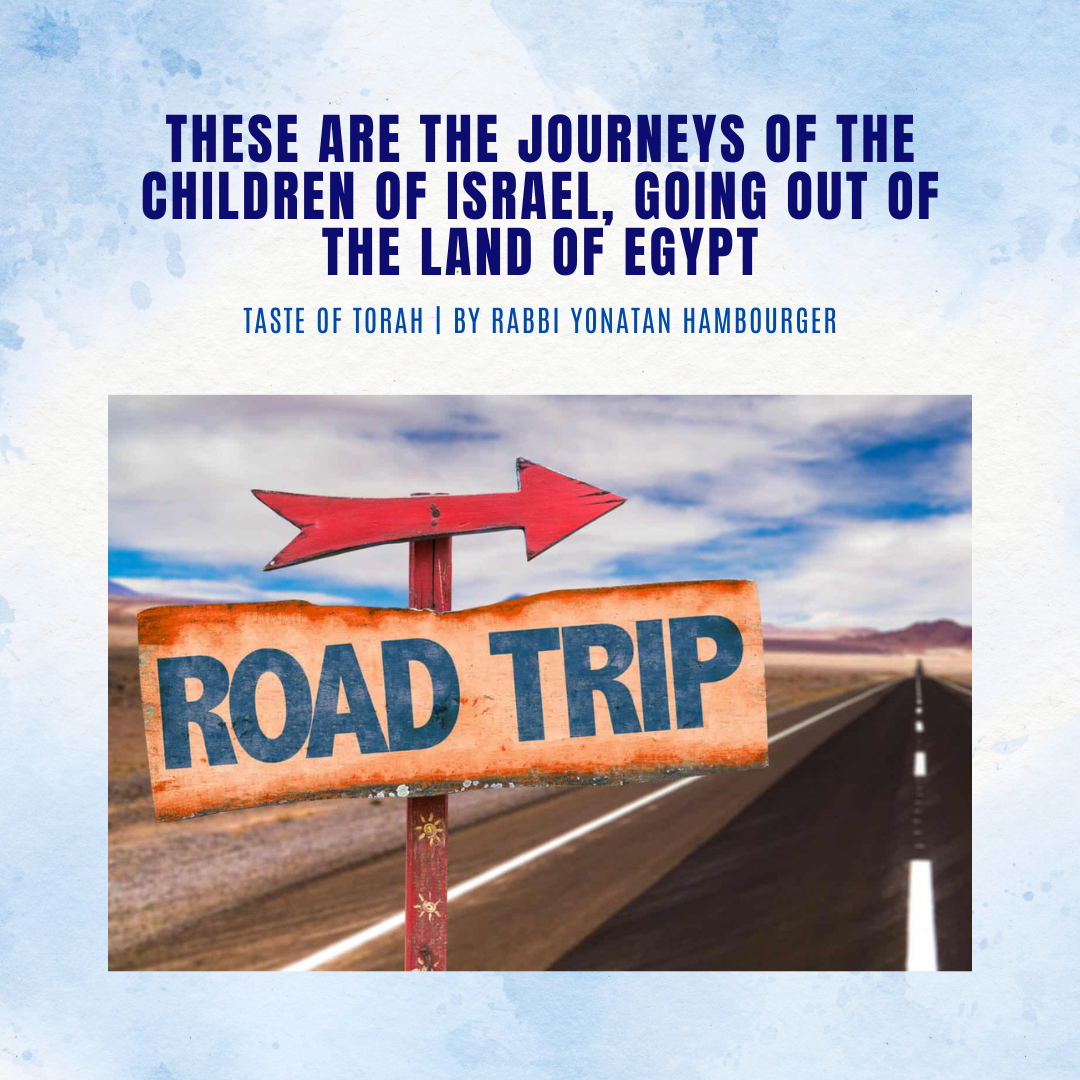
These are the Journeys of the Children of Israel, Going Out of the Land of Egypt
We are in the midst of celebrating the eight-day holiday of Passover which commemorates the Children of Israel’s exodus from Egypt.
Their exodus set-in motion a journey which included forty-two encampments, lasting forty years, culminating in their entry into the Promised Land.
The Torah describes this forty-year trek by stating, “these are the journeys of the children of Israel, going out of the land of Egypt.”
Why is the word “journeys” written in plural? Afterall once we left Egypt, we were no longer in Egypt. Perhaps the verse implies that each stop along the way was part of going out of the land of Egypt.
The Chassidic masters explain that our exodus from Egypt never ends. Leaving Egypt is a personal journey from the boundaries and constraints of habit, comfort, and ego.
In fact, the Hebrew name for “Egypt” is “Mitzrayim,” which means “constraint.”
The Midrash states that, “When we have one hundred, we want two hundred…” Regarding materiality, this is not a virtue. But when it comes to self-improvement, this is a virtue, indeed!
Hence, what we considered to be liberating yesterday, feels confining and inadequate today.
Having transcended yesterday’s limitations, we must again journey from the “Mitzrayim” that our present level represents vis a vis our newly discovered potential.
That is why our sages say that “in every generation and every day, a person must see himself as having today left Egypt.”
Leaving “Mitzrayim” is just the beginning. Our purpose is to get to the “Promised Land” which consists of the achievements we create by breaking free from yesterday’s constraints.
Wishing you a taste of freedom this Passover, a foretaste of the true freedom we will experience upon the fulfillment of G-d’s promise when He ushers in an eternal era of peace and plenty for all.
Rabbi Yonatan
April 18, 2024
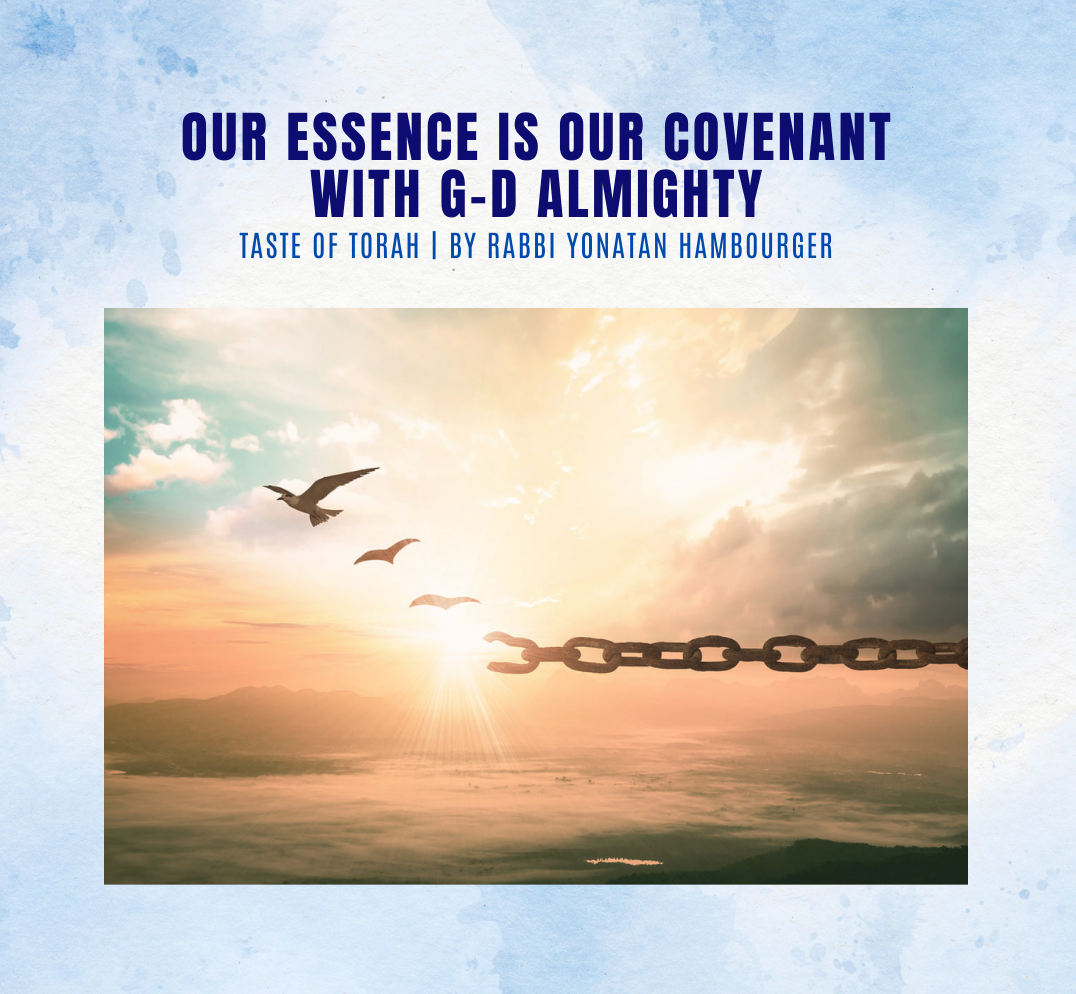
Our Essence is Our Covenant with G-d Almighty
This Monday evening, at our Passover Seder, we will celebrate our freedom, while 133 members of our extended family are being held hostage in brutal captivity.
Those of our brothers and sisters living in Israel are being threatened along every border, as well as from long-range missiles from the Jewish people’s implacable enemy, Iran (Persia).
We who live in the USA and elsewhere outside of Israel are shocked at the belligerence directed at us from not only the political and cultural fringes, but from some of the mainstream as well.
Passover commemorates not just a historical event, it also contains the key to our essential, personal freedom. And it is actually the eating of Matza on Passover that teaches us how to be truly free, regardless of external circumstances.
The Talmud states that what is holding us back from living freely is the yeast in the dough during Passover!
For when we are all puffed up with our own selves, we are enslaved to our misguided self-construct. Further we become prisoners to a world of false expectations that we think we must satisfy and please.
The spiritual energy of Passover combined with the external circumstances that bear down on us especially this year, give us the elixir to break free from our inner-bondage and enable us to express our essence.
Our essence is our covenant with G-d Almighty.
Eating Matzah for the eight days of Passover enables us to connect with G-d’s infinite energy, and be empowered to transcend all our limitations...
That is real freedom!
Let us pray that all the hostages are released immediately and celebrate Passover this Monday evening around their own families’ Passover table.
Wishing you a Good Shabbos and a liberating Passover,
Rabbi Yonatan
April 11, 2024
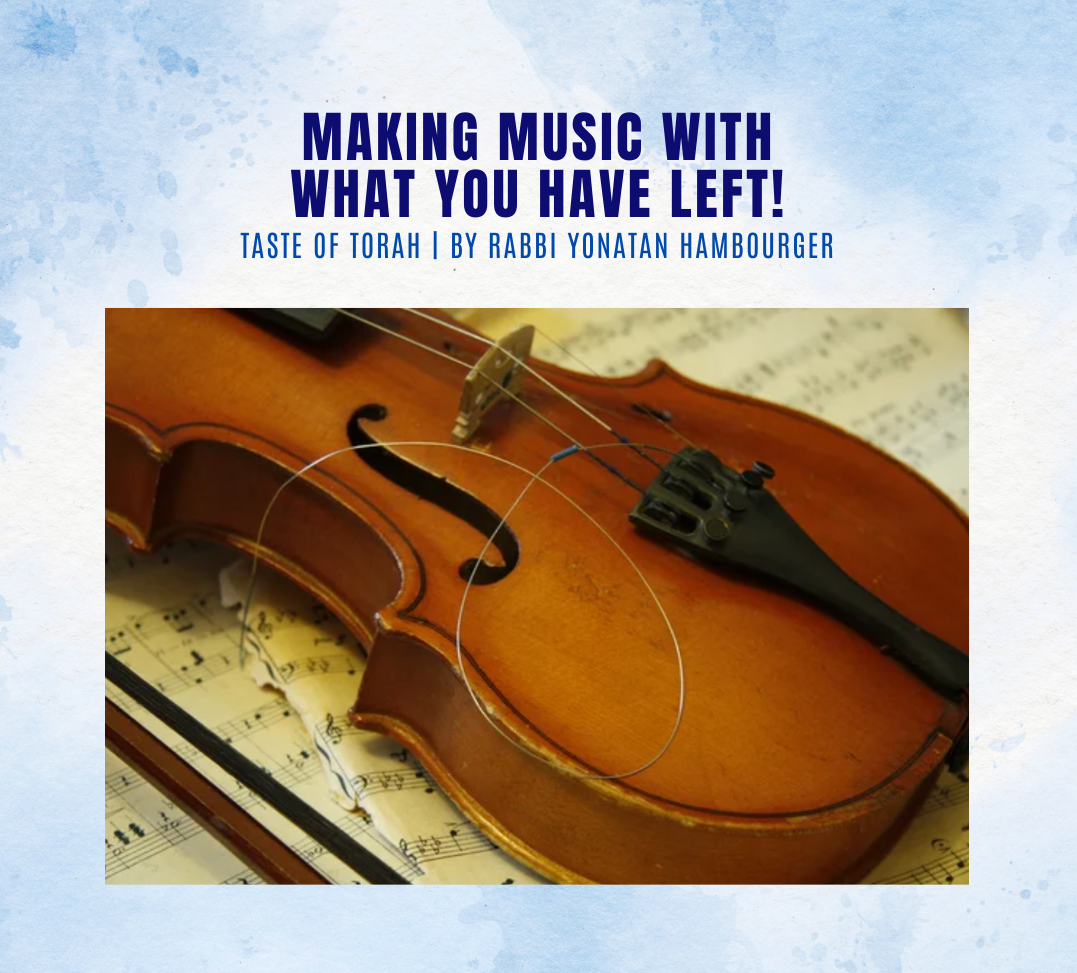
Making music with what you have left!
If you have been reading this column for a while, you know that I have a tradition to retell the following story each year.
It deals with what to do with the bumps and bruises we acquire while navigating through life, and how not to let them get in the way of living joyfully today…
Yitzchak Perlman, the world-renowned violin virtuoso limped onto stage at Lincoln Center in 1995, along with the braces and crutches that were his constant companions since he had polio as a child,
Perlman picked up his violin and positioned himself. Then, just a few bars into the performance, one of his violin strings snapped.
The audience prepared itself to wait patiently as Perlman would need to reattach his braces and crutches, and hobble off-stage to fetch a new string, or a new violin.
You can imagine the awe when Perlman just continued to sit there, with eyes closed, and then motioned to the conductor to begin again.
Now a violin has 4 strings and cannot be played with only 3 strings. But Yitzchak Perlman apparently didn’t know that. Perlman played with more passion, power, and purity than ever before.
When he finished, there was an awesome silence in the room. And then the audience rose and cheered. There was a deafening outburst of applause from every corner of the auditorium.
Perlman wiped the sweat from his brow, raised his bow to silence the crowd and said the following in a quiet, pensive, reverent tone:
“You know, sometimes it is the artist’s task to find out how much music you can still make with what you have left.”
My dear friend, let’s love ourselves and love each other exactly as we are.
Let’s make a lot of music with what we have left!
Wishing you a blessed Shabbat,
Rabbi Yonatan
April 4, 2024

Holy Cow!
This week’s Torah portion discusses the identifying signs of a kosher animal, which brings to mind the following story:
A wealthy butcher slaughtered a cow and questioned whether it was kosher owing to an abscess on the animal’s lung.
He brought the lung to the Alter Rebbe to obtain an expert judgment whether this cow could be sold as kosher meat or if the carcass would need to be disposed of, causing financial loss to the butcher.
The Alter Rebbe, a most highly sought after Rabbi, mentor, and legal expert began to pull various books off the shelves to determine whether in fact the animal was kosher.
Feeling badly for wasting the Alter Rebbe’s time, the butcher told the Rebbe that he was prepared to discard the carcass and free up the Alter Rebbe’s time for more important matters.
The Alter Rebbe told the butcher that he was not expending his valuable time for the butcher’s sake, but rather for the cow’s sake.
How do you interpret this story?
Every item in this world contains a divine spark which is waiting to be elevated. When we use a particular substance for a positive purpose, we elevate it to a higher level.
The test of whether we are acting like people rather than animals lies in the way we relate with the people and things around us.
Our job is to ensure that our intentions and actions are for the purpose of lifting up the world rather than simply indulging in sensual pleasure for its own sake.
Before we think, speak or act in a particular manner we are instructed to ask ourselves, “Does this really reflect who I am? Will it positively impact myself and the people around me?”
I hope that this gives you pause.
Shabbat Shalom,
Rabbi Yonatan
March 28, 2024

Keep the Home Fires Burning
How do we keep our passion alive, especially when it comes to the repetitive, mundane aspects of our lives? We need not look beyond this week’s Torah reading wherein G-d instructs the Jewish people, “A continuous fire shall burn upon the alter; it shall not go out.”
This continuous fire is represented today by the “Ner Tamid” (eternal flame) that hangs above the holy ark in every synagogue.
Looked at through the lens of Chassidic philosophy, the verse can be explained that if the inner fire of the heart is kept burning continuously, it will extinguish all negativity.”
We each have a personal Temple, a sacred space within our hearts and minds. We may not be conscious of it during ordinary times, but our inner flame and passion are always lit, both during challenging moments as well as during ordinary times.
But just as a physical fire requires fuel to remain lit, so too our inner flame requires fuel to sustain itself and keep our passion alive.
Just as a little light dispels a lot of darkness, so too, the performance of even one Mitzvah provides fuel for our inner flame to shine and it removes the foolishness of our negative impulses.
One good deed, whether it’s studying Torah for a few minutes each day, or going out of our way to help someone else in need is the key to our wellbeing. Moreso, one good act can tip the balance of the entire world and help usher in a new era of peace and plenty for all. May this occur speedily, in our days!
Shabbat Shalom,
Rabbi Yonatan
March 21, 2024

Time to Party!
G-d willing, we will celebrate Purim on this coming Saturday night & Sunday!
“Celebrate” is actually too tame of a word. Not Times Square on New Year’s Eve, nor Rio de Janeiro during Mardi Gras come close.
We dress up in ridiculous costumes, overindulge in food and liquor, while giving out huge amounts of charity.
We are literally commanded to leave all reason and sense of self behind.
Why are we so happy? You can begin by going to http://www.Chabad.org and read the miraculous events that took place on Purim, but that’s only part of it.
We are so happy because Purim marks the moment when we took ownership of our Jewishness!
There was a decree of total annihilation against the Jewish people. We could have simply renounced our Jewishness and lived like the rest of the citizens of the Persian empire.
After all, our morale was at an all-time low. Our Holy Temple had been destroyed. We had been led away to exile in chains.
We had seemingly been abandoned by G-d Himself. Who could blame us?
But instead, we did something insane…
We said, ‘bring in on! We will live like Jews, or we will die like Jews!’ We came together as one people, fasted, and prayed, and the rest is history.
Two thousand, four hundred years later we haven’t heard a whisper from the ancient Persian empire, nor the ancient Egyptians, Assyrians, Babylonians, Greeks, Romans, et al!
Two thousand, four hundred years later we are still celebrating!
And very soon we will be celebrating our ultimate joy with the coming of our righteous Moshiach!
Wishing you a wonderful Shabbat, and a “beyond the mind” Purim,
Rabbi Yonatan
March 14, 2024
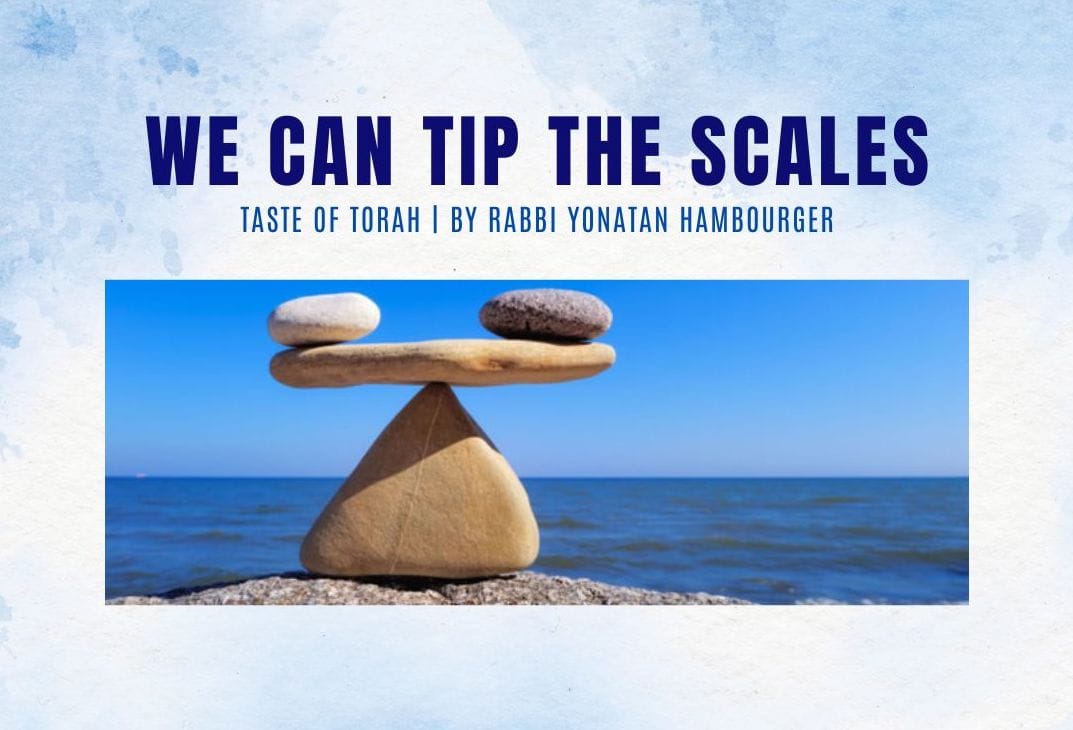
We Can Tip the Scales
While painfully aware of the pain and suffering of our brothers and sisters being held hostage in Gaza, we may feel frustrated by our lack of ability to make a meaningful difference.
But in truth, it’s the seemingly “minor” Mitzvot and small acts of kindness which often make the greatest impact… like lighting Shabbos candles, giving charity, wrapping tefillin, calling on a sick neighbor, or smiling at someone you don’t particularly care for.
In this week’s Torah portion, we learn about the accounting which Moses made of all the various materials and contributions which the Jewish people gave towards the construction of the Tabernacle (the portable sanctuary).
A renown commentator, The Sforno explains that this accounting demonstrated that each item contributed to the Tabernacle was important enough to be known by its specific name and served a unique function.
This serves as a lesson for how we should conduct ourselves in our own lives. Every single person serves an indispensable role in this world. Each one contributes something unique in Gd’s masterplan for creation.
Let us take upon ourselves to do an additional Mitzvah in merit of the safety of our brothers, sisters, and all good people in Israel and around the world and usher in a time of peace and prosperity with the coming of Redemption.
As Maimonides states, “Throughout the entire year, a person should always look at the world as equally balanced between merit and sin… if he performs one mitzvah, he tips the balance of the entire world to the side of merit and brings deliverance and salvation to himself and others…”
Shabbat Shalom,
Rabbi Yonatan
March 7, 2024

Manna From Heaven vs Uber Eats
If G-d is the source of all blessings, then why work? And if we do work and succeed then why are we thanking G-d for the result of our own efforts?
In this week’s Torah portion, we are instructed: “Six days shall work be done, but on the seventh day shall be holy, a day of complete rest to G-d.”
Should not the sentence read “you shall do your work in six days…” rather than, “in six days shall your work be done?”
The use of the passive form suggests that even during our work week, our effort alone is not enough.
Conversely, we all know that heartfelt prayers for rain won’t do a bit of good for the farmer who hasn’t planted his field!
So, what causes us to succeed; our efforts, or G-d’s blessings?
There is always a combination of effort and blessings required, yet we should be mindful that the purpose of our effort is to serve as the conduit for G-d’s blessings, nothing more.
While in the desert for 40 years, G-d fed the Children of Israel with bread (manna) from heaven.
Those with a lot of faith simply stretched their hand out of their tent to receive their daily portion, while those with little faith had to expend greater effort to find their daily portion.
G-d could have called Uber Eats for delivery right to our tents, requiring no effort at all on our part. But he tasked us to exert ourselves to some degree, based on our connection & faithfulness.
Nothing has changed!
Wishing you a peaceful Shabbat!
Rabbi Yonatan
PS: Please pray for our hostages. May they come home safely and quickly and may G-d grant us a decisive victory against the dark forces which threaten us.
February 29, 2024

Second Chances
In this week’s Torah portion, let’s look at Moses’ motivation in smashing G-d’s Ten Commandments, in response to the Children of Israel’s worship of the golden calf.
The Talmud tells the story of a king who became enraged by rumors that the woman he was engaged to had committed an act of infidelity.
A quick-thinking friend who knew the woman was virtuous, took the betrothal contract and ripped it to shreds so that the king could not use it as justification to punish her.
A thorough investigation ensued, and it turned out that the rumors of the queen’s infidelity were baseless. The king was forever grateful to his friend for intervening.
The Tablets Moses received from G-d were intended to serve as a marriage contract between us and G-d.
But on his way back down Mt. Sinai, a small number of Jews were serving a Golden Calf. G-d told Moses He would wipe them all out and allow Moses to start anew with an easier to manage bunch. Then, Moses immediately smashed the Tablets.
Far from being an act of rage, Moses’ seemingly destructive act is considered a quintessentially selfless act of leadership.
By smashing the Tablets (tearing up the marriage contract) prior to delivery (consummation), Moses averted our certain annihilation.
Thus, we had a pathway to return to G-d, which elicited G-d’s complete forgiveness, followed by a second set of Tablets which in some ways, was superior to the first set.
The worst national sin in the history of the Jewish people was forgiven.
People do make mistakes and mess up really badly from time to time…
This Biblical account reminds us that between us and G-d It’s never too late, and with sincere repentance we can always get another chance.
Shabbat Shalom,
Rabbi Yonatan
February 22, 2024
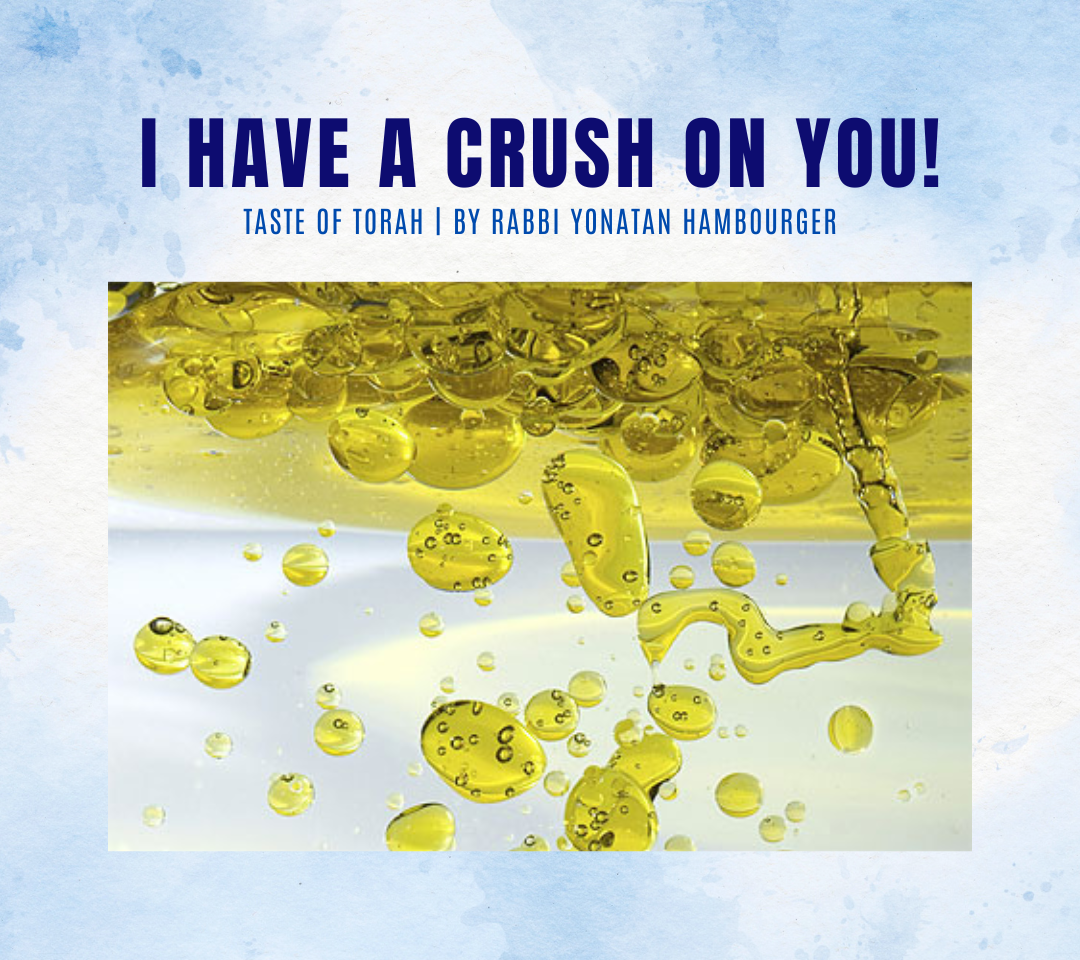
I have a crush on you!
It is both by choice and by force that Israel dwells along among other nations. Our resolve to hold fast to the Torah, and to our faith has kept us unique for more than 3,300 years. On the other hand, our mistreatment by the other nations has also strengthened our core of Jewish belief.
The opening sentence to this week’s Tora portion is, “and you shall command the children of Israel, and they shall take to you, pure olive oil, crushed for lighting…”
Oil represents the faith and spiritual potential within our own soul. On the one hand, oil never mixes with other liquids, but on the other hand oil permeates everywhere.
These two qualities represent our nature. On the one hand we refuse to lose our identify among the nations of the world. On the other hand, we greatly impact the world in ways which permeate all parts of society.
But it’s not enough to possess spiritual potential. Oil must be lit to make it shine! During “normal” times our inherent faith may not be apparent. But during “crushing” moments our reservoirs of faith shine forth.
The Talmud tells us, “Just as the olive yields oil only when it is pounded, so are man’s greatest potentials realized only under the pressure of adversity.” In previous generations, the “crushing” was external. But in our generation, despite recent flare-ups of antisemitism, we live in relative peace and prosperity.
Our challenge is to express our inner faith even though we are not being “crushed.” While we are grateful for our freedom and opportunities, we must remain connected to our heritage; not out of guilt, but out of our appreciation of our divine mission…
to engage in thoughts, words, and actions which will tip the scale & bring peace and G-dly revelation NOW!
Shabbat Shalom,
Rabbi Yonatan
February 15, 2024
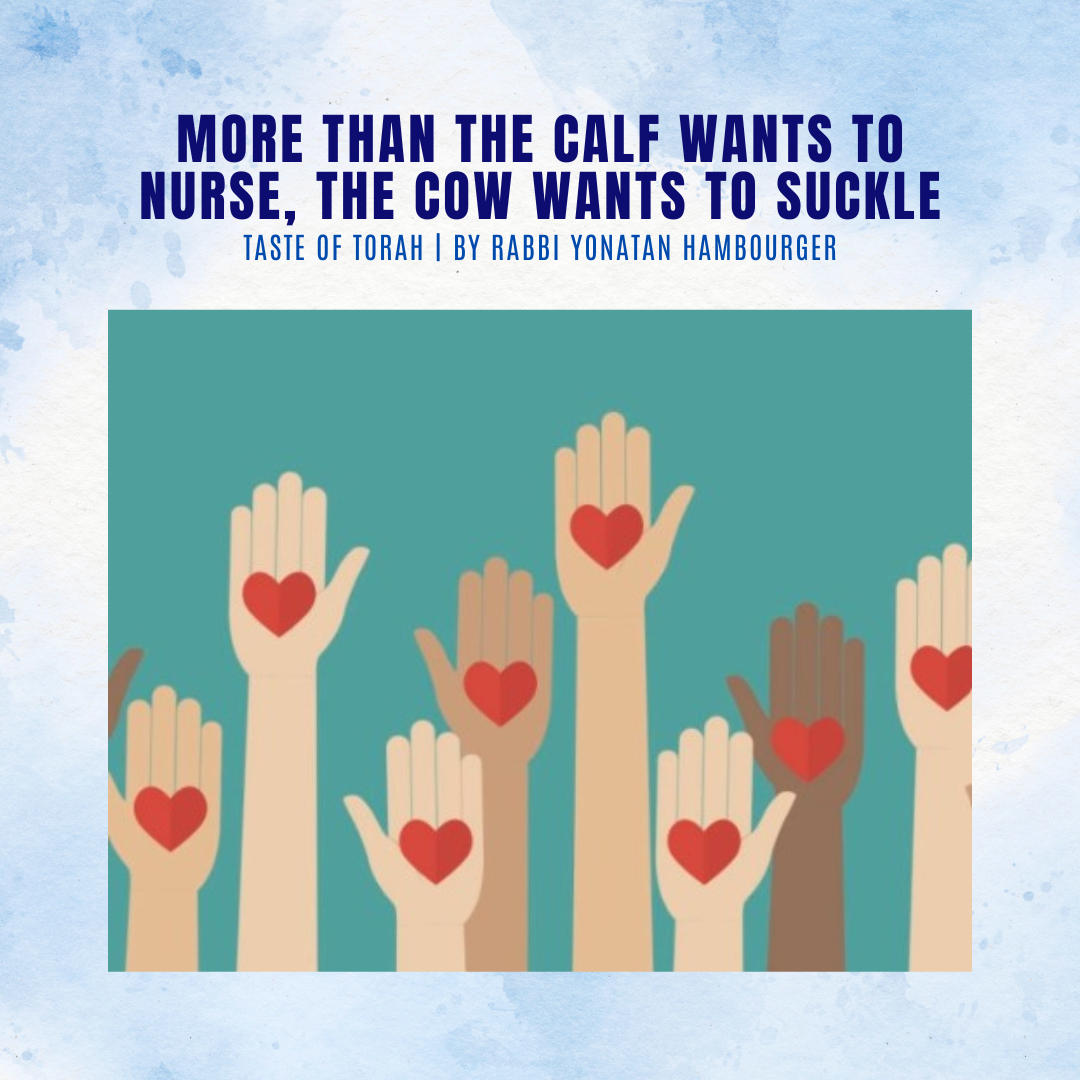
More than the calf wants to nurse, the cow wants to suckle
In this week’s Torah portion G-d says to the Jewish people, “take for me an offering (charity)…from every person whose heart inspires him to generosity…”
Wouldn’t better diction have been, “Give to me (on my behalf) …” rather than “take for me…?” Perhaps the lesson is that when we “give” charity we actually receive more than we give.
According to the U.N., enough food is produced to feed everyone on the planet, yet 821 million people are considered chronically undernourished.
So why didn’t G-d set up a distribution network from heaven to give to the needy, cutting out the middleman?
G-d designated us as his middlemen, and we are responsible for the distribution network, because the purpose of creation is to make the world a kinder place by helping one another.
Yes, hungry people need food, and even more need love. Most of us don’t lack food or love, but we all need more meaning in our lives which is why G-d gives us the opportunity to give.
The Talmud tells us, “More than the calf needs to nurse, the cow needs to suckle.”
Each of us has the privilege to contribute to the refinement of the world with our checkbook and with our acts of goodness and kindness.
By doing our part, we are helping usher in a time of peace, kindness, and prosperity for all of humanity.
Wishing you a Shabbat of delight,
Rabbi Yonatan
February 9, 2024

Don’t Have a Cow!
In last week’s Torah portion, G-d revealed himself to us on Mount Sinai.
Just prior, G-d split the Reed Sea for us, and before that he visited ten plagues on the Egyptians, and before that Josef saved the entire world from famine, and before that… you got the point!
Suddenly this week the narrative changes and we are learning about torts and damages, like a first-year law student:
What is my liability if your ox falls into my pit? If I come across my enemy’s stray donkey, am I obligated to return it? How are damages calculated if I knock out another guy’s tooth?
Judaism based on the Torah is a process where we build our lives and our society based on the premise that other people matter.
We live in a way so as not to cause harm to other people, including their oxen and donkeys. In the process, we refine our compassion, empathy, and connection in our everyday ordinary lives.
G-d gave us the Ten Commandments and expects us to show Him what we can do with them! What kind of world are we going to create using His Torah as a blueprint?
When we sync our thoughts, speech, and actions with Torah, we experience all green lights and there’s always a parking space waiting for us…
Not really, but we don’t sweat the red lights and lack of parking, so much.
This is all accomplished by being sensitive to everyone and everything around us, by notice the needs of others, including strangers and acting kindly.
This literally brings heaven down to earth.
Wishing you all the best this Shabbat & always,
Rabbi Yonatan
February 1, 2024
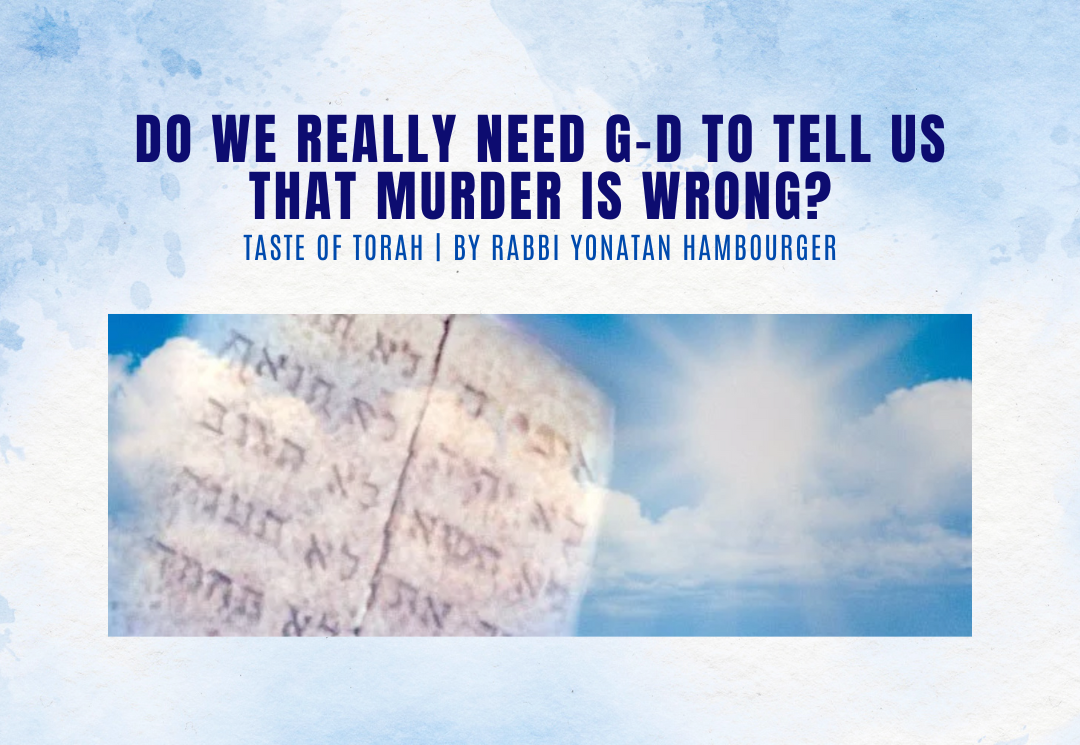
Do we really need G-d to tell us that murder is wrong?
In this week’s Torah portion, the Children of Israel receive the Ten Commandments from G-d. Why is the opening line, “I am the Lord, thy G-d?” Wouldn’t we have figured out on our own to refrain from murder, theft, and adultery?
Maybe not. Afterall, it was just one generation ago that the crème de la crème of German culture actively participated in the worst atrocities in history, and army officers gassed Jewish children during the day while reading bed-time stories to their own children each evening.
If our commitment to decency is based on anything other than G-d based, there is no guarantee that our actions will not be swayed by self-love, expediency, or worse. Nazi Germany proved that even the most culturally evolved society can commit mass murder.
G-d based morality gives us the tools to lead moral lives and deal with others honestly and respectfully, with consistency. Otherwise, no matter how good a person may be, he may succumb to compromising his values based on expediency or comfort.
But don’t ‘religious’ people also display immoral behavior?
Yes, but when they do they feel awful and repent, or they foolishly look for a justification. On the other hand, one who believes there are no fixed universal values simply changes the definition of his ‘lapse’ so he may remain ‘moral’ based on his own lexicon.
The giving of the Ten Commandments was not a one-time event, but rather the establishment of a channel that continues to enable man and G-d to relate to each other. This relationship is available to all of humanity who connect to the one eternal G-d.
Shabbat Shalom,
Rabbi Yonatan
January 25, 2024
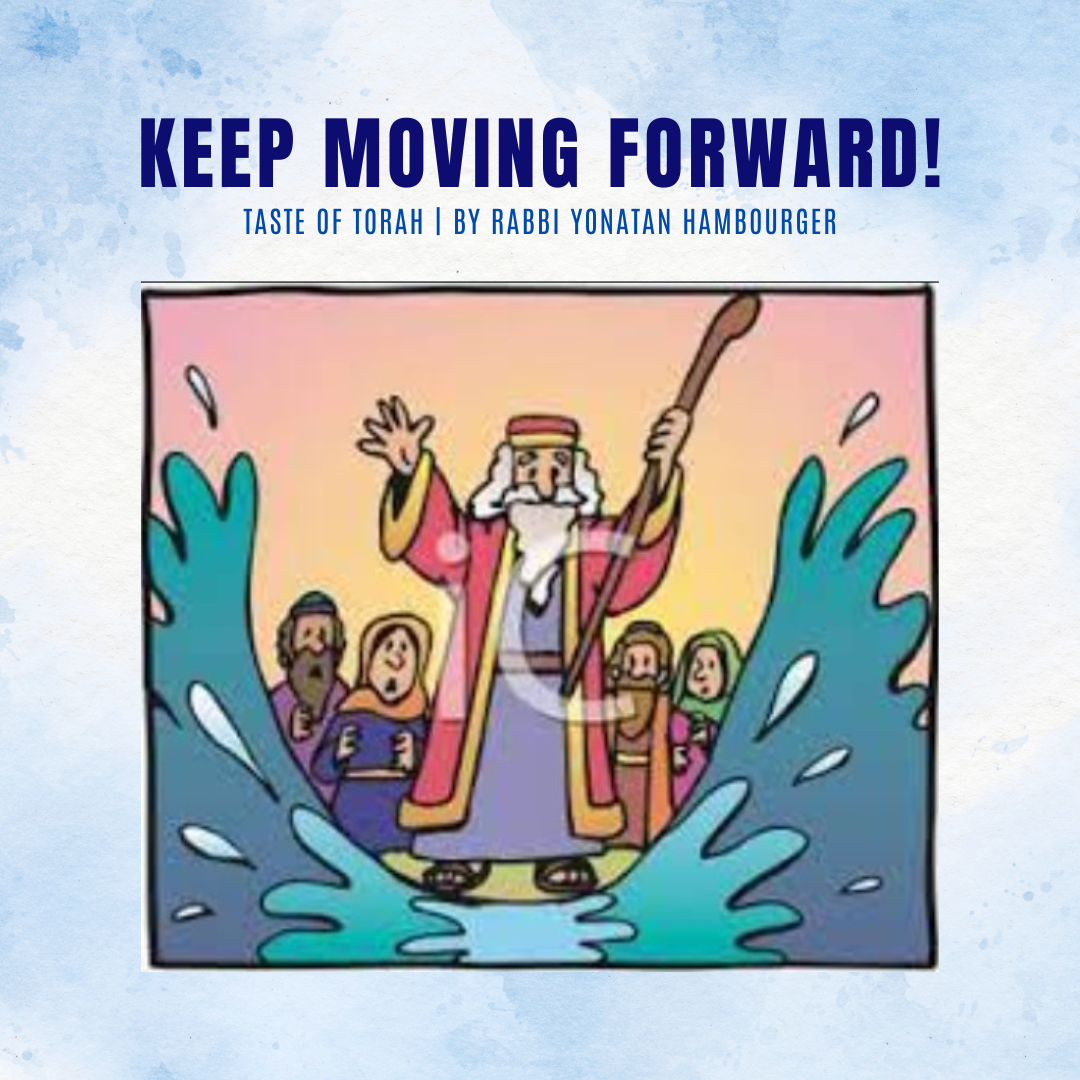
Keep Moving Forward!
There are moments in life when prayer is not enough-we must act!
Seven days after our miraculous exodus from Egypt we faced a raging sea in front of us and the Egyptian army chasing from behind. What should we do?
There were those who said, ‘let us cast ourselves into the sea.’ A second group said, ‘let us return to Egypt.’ A third group said, ‘let us wage war against the Egyptians.’ And a fourth group said, ‘let us cry out to G-d.’
G-d told Mosses that all these approaches were wrong. Rather they should continue on their mission and travel to Mount Sinai.
The sea hadn’t yet split when G-d told the Jews to enter. Everyone hesitated, except for one man named Nahshon who jumped in. Only then did G-d tell Moses to raise his hand and split the sea.
Nahshon was not impressed with the challenges that stood in his way of the final goal. If he had to jump into the sea and keep going until reaching Mount Sinai, so be it.
When we are faced with challenges, our general focus should be to keep moving ahead and not let the obstacles dictate our approach.
Yes, from time-to-time we may have to deal with a challenge head-on, but our default position should be to move ahead in doing the right thing. This is what triggers divine assistance to successfully achieve our goals.
Collectively we must move forward with our mission to be a ‘light unto the nations.’ One more mitzvah can tip the balance of the entire world to the side of merit and bring salvation to humanity.
Wishing you strength and blessings this Shabbos and always,
Rabbi Yonatan
January 18, 2024
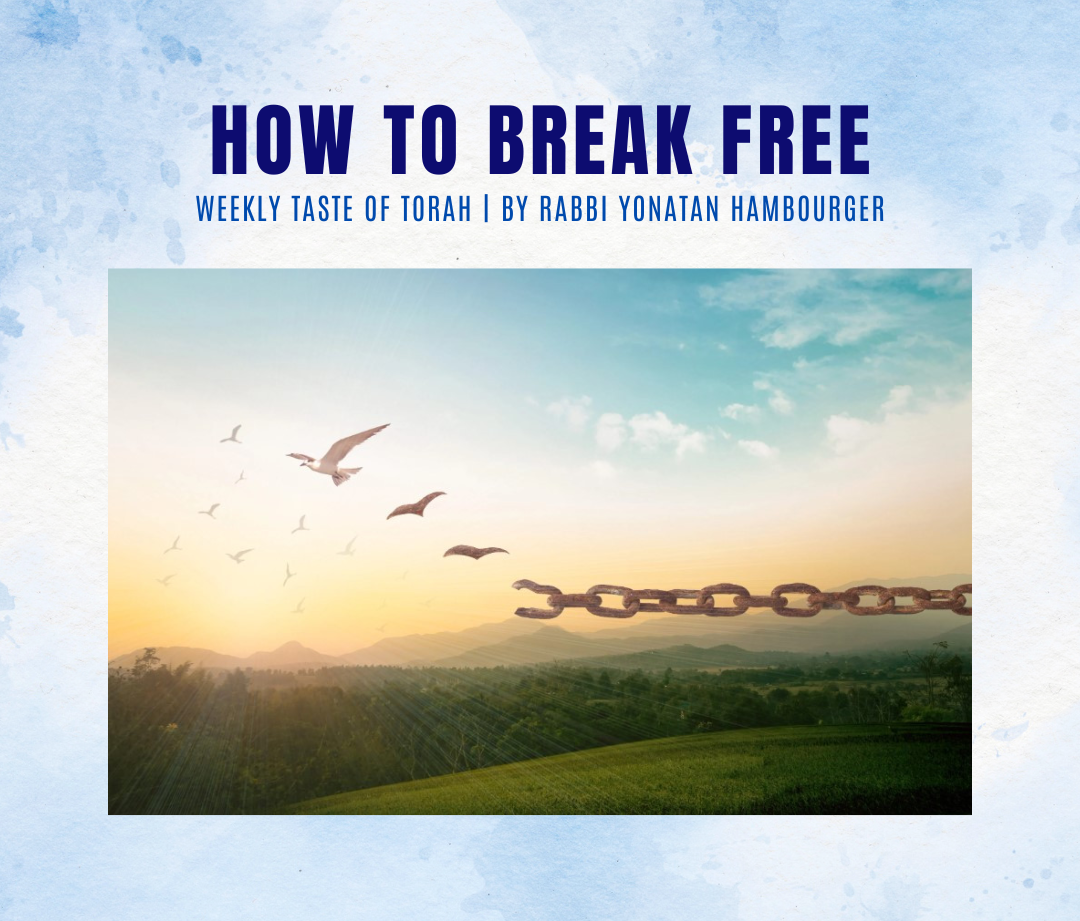
How to Break Free
In the Hebrew language every word has a root consisting of three primary letters. Most words that contain the same three primary letters share a relationship in terms of their meaning.
For example, the word for ‘Egypt’ in Hebrew is spelled phonetically in English, ‘Mitzrayim’. The three primary letters are “M”, “TZ” and “R” which also spell the Hebrew word ‘Meitzar.’
‘Meitzar’ is defined as a ‘constricting boundary.’ You see, our enslavement in Egypt was not only a place, but is also a state of mind. Egypt constrained us physically, but we constrain our own selves in a variety of unhealthy ways.
One person may be a slave to his ego, another to his lust, another to his anger, another to alcohol, and yet another to potato chips. Whatever it is that limits us is our personal “Egypt” and makes us feel insignificant and makes us forget what we can achieve.
Living as a slave in ‘Egypt’ makes us believe that we must blend into the overwhelming big world around us. It tries to convince us that the world is what’s real, and that our own souls and that G-d are fantasy.
This is why in our liturgy we are commanded to regard ourselves each and every day as if we were personally leaving Egypt. We won’t be free until we break free of our limiting beliefs and uncover our essential G-dly nature. From there, we become true partners in Creation, and our lives become miraculous!
Imagine how your life can change if you connect to this reality!
Wishing you an empowering Shabbat,
Rabbi Yonatan
January 11, 2024
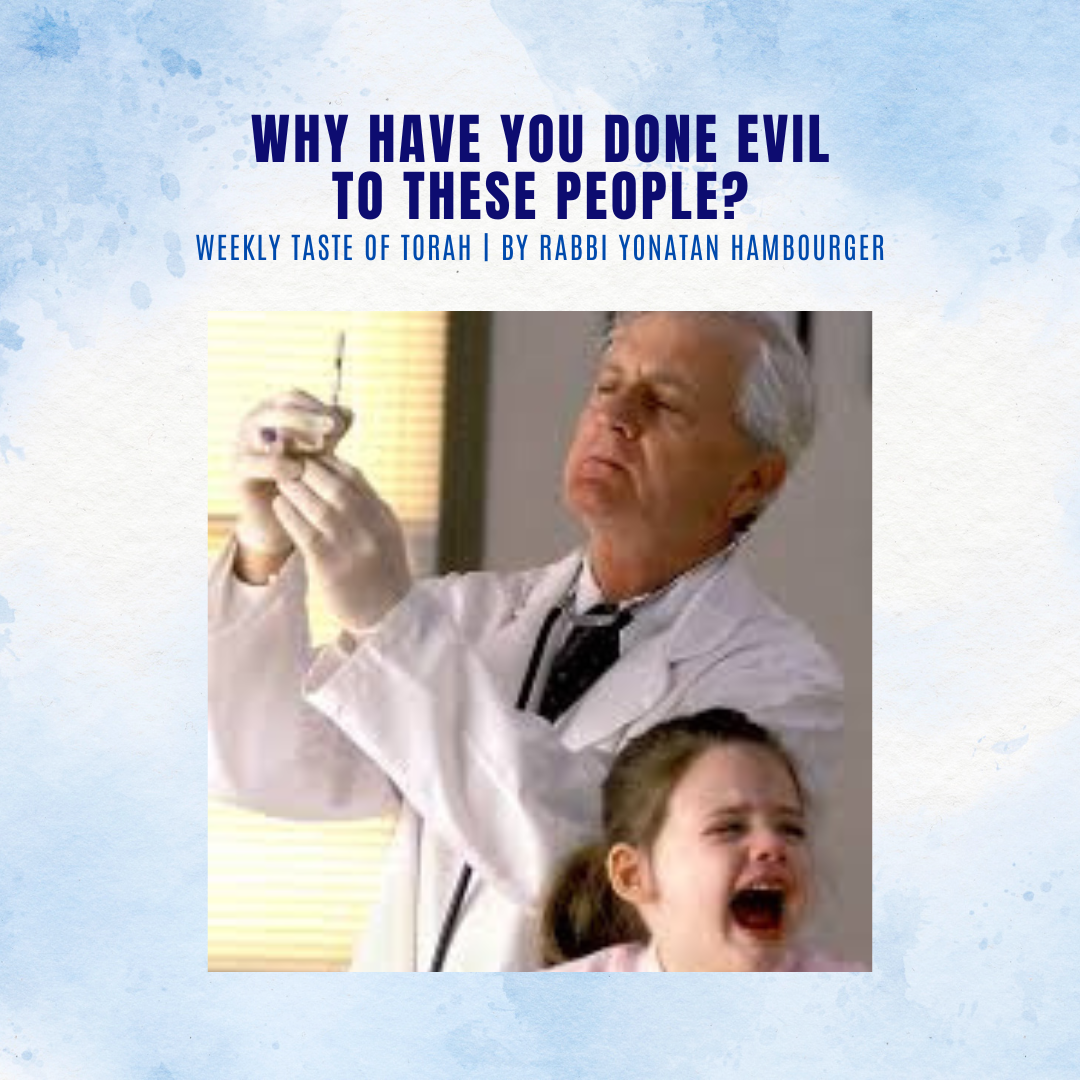
Why have you done evil to these people?
"Why have You done evil to this people? Why have you sent me,” complains Moses after G-d had previously assured him that he heard the cries of the Children of Israel, and that Moses would liberate them in G-d’s name.
Moses continues, ‘For since I came to Pharaoh to speak in Your name, he has done worse to this nation; and you have not saved them!" G-d assures Moses that it will all turn out well, & the rest is history!
The Lubavitcher Rebbe says Moses’ questioning was an act of faith of the highest order, for crying out, “Why have You done evil?” can only come from the mouth of a true believer. A non-believer can only shrug his shoulders at the universe.
Perhaps this parable from the late Rabbi Dr. Abraham Twerski about a mother who takes her toddler to the doctor, holds a key:
The doctor prepares an injection. The child doesn’t make it easy for the doctor, trying to get away until the mom has to hold him down while the doctor administers the injection. All throughout, the child is screaming.
Not a minute later the child buries his face in mom's arms, seeking solace in her embrace. But why? Wasn’t mom an accomplice when she held him down while the doctor attacked him? Why does this child suddenly find comfort in her arms?
Our Heavenly Father's relationship with us mirrors this dynamic. At times, we might experience pain and frustration and ask why He permits dreadful misfortunes. Nonetheless, we remain aware that His love for us is genuine and unwavering.
After all, we’re His children. We too can find consolation in acknowledging that G-d loves us unconditionally.
May G-d continue to protect our brothers and sisters in the Holy Land and deliver a decisive victory against all who want to harm us.
Shabbat Shalom,
Rabbi Yonatan
January 4, 2024

Birth Pangs
The contribution of the Jewish people to ancient Egypt is immeasurable. Joseph single-handedly saved Egypt and the rest of the world from starvation, and in the process turned Egypt into the superpower of its day.
The Egyptians gratefully acknowledged the Jews’ contribution to culture, art, medicine, and the economy.
This honeymoon lasted 140 years and then as we read this week, “a new king arose who did not know Joseph.”
Our sages interpret this to mean that the king did not acknowledge the Jews contribution, and enacted harsh edicts against the Jewish community, culminating in 70 years of enslavement, until our Exodus.
Such has been the story of our people throughout history. Time and again we have been welcomed for our wisdom and contributions, until ‘a new king arises’ who seeks to harm us, or worse.
Until the establishment of the modern state of Israel in 1948, Jews were thrown out of ancient Egypt, medieval Babylonia, and modern Europe. Between the year 250 and the year 1948—a period of 1700 years—Jews in Europe experienced an average of one expulsion every 21 years.
Which brings us to here and now in the U.S. where it feels like there is overt Jew hatred everywhere we turn. But we should temper our emotions with the knowledge that there is widespread affinity here for the Jewish people, and support for our brothers & sisters in Israel.
While we pray that it won’t come to this, we should thank G-d that Israel serves as a bastion of safety and support for all of us. In the meantime, this is our chance to stand up and be counted. Let us live as proud Jews and let us advocate for Israel.
The suffering which our people is experiencing now are the birth-pangs of a new era of light emerging from darkness; an era of pure goodness where the entire world will walk in His ways.
Wishing you a Shabbat Shalom,
Rabbi Yonatan
December 28, 2023
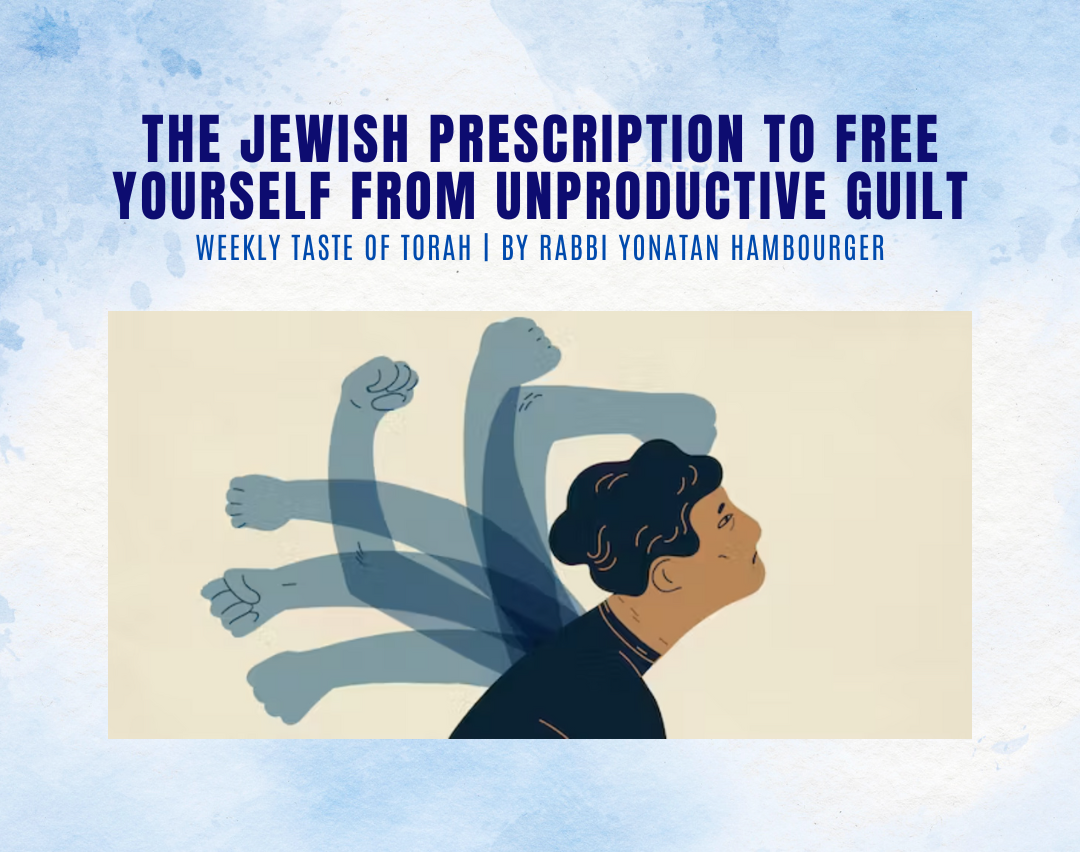
The Jewish Prescription to Free Yourself from Unproductive Guilt
Last week we discussed the themes of remorse and forgiveness vis a vis the Biblical Joseph and his brothers. Despite their atrocious behavior, Joseph forgave them and established a paradigm of forgiveness towards which we should aspire.
Joseph provided for his brothers and their families, and all flourished. But upon their father Jacob’s passing seventeen years later, the brothers feared, "Perhaps Joseph will hate us and return to us all the evil that we did to him."
So racked with guilt were the brothers, that they concocted a scheme to get Joseph to continue to act lovingly towards them. Joseph wept at this pathetic display and spoke to their hearts to reassure them he would continue to sustain them.
Is there anything beneficial about carrying guilt and shame for so many years? No!
At the core of Judaism is a prescription that gives us the opportunity to clean up our mess, no matter how ugly, and then Move On!
It worked for Adam & Eve after they ate the forbidden fruit, and it worked for the children of Israel after they worshiped the golden calf. Therefore, it can work for you also!
Here’s the prescription to free yourself from unproductive guilt:
Step 1: Say clearly out loud to G-d what you did wrong and how much you regret. Hearing your own voice will help extract the mess from deep inside so that you can throw it away forever,
Step 2: Fix up what you did by apologizing to the person you hurt. If they don’t forgive, try two more times (after that you’re off the hook according to Jewish law),
Step 3: Give a lot more charity than you’re used to giving. Charity heals the world, and your soul as well,
Step 4: Compensate for whatever happened by doing better, acting nicer, & learning more.
Wishing you a peaceful and blessed Shabbat,
Rabbi Yonatan
December 21, 2023
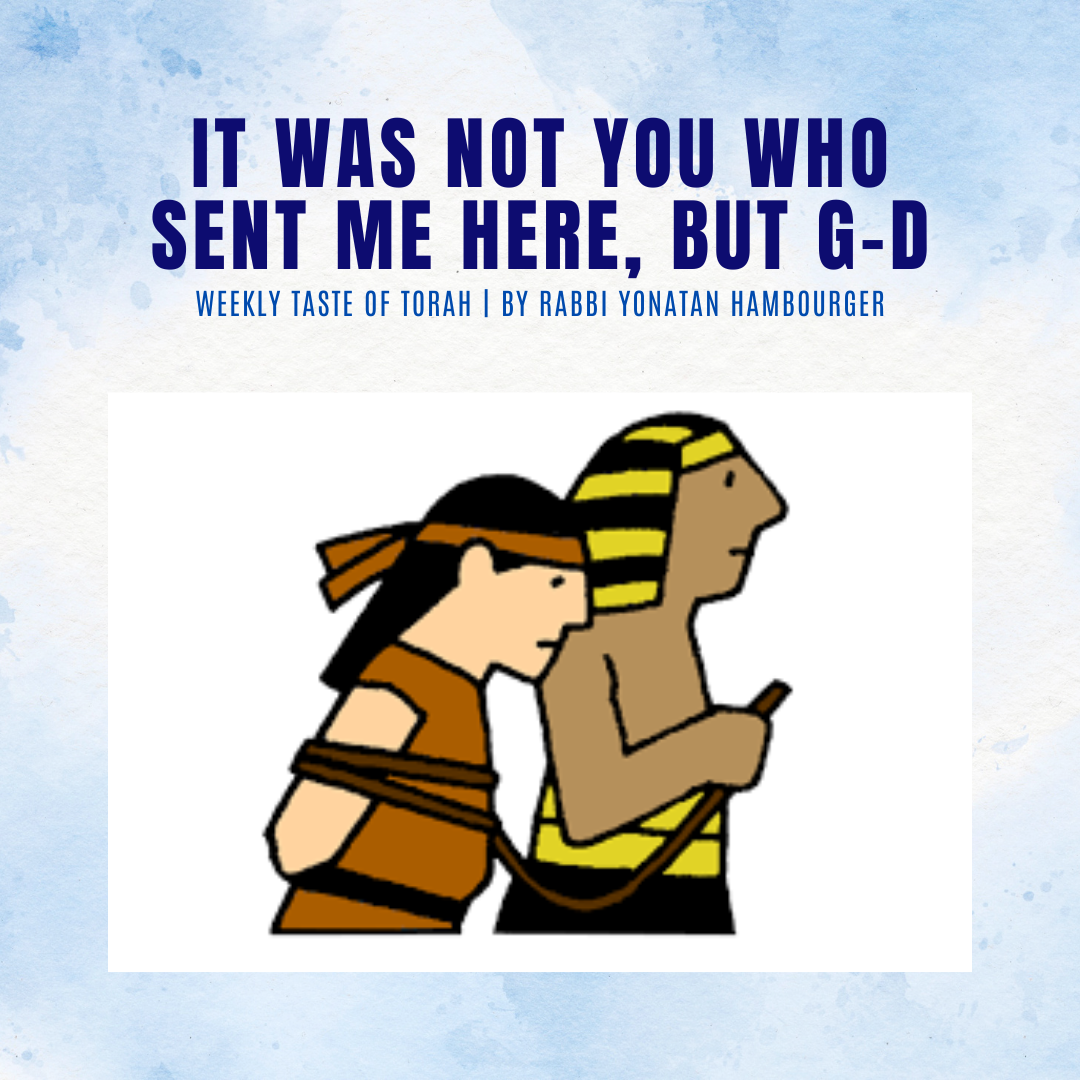
"It was not you who sent me here, but G-d"
Imagine you’re seventeen years old and your siblings all despise you. They conspire and sell you as a slave in a depraved and savage land.
Against all odds, you become wildly successful. Meanwhile, your siblings become completely destitute. You have the means to save the vary family that acted so horrendously towards you.
What do you do? Do you take your revenge and pay them back measure for measure? Well, here’s how our ancestor Joseph behaved in just such a situation over 3,500 years ago.
“Do not be upset with yourselves,” he says to them. “It was not you who sent me here, but G-d. It has all been ordained from Above to save us, and the entire region, from famine.”
Certainly, his brothers chose to act badly and are accountable to G-d for their actions. But, had his brothers not acted so, G-d would have employed any number of other means to enable Joseph to fulfill his mission.
Joseph understood that every event, no matter how seemingly negative, is part of G-d’s plan, and his brothers’ bad behavior was between them and G-d.
Our own lives are much richer when we focus on our mission rather than on our perceived mistreatment by others. Their bad behavior is between them and G-d.
Our ability to internalize this message, even to a limited degree, can free us from unproductive negativity. Let’s stop keeping score and let’s perform more acts of goodness and kindness.
Please pray for the welfare of our brothers and sisters in the Holy Land. May G-d grant us a decisive victory against those who wish to harm us.
Shabbat Shalom,
Rabbi Yonatan
December 14, 2023
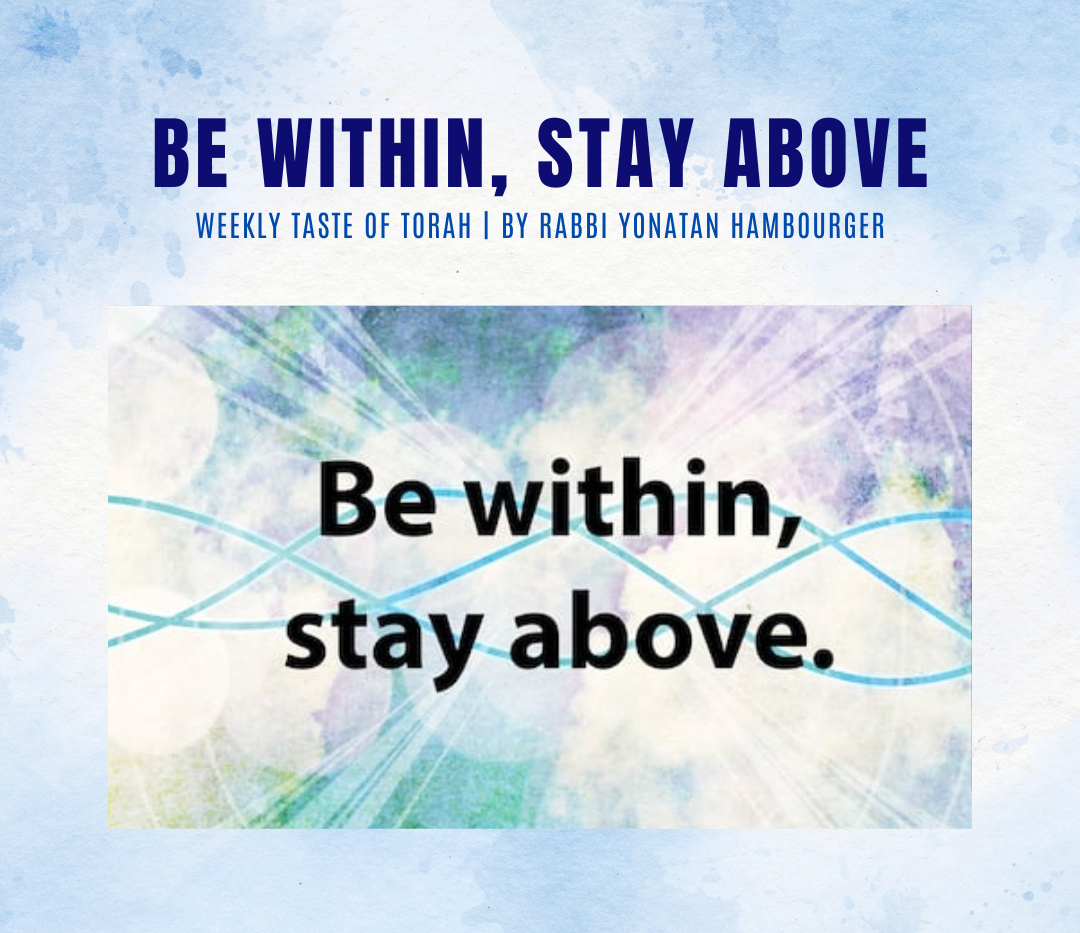
Some people remain faithful to their way of life by living exclusively amongst like-minded people, while keeping their distance from anything foreign.
Others, venture out into unchartered territory, confident that they will retain their cherished values, while even positively impacting those they encounter.
In this week’s Torah portion, we learn about our patriarch Jacob’s son Joseph and his eleven brothers, representing these two different orientations.
Each one was righteous but whereas the other brothers were shepherds who spent their lives in solitude and G-dly contemplation, Joseph became the ruler of the mightiest empire of the day, Egypt.
Despite all the seductive glitz and glitter, Joseph managed to stay completely faithful to his Jewish traditions. In fact, he positively influenced the depraved culture around him.
Obviously, it is much easier to stay true to Jewish tradition in the company of your own. It’s much tougher to practice your faith as a minority.
Yet, most of us live in socially integrated societies mixing-in many different circles.
The question is whether you believe you have a unique Jewish contribution to offer to the world around you?
If so, Joseph is the quintessential role model.
He showed us that we can maintain our Jewishness with dignity despite the challenges thrust upon us by a wide-open society.
Remember the words of the late, great, chief rabbi, lord Jonathan Sacks who said “non-Jews respect Jews who respect themselves!”.
Keep eating latkes and donuts thru this evening (and then stop!)
Please watch these extraordinary videos…
https://www.theyeshiva.net/jewish/c95/torah/holidays/chanukah.
Shabbat Shalom dear friend,
Rabbi Yonatan
December 7, 2023
Butterflies and Latkes!

Did you know that the flutter of a butterfly’s wings in Hoboken can cause a typhoon in Indonesia?
According to Wikipedia ‘the butterfly effect’ rests on the notion that the world is deeply interconnected, such that one small occurrence can influence a much larger complex system.
In this week's Torah portion, we learn about Joseph's life journey. He went from being his father's favorite child to being sold by his brothers and thrown into prison under false accusations.
Although he had been through a lot, Joseph didn't become angry or bitter. He cared about others and believed in his divine purpose, that everything happening to him was part of God's plan.
It was that belief in his divine purpose which enabled Josef to be sensitive to the despair of two Egyptian prisoners and went about cheering them up.
Because of his one small, good action, one of the prisoners unwittingly set in motion a series of events that would lead to Joseph becoming the ruler of Egypt, saving the world from starvation.
This story shows how a single act can make a huge difference. Like the flutter of a butterfly’s wings, one seemingly insignificant action can change the world.
When we light the first Menorah candle this evening, remember the power of one tiny light. Be the spark in someone's life and help them spread their own light to others who need it.
Wishing you happy Chanukah and many latkes!
G-d, please look upon your people and all good people with compassion and bring us to better times.
Shabbat Shalom,Rabbi Yonatan
To learn more about Chanukah, checkout:
November 30, 2023
A Kiss is Still a Kiss!
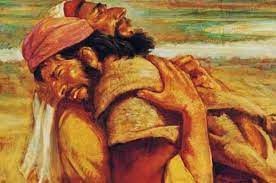
In this week’s Torah Portion, high drama unfolds as Esau is on the march with an army of 400 elite soldiers, hell-bent on murdering his brother Jacob.
Jacob preempts the attack by sending an emissary to greet Esau with a message, “I have lived in a depraved land and still maintained all of G-d’s commandments, and I did not learn from their evil deeds.”
Why would Esau, a villainous murderer care that Jacob was a ‘good’ Jew?
Yet, Jacob’s strategy was effective, and the brothers embraced and kissed and went their separate ways in peace.
This encounter teaches us how we should present ourselves to the world. Rather than try to find favor in the eyes of ‘the Nations’, we should express our Judaism proudly, for the world only respects Jews who respect themselves.
Now, what can each of us do to contribute to the Jewish peoples’ well-being? Do a mitzvah!
Every mitzvah has inherent value, despite our overall level of observance or education. As long as we do a little more every day, we are fulfilling our responsibility and our divine mission.
Women, start lighting Shabbos candles. Men, put on tefillin. Everyone, give money to a worthwhile charity in Israel! Reach out to me if you want help choosing a mitzvah.
Remember, we don’t do mitzvahs because we are religious. We do mitzvahs because we are Jewish.
Let us remain mindful that contrary to a certain fringe-but-loud minority, the United States of America continues to be a bastion of safety and security for our people. Even more so, our fellow Americans exude overwhelming friendship and support towards us.
Chazak v’emetz! Be strong and courageous!
Shabbat Shalom,
Rabbi Yonatan
November 22, 2023

These are trying times for our people.
American Jews have never experienced the level of antisemitism that is bubbling over from both the far-left and the far-right, causing us to feel squeezed in the middle.
Ironically it is when we are squeezed that our people always flourish, which is why we are likened to pure olive oil that reveals its true nature when crushed.
Our purpose, now more than ever, is to embrace the mission for which we were created… to use our pure oil to be a light unto the nations!
In this week’s Torah portion, G-d promises Jacob and his descendants (us) that “through you shall be blessed all the families of the earth…I am with you, and I will guard you wherever you go…”
The mightiest of civilizations have tried to destroy us, yet we have outlasted them all. Many of our holidays celebrate just such victories, including Chanukah, Purim, and Passover.
It may feel like there’s nothing you can do. But in fact, there is plenty.
Live as a proud Jew because the world respects Jews who respect themselves. Also, get educated and learn to advocate for the Jewish people. I hardily recommend that you join us for a two part zoom class starting next week, titled “Antisemitism, it’s root, our response.”
May we witness the time when G-d will remove the hatred within the human heart, and together, as one, we will all serve G-d. May this happen immediately, Amen!
Shabbat Shalom,
Rabbi Yonatan
November 16, 2023
Our Conflict Within

Many people act in ways that sabotage their own success in life.
Apropos, in this week’s Torah portion we meet twin brothers, Jacob & Esau who are representative of two opposing orientations within each of us.
Metaphorically, Jacob represents our G-dly drive whereas Esau represents our self-centered, animalistic drive. The inner conflict which most people experience can be sourced to each vying for supremacy.
If one does not experience this inner conflict, it means that one or the other orientation is fully in control, more often the self-centered one.
By allowing free rein to our ‘inner animal’, our lives tend to be messy and unfulfilling. But by asserting our inner G-dly drive, we harness our self-centeredness for positivity.
For example, when a rider successfully harnesses the power of his or her horse, he or she can accomplish things that wouldn’t be possible without the aid of the animal. So too, when we harness the power of our ‘inner animal’ to team up with our G-dly orientation, holiness shines brightly as we learn G-d’s ways, and we do good for others without judgment or calculation…
Our mission is to bring refinement to the world by recruiting our inner ‘animal’ to aid us as ambassadors of G-dly light to everyone we encounter.
May G-d grant us a decisive, miraculous, and immediate victory against the enemies of light and good.
Shabbat Shalom,
Rabbi Yonatan
November 9, 2023
Non-Jews respect Jews who respect themselves!
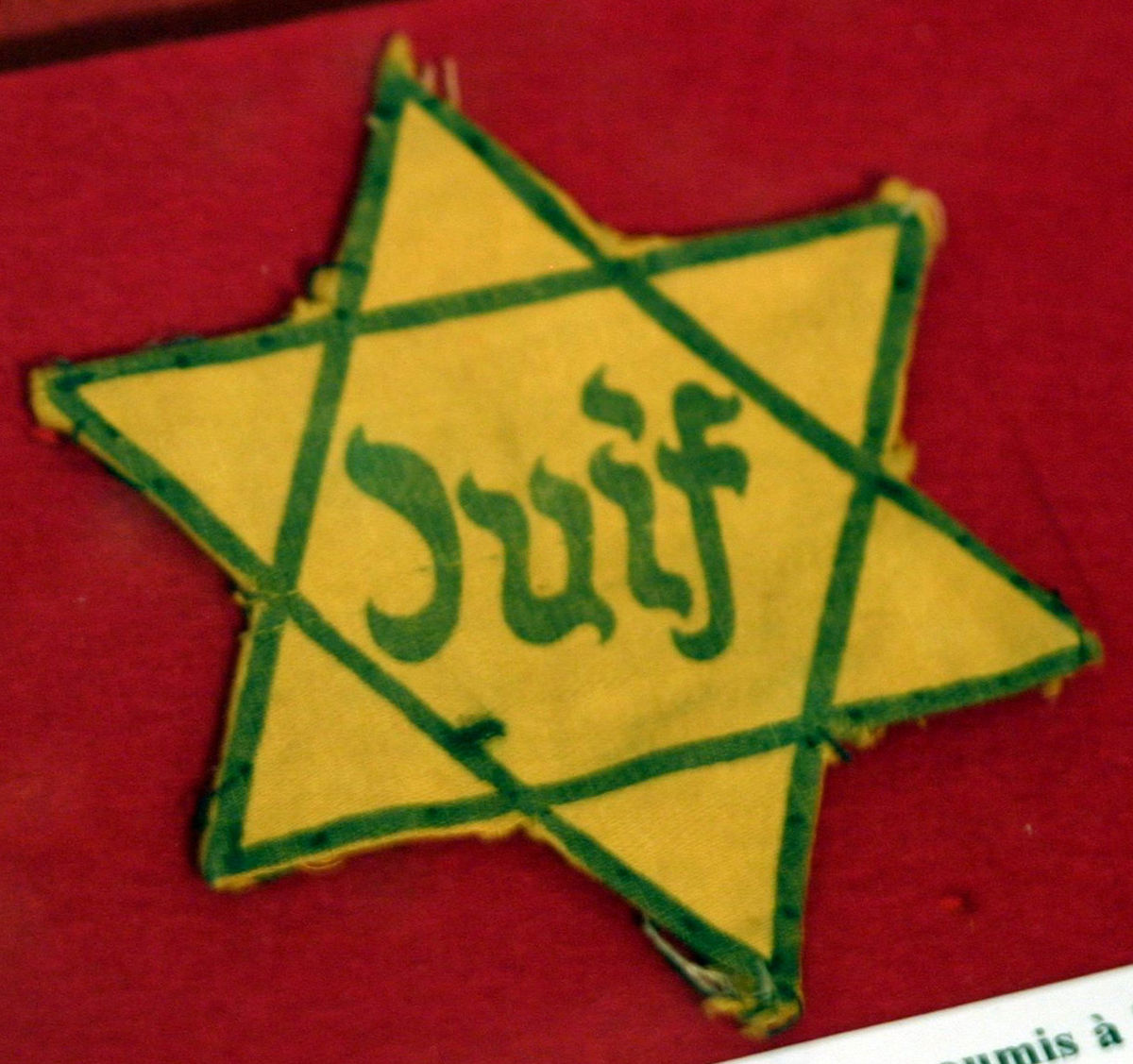
When the Nazis invaded Denmark, they decreed that all Jews must wear a yellow Star of David on their clothing in order to be easily targeted.
Legend has it that King Christian X went about town wearing such a star of David himself, and so inspired the Danish citizenry to do the same, thereby thwarting the Nazi edict.
Fast forward to a recent antisemitic attack in Los Angeles when a Jewish home was singled out for vandalism because of a mezuzah on the front door.
The Jews in the neighborhood were unnerved until their Christian neighbors decided to put Mezuzzahs on their front doors as well.
Over the centuries we have been accused of killing their God, using their children’s blood to bake our matzah, controlling the world’s banking system, and spreading covid.
First, they told us to get out of their countries, and now they tell us to get out of “Palestine”.
They wish the Nazis finished the job, yet they deny that the Holocaust ever happened.
There is only one response; to live as proud, confident Jews, trusting in G-d.
As the late Rabbi Lord Jonathan Sacks said, “non-Jews respect Jews who respect themselves!”
Do a mitzvah today. If for no other reason, do it to spite the anti-Semites!
Let me know if you are ready to stand in solidarity with your brethren by placing a mezuzah on your front door. Sponsorships are available based on need.
May G-d grant a swift, miraculous and complete victory over our enemies.
Shabbat Shalom,
Rabbi Yonatan
November 2, 2023
This is the Jewish people! We’re awesome!

At 7 a.m. on Saturday, Oct. 7, air-raid sirens blared in Ofakim, a town in southern Israel about 10 miles from the Gaza Strip.
Rachel Edri describing the moment Hamas terrorists infiltrated her home on Simchat Torah, “They had grenades, Kalashnikovs and what-not.”
Rachel, a mother, and grandmother, was terrified but remained level-headed, trying to keep the terrorists calm, played host, as she later admitted in an interview: “I told myself, ‘I have guests.’”
“Did you eat? Would you like a coffee or tea? I will make it for you,” she offered the terrorists as they held a grenade to her head. Rachel later told ABC news that she “knew that if they are hungry, they are angry” and so made them chicken and offered them cookies.
“I fed them, I chatted with them, ‘How old are you? Where are you from?’” One of the terrorists was hurt, and Rachel even bandaged his wounds, sitting with him and stroking his hand. “I was trying to distract them so they wouldn't kill us. I also did not want them to get hungry and irritated.”
Rachel acknowledged that throughout the ordeal she did not always expect to come out alive. “We said Shema Yisrael, I thought there’s no way we are surviving this.”
Some 20 hours later, close to 2 a.m., Israeli special forces dropped through the ceiling of the shower and shot the terrorists dead. “They were right next to us. It’s a miracle they managed to kill them and get us out,” Rachel says. “They are our lions, our heroes.”
Within hours, Rachel became a national sensation, the subject of memes and a guest on daytime TV shows. Her grit, faith, and level-headedness were lauded by a nation hungry for good news and viewed as a harbinger of good things to come.
Before Shabbat, Rachel had a special message for Jewish women and girls around the world: “The real ammunition is in your hands, calling on all Jewish women to light Shabbat candles in honor of Israel and the defense forces. “With Gd’s help, all the hostages will return home …
So my dear friends, take it upon yourself to fill the world with more light, and here’s Rachel’s now famous cookie recipe: https://www.chabad.org/recipes/recipe_cdo/aid/6133830/jewish/The-Cookies-That-Helped-Save-Rachel-Edri-From-Hamas-Terrorists.htm
This was condensed from an article written by Mendel Super on Chabad.org.
G-d, smile down upon your people with compassion and end our suffering immediately.
Shabbat Shalom,
Rabbi Yonatan
October 25, 2023
The one on the other side

In this week’s Torah portion, we meet Avraham, the first Jew. The Torah refers to him as ha’Ivri, “the Hebrew.” The term literally means “the one on the other side,” suggesting that Avraham was on one side and the entire world on the other.
Avraham earned this title because he established a relationship with the one G-d despite being raised and inculcated in the polytheistic paganism of his surroundings. As a result G-d promised Avraham that the Jewish people would inherit the land of Israel for eternity and that they would be directly under G-do’s providence.
The Jewish legacy of “standing on the other side” still applies today. Although not everyone blames us for the savagery of our enemies, many try to establish a moral equivalence between Hamas beheading our babies and executing our grandmothers and Israel’s determination to neutralize the perpetrators. The politicians, academics, student groups, journalists, and commentators who don’t see the difference are on one side, and we are on the other.
G-d goes on to tell Avraham, Lech Lecha which means “Go to yourself”; go away from the prevalent culture that inverts the truth and go towards the truth that Am Yisrael Chai, the Nation of Israel lives!
Do not allow yourself to doubt or be confused. Don’t be intimidated by what you read and hear.It will all work out for our best, speedily in our days!
Shabbat Shalom and G-d bless you and all the Jewish people,
Rabbi Yonatan
October 19, 2023
Is your ark watertight?

This week we read in the story of Noah and the Ark, how humanity had sunk into an abyss of moral depravity.
The one notable exception was Noah, “perfect in his generations,” who was tasked by G-d to build an ark to save his family as well as every species of animal from the coming deluge.
What you may not know is that even after G-d decided to flood the Earth, he gave everyone ample opportunity to change their ways and live.
The sages tell us that even after the downpour started people could have transformed the destructive storms into rains of blessing, but they remained hard-hearted.
When they left the ark, Noah and his family were charged with re-building humanity based on G-d’s original plan for Adam and Eve. They were provided with a set of ethical laws for all human society, for all time.
These laws established universal codes of decency including the acceptance of and accountability to a single Creator who cares about what human beings are doing, as well as:
The establishment of the family framework; the enforcement of law and order; and prohibitions against murder, theft, and cruelty.
These G-d given laws are compatible with every belief system and religion and provide a blueprint for how all of humanity can dwell together as brothers.
There are destructive rains in every generation, not just during the time of Noah, representing various anti-spiritual influences. They may appear harmless at first, but ultimately can destroy the very fabric of society.
Each person, each family, each community must make sure that their ark is watertight, by embracing G-d’s wisdom as established in these laws.
But it’s not enough to keep darkness out.
Each of us must encourage the light within to shine outward and transform the surrounding darkness into G-dly light.
All that’s missing is to embrace the common ground found in G-d message of humanity’s purpose.
Wishing us all good news. Shabbat Shalom,
Rabbi Yonatan
October 12, 2023
Would you like that apple pie, ala mode?
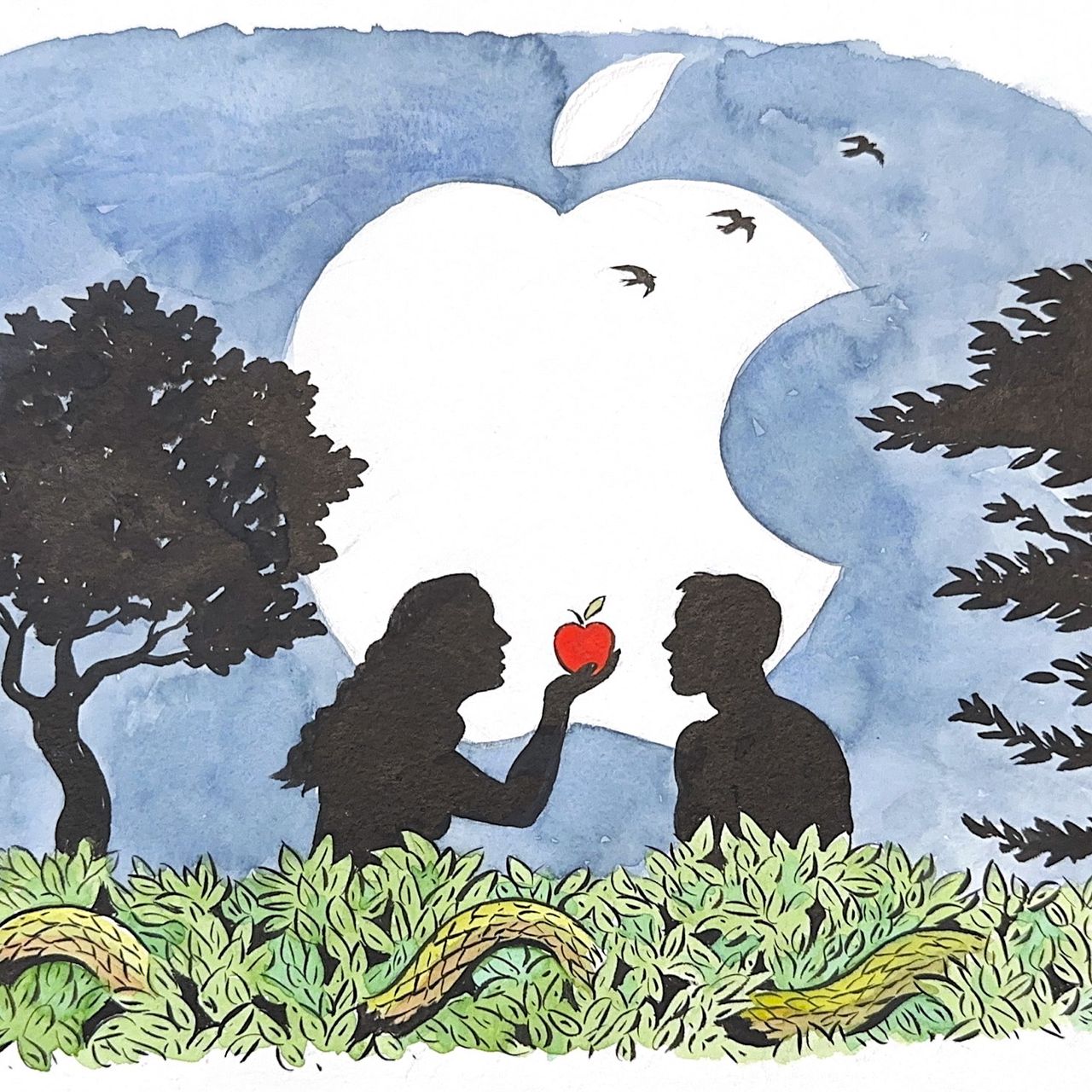
This week we start the Torah from “the beginning” and we revisit the Garden of Eden with the bite heard ‘round the world, still reverberating through the present day.
Despite being furnished with everything they needed to live in paradise, with just one little condition not to eat the fruit of a particular tree, Adam and Eve seemingly couldn’t resist!
These were perfect human specimens fashioned by G-d himself! Couldn’t they control their desires
The fact is they made a fully informed decision to trade paradise for toil, struggle, and certain death, not just for themselves and their family, but also for all of humanity.
But Adam and Eve didn’t want a perfect life given to them and all their descendants. Rather, they chose a life challenged relentlessly by darkness, lust, and envy!
Maybe they knew what they were doing, and they chose wisely, for people handed life on a silver platter seldom realize their full potential.
But thanks to Adam and Eve, humanity was gifted with a mission to bring heaven down to earth and transform G-d’s creation back into a garden.
Yes, there are thorns and thistles, struggle, and pain, along the way but also the satisfaction of one’s own efforts on his way to accomplishing ultimate good.
Only with the coming of Moshiach (speedily in our days) when the world reverts back to the perfection of the Garden of Eden, will we fully appreciate the fruits of our labor.
Most definitely a more challenging path, but also incomparably more rewarding.
Meanwhile, it’s only fitting to celebrate with a slice of apple pie ala mode!
Good Shabbos,
Rabbi Yonatan
October 5, 2023
Rock On!

When people are happy, they dance…
It could be the Twist or the Watusi, but nothing comes close to the joy we experience from the nonstop dancing we engage in at the climax of this month of holidays known as Simchat Torah, this coming Saturday night and Sunday.
Why is dancing such an expression of joy?
Our Sages tell us that the human body is divided into three parts; the head, which is the seat of our intellect, the heart, which is the seat of our emotions, and our lower extremities which represent our actions.
True happiness is derived when we take our intellect and our feelings and direct them into tangible action.
On Simchat Torah, we gather all our lessons, experiences, and inspiration from Rosh Hashanah, Yom Kippur, and Sukkot and apply them to creating an amazing year.
This is precipitated by moving our feet while dancing with the Torah on Simchat Torah!
But hold on!
What about those of us who didn’t understand, didn’t feel, and didn’t have any positive experience whatsoever during this holiday season?
Just lift-up your feet and do something positive because your head and the heart will follow the action!“Rock On” this Shabbos and Simchat Torah!
Rabbi Yonatan
September 27, 2023
Party On!

During the month before Rosh Hashanah, we made good resolutions, gave extra charity, and tried to connect with G-d in a meaningful way. Rosh Hashanah itself was the day we accepted G-d as our King and beseeched Him to inscribe us into His book of life, health, and prosperity. On Yom Kippur, we fasted for 26 hours and atoned for our misdeeds while resolving to improve ourselves.
Immediately after breaking our fast, with one hand grasping a bagel and cream cheese, we began building a Sukkah in our backyard to prepare for Sukkot, which starts this Friday evening and lasts a week. A sukkah is a temporary hut with a roof made from tree branches. Sukkot is known as the Time of our Joy. Throughout the holiday, we invite friends and strangers to join our celebrations filled with food, drink, singing, and dancing. Think of it as a Jewish hootenanny!
Our transition from the solemn High Holidays to the festive Sukkot reminds us to apply the good resolutions we made into reality. Lasting change can only be achieved through joy. Having developed a deeper connection with G-d and strengthened our relationships with loved ones, we can now truly experience the joy and unity that Sukkot represents.
There are two mitzvahs associated with Sukkot: having a “nosh” (a snack) and making l’chaim (cheers) inside a Sukkah; and performing the mitzvah of Lulav and Etrog by holding palm fronds, willow, myrtle, and citron together with a blessing. If you want to participate in these mitzvahs while celebrating with new friends in a Sukkah, I will endeavor to connect you to someone within drive-time of your home.
No matter what, you have undoubtedly already secured an amazing year for yourself and your loved ones. So, let's start celebrating this Shabbos and continue throughout the following week, and the entire year!
Party on!
Rabbi Yonatan
September 20, 2023
Did you ever meet a JewBu?
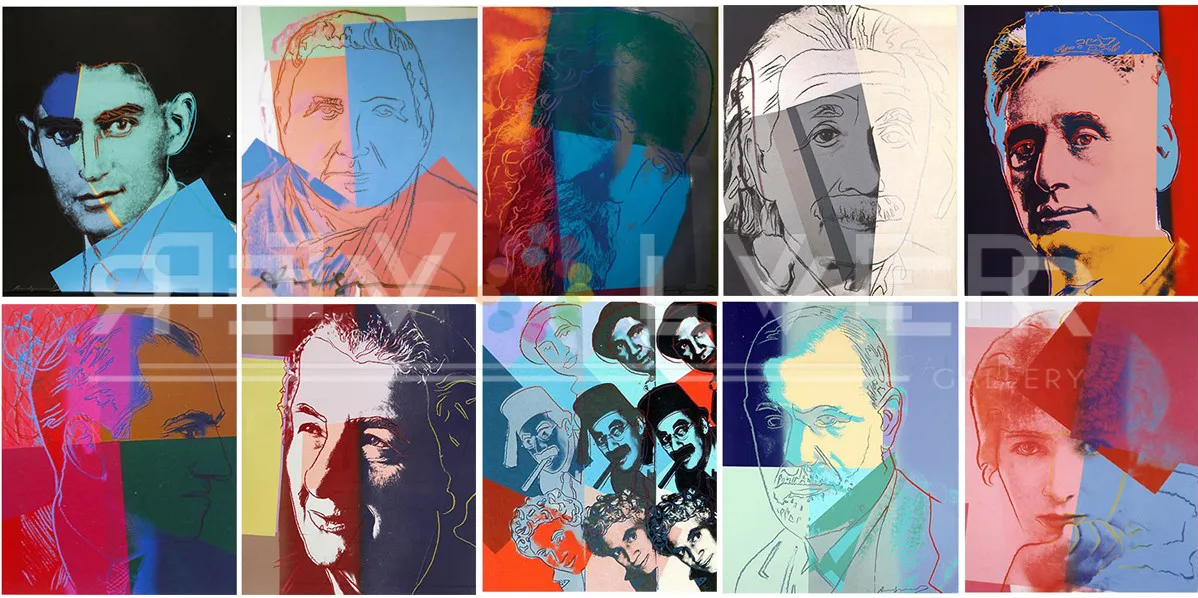
Do you believe in miracles? Perhaps witnessing one might change your mind.
Visit a synagogue during Yom Kippur (Sunday evening through Monday night), and you'll experience a miracle firsthand.
You might find yourself among non-observant Jews, Jewish atheists, JINO’s (Jews in name only), Jewish Bundists, Jewish Buddhists (JewBu’s), Jews with multiple pronouns, pierced and tattooed Jews, Skinhead Jews, and Jewish anarchists.
What could unite such a diverse group, and what are they hoping to gain from the experience?
It so happened that someone complained to the Lubavitcher Rebbe, 'How can it be that such a respectable Torah figure as yourself gives any sort of attention, no less honor, to non-religious Jews?’
The Rebbe replied, 'If a non-observant Jew wakes up Yom Kippur morning, shaves, makes a cup of coffee, turns on the radio and hears the announcer say, "Today is the Jewish Day of Atonement,"
Suddenly he runs out of the house to his car, drives to the Synagogue, runs inside, takes his seat, and opens his prayer book for fifteen minutes.
Suddenly he slaps himself on the forehead and yells out, 'Oh no! I'm late for a business meeting!' closes his prayerbook and runs out.
Concluded the Rebbe: 'You have no idea how much pleasure G-d gets from those fifteen minutes that he sat in the Synagogue'.
This is the miracle! Jews of all stripes are stirred up, not out of fear of punishment or reward, but rather because they feel that G-d (who some profess not to believe in) has faith in them to improve and to improve the world!
It's incorrect to label Jews as religious or non-religious. We are all believers by birth, the children of believers. External and internal factors may distance some of us from our true selves, but everyone’s heart remains open to Torah and mitzvahs.
And that’s why you are apt to meet so many interesting people and make so many new friends this Yom Kippur! Please let me know who you sat next to!
You should be sealed in the book of life for exclusively great stuff in this new year, and always!
Rabbi Yonatan
September 13, 2023
Divine GPS

Ever thought you knew where you were driving, only to find yourself completely lost? Before the advent of GPS, you just had to wander around until you figured it out yourself or rely on the advice of strangers who would often send you off the wrong way.
Nowadays you just tell your car or your phone where you want to go, and, if you take a wrong turn, it tells you “Rerouting,” giving the best plan forward, often with options.
No matter how lost or miserable people’s lives become, most folks only make course corrections when their lives become unbearable. then in a panic, they seek advice from the wrong people, and end up just spinning their wheels.
Luckily, Judaism offers a ‘GPS for the Soul.’ Activate it by asking G-d for directions, and the Divine GPS will help you establish your sense of direction and reroute you.
The first time you used GPS, you probably didn’t believe it would really lead you to the closest Dunkin’ Donuts in Omaha. Now it’s second nature, and you trust it.
So, dear friend, G-d loves you just as you are. Suspend (even temporarily) any cynicism or lethargy which may be holding you back. Just use the Divine GPS app to establish or strengthen your connection. Remember, it is voice activated!
Wishing you buckets and barrels overflowing with blessings this coming year and always,
Rabbi Yonatan
September 7, 2023
Final Preparations

If you could make some tweaks to the overall “you,” that would draw down tremendous blessings for the coming year, would you? Well, this last week leading up to Rosh Hashanah affords us just such an opportunity.
Now is the time to connect to G-d, before He leaves the field and returns to the Throne to dole out our “blessing packs” for the new year.
The first step is to release any residual negativity. Just as this period was used by Moses to beseech G-d for forgiveness after the sin of the Golden Calf, this is the time for us to work on forgiving ourselves and others.
That doesn’t mean we ignore the hurt, but we must let go of the anger by seeing beyond the limits of our own (and the other guy’s) personality. This helps us develop the kind of compassion we’re asking G-d to grant us.
The second component of preparation to “greet the King” is spiritual stock-taking to get in touch with the essence of what’s important in life. We can do this by acknowledging our mistakes and missed opportunities.
Yes, it’s much easier to focus on moving forward, but if we really want our future to be better than our past, we must take a long and hard look because “there is nothing so whole as a broken heart.” Becoming whole is a process that cannot occur without first feeling broken. So, whatever hurts is really a blessing in disguise.
May you experience overflowing buckets of revealed blessings in your life in the New Year, and always!
Happy New Year and Good Shabbos!
Rabbi Yonatan
August 31, 2023
Reach Out and Touch Someone, Everyone!
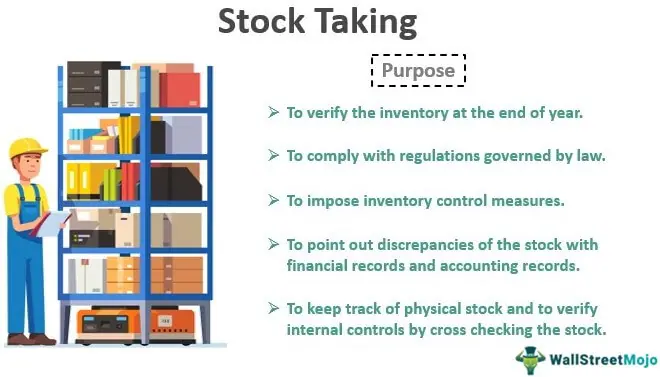
During the ten days from Rosh Hashanah until Yom Kippur, our fate for the following year is sealed. Who will live, and who will die? Who will be healthy, and who will be infirm? Who will enjoy well-being and who will suffer tribulation? Who will be poor and who will be rich?
Thankfully, any harsh decree can be averted, and here’s how. Use this time to pray to the Almighty. If it’s been a while or if it feels weird, just talk to Him the way you would speak to the best version of your dad. After all, He is your Father in Heaven.
It’s also a good idea to give lots of extra charity, and not just money. Uplifting people with your words and actions is also charity, and it’s cherished by G-d.
And it is best practice to spend the days leading up to Rosh Hashanah taking stock of your thoughts, speech, and actions over the past year, just like a merchant takes inventory of his store and balances his books.
A story is told of a man who owned a chain of stores. Each year he would balance his books and then visit each location to see which stores had too many or too few staff and which stores had too much or too little inventory.
At one store that seemed to have too many staff, he wanted to lay off a certain employee. But the manager said that if he let that person go, he might as well close the store.
Why? Because that employee greeted each customer warmly and gave each one a good word. He created a happy atmosphere, which made people want to come back.
This coming year, please G-d, there will be no layoffs, and everyone will be well-stocked. Even if someone is supposed to be sent home, by bringing joy to everyone around us, the angels in Heaven will say, “we need him on earth. He spreads happiness, he makes people smile, and makes them feel good!”
So, reach out and touch someone, everyone!
Shabbat Shalom U’Mevorach!
Rabbi Yonatan
August 23, 2023
Wanted Kishka!
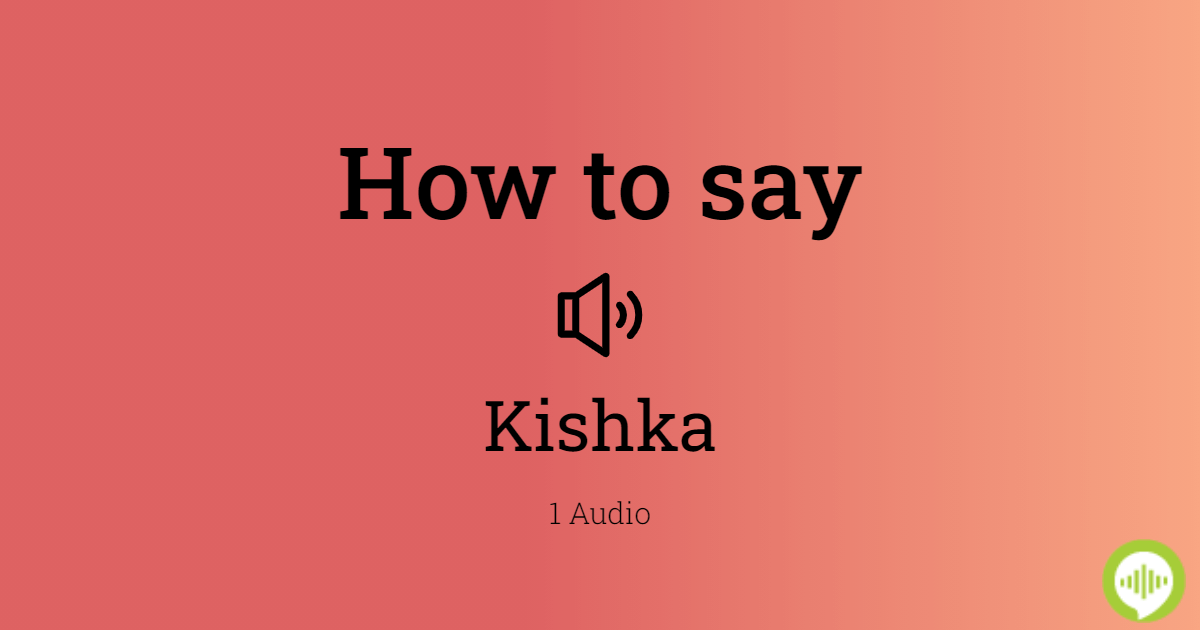
In keeping with last week’s theme that the time is ripe to clean up some of our “whoops” behaviors and form a more real relationship with our Father in Heaven, and to cash-in on more blessings in the coming year, I’d like to share the following story…
The Kaiser of the Austro-Hungarian Empire came to visit the Czar of Russia on official state business. The Czar spared no expense preparing a formal dinner with all the pomp and circumstance, including having his very best chefs prepare the most delicious food.
One of the chefs was Jewish, and he made Kishka! If you don’t know what Kishka is, you haven’t lived. It’s a mixture of flour, oil, and 11 secret herbs and spices, baked in the intestines of a cow.
The Kaiser loved the Kishka and asked for the recipe, so his personal chefs could prepare it. But back home when the Kaiser’s chefs served up the Kishka, it reeked of the foulest odor you could imagine.
The Kaiser was furious with the Czar until they figured out what happened. It turned out the Czar’s chef didn’t realize he had to instruct the Kaiser’s chef to clean the intestines of all the excrement before stuffing the Kishka with the tasty filling.
So too, in the month leading up to Rosh Hashana, it’s good to think about how to improve and to make good resolutions. But first its best to home in on any behavior that needs cleaning up. Otherwise, the stuffing (good resolutions) may reek like a vile smelling Kishka!
I sincerely hope you use this auspicious time to connect on high with your Heavenly Father who is anxiously waiting to hear from you. Also, if you’ve never tasted Kishka, you should add it to your bucket list. FYI, today, Kishka is made from synthetic casing, but it is still yummy!
Have a yummy Shabbos,
Rabbi Yonatan
August 16, 2023
The King is in the Field

Rosh Hashanah, commencing year 5784, is exactly thirty days away. On this anniversary of the creation of Adam and Eve, G-d allocates each of our personal blessings for health, children, love, and money for the following year.
During the period leading up to the holiday, God makes himself easier to approach. He is less like a king on a palace throne than a king who is traveling throughout the countryside to meet his subjects. The Alter Rebbe likens him to a “king in the field.” so run up and tell Him you wanna connect!
How do you do that? Here’s one way:
• Write down each of your “less than wonderful” actions over the past year.
• Be sure to acknowledge and write down your good deeds as well!
• Feel the remorse over your less-than-stellar behavior, but never regret who you are.
• Resolve to not repeat those mistakes!
• Confess your mistakes out loud to your Father in Heaven. It’s not enough to think about it. Your lips need to be moving. (Verbalizing our regrets and resolutions to do better makes it personal and real.)
This process can open your heart and free your soul to experience a deep and loving relationship with your Father in Heaven. That in turn will allow you to experience incomparable joy because now your soul is released from captivity.
G-d should Bless you abundantly in all of life’s domains.
Shabbat Shalom, and a Good & Sweet New Year,
Rabbi Yonatan
August 8, 2023
Get Out of Dodge

In Moses’ second farewell address to the Jewish people, he recounts that “since you were commanded to go out of the land of Egypt in haste, there was no opportunity for your dough to rise.”
When the moment of liberation struck, we didn’t lose a moment, “not even the wink of an eye!” In fact, our sages tell us that had we missed that auspicious moment, the opportunity for liberation would be forever lost. Perhaps, this was the source of the term: “Get out of Dodge?”
Paradoxically, the Egyptians had just underwent G-d’s wrath in the form of ten devastating plagues, culminating in the death of all their first born. They were all too happy to see us go. So, how could our liberation be in jeopardy?
The danger was not that the Egyptians might change their minds. Rather, the danger was that some of the Children of Israel might change their minds, having become accustomed to the Egyptian way of life.
So too, we must guard against complacency with the status quo. Exodus from Egypt was non a one-time historical event. Rather, the root of the word “Egypt” in Hebrew shares the root of the word for “bondage.”
In our day-to-day lives, we must each contend with our own “inner Egypt,” which is one reason why we reference the Exodus in our daily prayers repeatedly each day.
Our job is to break free from anything that causes us to be subservient to the ‘animal’ within, or our materialistic environment without.
Let us each seize the opportunity to achieve personal liberation and to help others do the same. May we free ourselves from all of our undesirable and self-limiting thoughts, feelings, and actions.
Above all, let us not be satisfied with the status quo, nor give into the pressure to conform to the pressures of the prevalent culture around us.
Wishing you a liberating Shabbat,
Rabbi Yonatan Hambourger
August 3, 2023
The Best Insurance

This week’s Torah portion commands us to affix a Mezuzzah on the doors of our homes and businesses.
Read on and you will find out how a Mezuzzah is the Ultimate Security!
A Mezuzzah is a small parchment inscribed with the words of the foundational “Shema” prayer, handwritten by an expert scribe.
The first sentence of the prayer is known by Jews the world over: “Hear oh Israel, the Lord is G-d, the Lord is One.”
A Mezuzzah provides physical and spiritual protection for the entire family. It also reminds us of our connection to G-d and to our people.
The decorative case that surrounds the Mezuzzah might be a work of art, but the inside is what counts. A rolled-up photocopy does not achieve the desired result.
Here’s an amazing story from the Jerusalem Talmud which literally says it all…
King Artavan of Parthia once sent a precious pearl to Rabbi Judah who was a leader of the Jewish people about 2,000 years ago.
He expected Rabbi Judah to reciprocate with something of similar value, but instead Rabbi Judah sent a Mezuzzah for the king’s front door!
The king was more than a bit miffed!
Thereupon Rabbi Judah explained that whereas he would constantly have to guard against theft of this precious pearl,
the Mezuzzah would continually guard the king and protect him!
So dear friend, if you don’t have a Mezuzzah on your door, let me know. If you have a Mezuzzah but haven’t had it inspected in a while, let me know.
G-d promises that anyone who carefully observes the commandment of Mezuzzah will lead a longer, richer life, as will his descendants!
Wishing you a Shabbat filled with delight,
Rabbi Yonatan
July 27, 2023
When Your Toast Hits the Kitchen Floor “Jam Side Up”

So, an old joke goes like this… a guy who’s late for an important appointment is driving around the block for the umteenth time looking for a parking space.
In utter desperation he cries out to G-d: “Father in Heaven, if you provide a parking spot for me right now, I will donate $1,000 to charity”!
Just as the words leave his lips, a spot becomes available & he says: “Never mind G-d, I can take care of this myself”!
In this week’s Torah portion, Moses knows he has just another month before G-d takes him from us.
He tries to impart all sorts of advice so that we can avoid lapses of good judgment, thereby sparing us from future tragedies.
Moses famously says: “Beware, lest you forget the L-rd who brought you out of the land of Egypt, out of the house of bondage”.
Moses reminds the Jewish people to “always be grateful” knowing that it’s human nature to ease up when things are going well in life.
It’s typical when people have tsuris (troubles) that they beseech the Almighty for their needs.
Moses is reminding us that when we are skating down easy street & all the traffic lights are green, G-d remains the source of our good fortune.
Moses is teaching us that sometimes (G-d forbid) only a reversal of fortune allows us to wake up and smell the coffee, in order to remember that it is G-d who is the source of all of our Blessings!
May we experience only good fortune and not forget the source from where it comes.
Wishing you a stupendous Shabbat,
Rabbi Yonatan
July 20, 2023
From Tears of Sadness, To Tears of Joy!

The Code of Jewish Law instructs us to decrease in joy during the nine-day period leading up to the saddest day of the year, known as Tisha B’av.
This year, the first of the Nine Days falls out this Wednesday evening, July 19th and continues until the night of Tisha b’Av which is Thursday, July 27th.
Tisha b’Av commemorates many historical tragedies that befell us on this date, most significantly the destruction of both our Holy Temples.
On Tisha b’Av we fast, and we sit on the floor in the synagogue with the lights dimmed low, reciting the book of Lamentations.
A story is told that on the night of Tisha b’Av, Napoleon Bonaparte was strolling with his entourage in his capital city of Paris.
Low and behold he heard crying and sobbing coming out of a dimly lit synagogue.
He sent his aide to inquire. He was told that the Jews were mourning the loss of their Holy Temple.
So moved was he, that Napoleon instructed his aide to re-enter and tell the Jews that he would personally provide the funds to rebuild their Temple.
The aide explained to the emperor that the Holy Temple was in Jerusalem, and it had been destroyed over 1,700 years ago! To this, Napoleon reportedly said:
“If indeed this people is mourning their Temple after almost two millennia, such a people so attached to their history, will indeed be restored to their land and their Temple rebuilt.”
The Rebbe emphasizes that we are required to serve G-d with joy. Therefore, we spend the minimum required time focused on the litany of tragedies from our long history.
We use the rest of our time learning about the spectacular third and final Holy Temple to be rebuilt with the advent of the Messianic era, may it take place speedily in our days!
May the time soon come when we look back with the clarity of hindsight to see how all our suffering was but a prelude to happiness and goodness, with the coming of our redemption. Amen!
All aspects of mourning are suspended on Shabbat, so have a blast!
Rabbi Yonatan
July 13, 2023
A Fitting Place for Holiness to Hang out!

The Children of Israel’s approach to the Land of Israel did not take them near the kingdom of Midian. The Midianites understood that the Jews had nothing against them and wanted nothing from them.
Yet, Midian came out to scheme and battle against us despite the fact there was nothing whatsoever to gain. They caused us lots of casualties and lots of grief.
It’s no wonder that the name “Midian” shares an etymological root with “irrational hatred.”
Which brings us to this week’s Torah portion when the Children of Israel are given one last mission before entering our Promised Land…destroy the nation of Midian, once and for all.
The Torah can be interpreted and understood on a myriad of levels, from the simple narrative in scripture to the most esoteric secrets. So, let’s look a little deeper…
The various nations we had to fight to be able to claim the Promised Land represent our individual struggles against our internal negative traits.
Our struggle against Midian represents the hostility we feel towards other people when we have no good reason. It manifests in us as intolerance and divisiveness.
Must we hate someone because they acted without consideration, because they always park their car in front of our home, because they voted for the wrong candidate?
Answer our sages, Irrational hatred is defeated by irrational love!
When we treat others with love, while respecting different opinions and orientations, Midian will surrender without a fight.
That’s how we will reclaim the world and make it a fitting place for holiness to hang out.
Rather than complain about how this world is getting worse and worse, let’s start practicing irrational love.
If not now, when?
Wishing you a remarkable, terrific, and wonderous Shabbat,
Rabbi Yonatan
July 6, 2023
Some people find fault like there’s a reward for it!
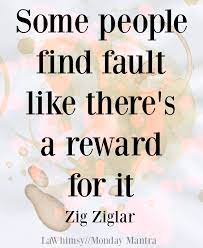
There’s this guy I used to see every day in the synagogue. He had his issues, like all of us and we got along fine.
Then one day he decided to actually apply the things we learned in the Torah to try to become a better person.
I watched in astonishment as he remained calm in situations that used to illicit rage. He stopped gossiping about people we used to love to talk about.
He acted like a guy who actually internalized the lessons that we were learning in Torah for all those years.
I waited impatiently for him to slip up and show his “real” self.
Why do people look for faults in other peoples’ good acts and motives?
In this week’s Torah portion, we meet Pinchas, an “average” person who acted boldly while the Elders, including Moses were frozen in indecisiveness.
Pinchas acted decisively and thereby averted a national calamity. Yet the vary people he saved said he had ulterior motives.
So long as a person is doing good, he should not be criticized.
Even if he is brimming with pride, doing good even for the wrong reason will eventually lead him to have purer motives.
But where does the desire come from to find fault in people who are doing something good?
Maybe a person thinks of himself as humble and thus finds pride in others to be distasteful. Chances are the opposite is true!
His criticism of another’s accomplishments is probably due to the person himself being egotistical and lazy.
He can’t stand the thought that someone accomplished something that he did not.
Even if the do-gooder is a showoff, at least he accomplished something, and he is honest about his egotism.
The critic, however, is rankled because he can’t admit that he is also an egotist. So, he feigns righteous indignation.
It is much better to be a doer than a critic. For a little egotism can make criticism destructive. But a good deed always remains good, regardless of the intention.
Wishing you a peaceful and fun Shabbos,
Rabbi Yonatan
June 29, 2023
No One Can Talk To A Horse, Of Course!

Long before Mr. Ed the talking horse, lived Balaam’s talking donkey.
He was smarter than his master because he had the good sense not to mess with the Jews.
His master along with king Balak of the Moabite nation hatched a scheme to annihilate our people; what else is new?
I won’t use space herein to describe their ending. Suffice to say, when’s the last time you met a Moabite?
Over the centuries we have been accused of killing their God, using their children’s blood to bake matzah, & controlling the world’s banking system.
First, they told us to get out of their countries, and now they tell us to get out of Israel.
They wish the Nazis succeeded, yet they deny that the Holocaust ever happened.
Yes, we should educate and confront antisemites. The A.D.L., et al, have been doing this for decades. Yet he voices of the antisemites are getting stronger.
We cannot allow this subject to occupy center stage nor to become the focal point of any kind.
We must live as proud, confident Jews, and influence everyone we meet with courage, positivity, and encouragement.
In the words of the late Rabbi Lord Jonathan Sacks: “non-Jews respect Jews who respect themselves!”
Do a mitzvah today. You’re not religious? So do it to spite the anti-Semites!
It is this attitude that contributes to the secret of Jewish eternity!
Don’t worry; it all turns out great!
Shabbat Shalom U’Mevorach,
Rabbi Yonatan
June 22, 2023
Never Enough Prestige, Fortune, & Fame

We meet a fascinating and tragic figure in this week’s Torah portion, named Korach.
Korach had it all; prestige, fortune, & fame. Only a handful of people had more and that’s what Korach obsessed about.
Because he could not control his envy, lust, and desire for honor, he fomented a rebellion amongst Moses.
But In Biblical fashion, the earth opened beneath his feet and swallowed him alive, along with his co-conspirators, putting an end to the entire affair.
We are all born with a propensity towards envy, lust, and a desire for honor. Left unchecked, it never ends well.
The Midrash Shmuel relates that a king had summoned both an envious person and a hedonist to his court:
The king said: “The 1st person to ask for something will receive it. And the other will receive double!” Both remained silent.
The hedonist wouldn’t speak first because he wanted the double portion.
The envious person wouldn’t speak first because he couldn’t stand the thought that the hedonist would receive twice his portion!
Finally, the envious person spoke: “I would like the king to poke out one of my eyes.”
But channeled properly, these personality challenges can actually help refine us:
Envy can be used to emulate those who are more spiritually refined than us; one can learn to lust for closeness to the Divine, and one can experience honor by honoring others.
To paraphrase the Rebbe: if we are preoccupied with our personal status, we are likely to be unhappy, for our sense of worth is based on prestige, fortune, and fame.
Happiness, however, can be found — by transcending self-concern, and investing our personal resources in a purpose of greater scope than ourselves.
Wishing you contentment with your lot in life, this Shabbat & always!
Rabbi Yonatan
June 15, 2023
We Appeared Like Grasshoppers in Our Eyes

The Children of Israel had just received the Torah at Mt Sinai from G-d himself.
Poised at the border of the Promised Land, they were assured that The Almighty would fight their battles and deliver their enemies into their hands.
Then, on their own initiative they decided to send scouts into the Land of Israel.
They came back with a negative report that the land could not be conquered.
How pray tell, could a people under the direct Divine protection of the Master of the Universe lose their nerve?
Scripture states: “We are unable to go up against the people, for they are stronger than us…we appeared like grasshoppers in our eyes, and that’s how we were in their eyes.”
That’s right! They suffered from a collective case of low self-esteem.
As a result, G-d told the people that he would extend their desert itinerary for an additional 39 years so the next generation would learn the “right stuff” to inherit the Promised Land.
Hearing this news that their entry was denied, they had a change of heart and pleaded with G-d to let them enter the Promised Land. But the moment had passed. It was too late!
What caused our people to have such a dramatic change of heart?
A few moments earlier they were petrified. Now they were ready to march into the Land singing The Theme from Rocky!
Initially their faith was overshadowed by fear. But as soon as they realized the consequences of their behavior, their inherent faith was awakened!
We all experience doubts and fears from time-to-time.
The way to overcome them is not to attempt to answer them directly, but simply to reawaken the pure childlike faith that lies dormant within us!
He’s got our back! Be strong and of good courage!
Shabbat Shalom,
Rabbi Yonatan
June 8, 2023
Our Personal Journeys are Orchestrated by G-d

We feel good when we are making progress towards our life’s goals. Conversely, we feel frustrated when we get stuck!
How must the Children of Israel have felt, wondering around Sinai for 40 years with one overarching goal…to enter the Promised Land!
This week’s Torah portion describes G-d’s Cloud of Glory which led the Children of Israel through the desert, and then hovered to indicate it was time to stop, make camp & erect the tabernacle.
There were 42 stops on their way to the Promised Land. It’s fascinating to note that when they were told to stop, meaning they couldn’t advance towards their heart’s desire, they remained content to just hang-out!
A famous Torah Commentator, the Ohr Hachayim says that their willingness to stop and make camp was equal to their desire to move on.
Sounds a bit out of character for our people, no?
You see, they were able to recognize that G-d always acted in their best interest, even when they felt impatient and stuck in place.
Our personal journeys are orchestrated by G-d, who “directs the footsteps of man.”
True, we have free choice and therefore it’s fully appropriate to set out to achieve our goals. Still, we must recognize that only G-d sees the big picture, and only G-d knows what’s in our best interest.
So next time you feel stuck, remember that this is also in your best interest. Embrace it, rather than fight with it.
Wishing you tons of Blessings in all areas of your life, this Shabbat & always,
Rabbi Yonatan
June 1, 2023
Penny-Pinching Cheapskates?

If I were as wealthy as so-&-so, I would be much further ahead in life! Feel free to insert “attractive”, “smart”, or “lucky” in lieu of “wealthy.”
The truth is that G-d has given each of us the specific resources in potential that we each need to fulfill our specific mission in life.
This week’s Torah portion is a lesson in how to maximize our own potential, & not focus on what we think we are lacking.
When the traveling sanctuary (Tabernacle, or “Mishkan” in Hebrew) was built in the desert by Moses and the Children of Israel, the articles were mostly made of gold and precious stones.
There was no consideration of cost! No expense was spared!
Yet oddly, the Leaders of the 12 Tribes donated only six wagons to transport the contents of the Tabernacle, only one wagon from each two Leaders. Were they penny-pinching cheapskates?
The Talmud analyzes the exact dimensions of all the Tabernacle’s contents and determines that each of the six wagons was filled to capacity without room for even an extra matchstick.
Wouldn’t it have made more sense to have some extra wagons, so things didn’t have to be loaded and unloaded with such painstaking precision?
The Torah is telling us that everything exists in the world for a purpose. If six wagons were sufficient, then any extra ones would be superfluous.
This concept applies to each of us as well. G-d created each of us with a purpose. If something is not being fully used, it is not fulfilling its purpose.
By utilizing everything in our lives to our own potential, we fulfill the Divine plan, living our best lives possible and spreading more G-dly light throughout the world!
In closing, this Torah portion also includes the Priestly Blessing:
“The Lord bless you and keep you; the Lord make his face shine on you and be gracious to you; the Lord turn his face toward you and give you peace.”
Wishing you a Shabbat Shalom U’Mevorach (a peaceful and blessed Shabbos),
Rabbi Yonatan
May 25, 2023
We are Part of an Unbroken Chain Stretching Back to ‘Ground Zero.’

This coming Friday marks the holiday of Shavuot which celebrates G-d giving the Torah to the Jewish people.
Three million people camped at the base of Mt. Sinai and received G-d’s instructions directly from His “lips”.
You and I are part of an unbroken chain of transmission stretching all the way back to ‘ground zero.’
Not a single letter of a single word has been altered in the past 3,335 years.
If you are not aware of this transmission, I assure you that your great, great grandparents, & each of their ancestors were.
What happened on this day completely changed the effect of human events forever.
You see, prior to our encounter at Mt. Sinai, there was no connection between physicality and spirituality.
What was above stayed above; what was below stayed below.
At Sinai, G-d fused the two realms together giving us the ability to affect what goes on above, reciprocally changing our physical reality.
We accomplish this by fulfilling G-d’s desire that we make this world a fitting place for Him to be revealed.
By performing G-d’s commandments and learning his wisdom in the Torah, we draw down Divine kindness for the benefit of all humankind.
This unique ability was given to us at Sinai and that’s what we celebrate on Shavuot.
I have no space to explain, so you have to trust me on what I’m about to say…
You must eat a thick slice, or two, or more of Kosher cheesecake on Shavuot.
Wishing you a lactose tolerant and yummy holiday and Shabbos,
Rabbi Yonatan
May 18, 2023
E plurbus unum!
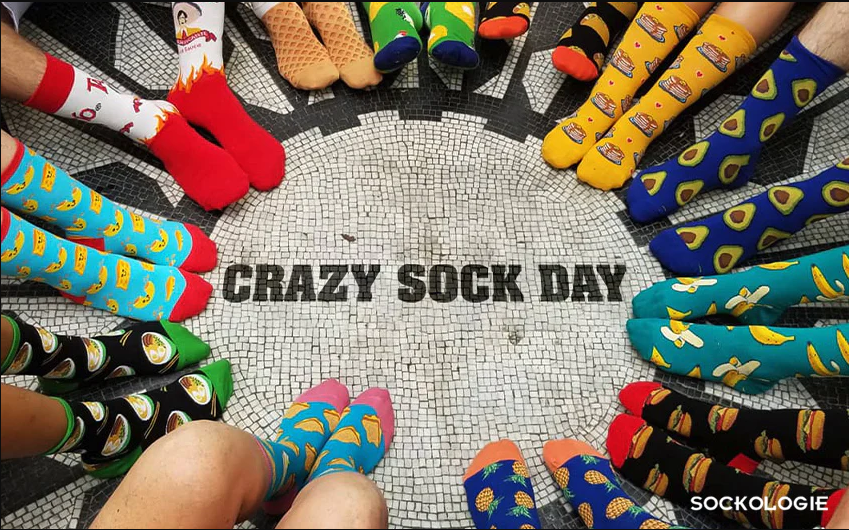
Jewish men who practice my brand of Judaism tend to look alike.
We don’t spend a lot of time figuring out what to wear each morning… big beard, black suit, black shoes, black hat, & white shirt.
Next time you see such a Jew, ask him to lift up his pant leg. It might be kind of weird if you lift it up without asking him first; just sayin’!
There’s a good chance you will see vividly colored socks embossed with Mickey Mouse, the Rolling Stones, or Batman.
On the one hand we all enjoy the feeling of belonging to a group, but on the other hand we love to express our individuality.
This week the Torah goes into intricate detail as to how the 3 million Children of Israel camped in the desert for 40 years:
Every tribe had its own leader, its own place to camp, its own color, its own flag, and even its own gemstone.
Each tribe was allotted its portion in Israel that best suited its profession as farmer, shepherd, businessman, winemaker, or scholar.
These were the same 3 million Children of Israel who received the Torah at Mt. Sinai as “one man, with one heart.”
Their identity as members of the community actually enhanced their distinct individuality.
In today’s prominent culture, the emphasis is on individuality. Community is all but forgotten, except maybe in the virtual world.
Judaism gives us the formula to achieve the best results in life. Belong to a force for good that’s greater than yourself!
Only then can we escape the unhealthy seduction of self-absorption. Only then can we really have the freedom to discover the beauty of our individuality.
Wishing you a connected Shabbat,
Rabbi Yonatan
May 11, 2023
Find out how much music you can still make with what you have left!
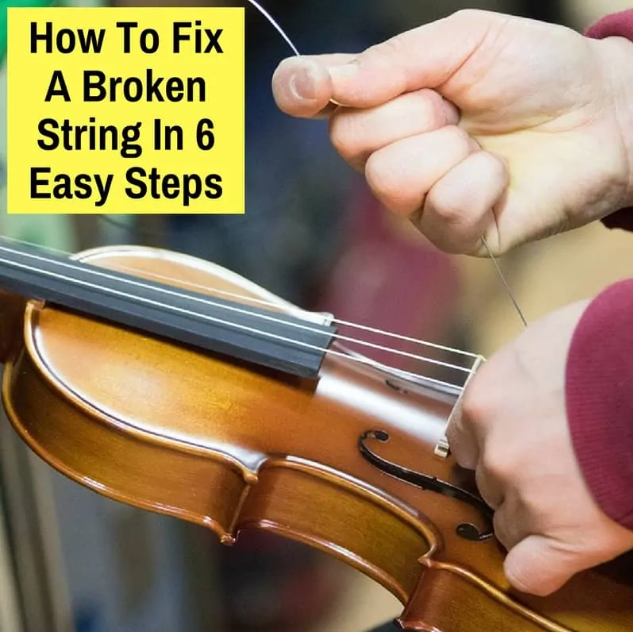
What are we supposed to do with the mishandled opportunities, the disappointments, & the angst we’ve accumulated?
How can we create beauty and value from the baggage we are shlepping around?
What comes to mind is a story I repeat frequently to myself…
Yitzchak Perlman, the world-renowned violin virtuoso limped onto stage at Lincoln Center in 1995,
along with the braces and crutches that were his constant companions since he had polio as a child,
Perlman picked up his violin and positioned himself…
Just a few bars into the performance, one of his violin strings snapped.
The audience prepared itself to wait patiently as Perlman would need to reattach his braces and crutches,
and hobble off stage to fetch a new string, or a new violin…
You can imagine the awe when Perlman just continued to sit there, with eyes closed,
and then turned to the Conductor to begin again…
Now a violin has 4 strings and cannot be played with only 3 strings.
But Yitzchak Perlman apparently didn’t know that…
Perlman played with more passion, power, and purity than ever before…
When he finished, there was an awesome silence in the room. And then the audience rose and cheered.
There was a deafening outburst of applause from every corner of the auditorium…
Perlman wiped the sweat from his brow, raised his bow to silence the crowd and said the following in a quiet, pensive, reverent tone:
“You know, sometimes it is the artist’s task to find out how much music you can still make with what you have left.”
My dear friend, let’s love ourselves and love each other as we are.
Let’s make music with what we have left!
Wishing you a zippidydudah Shabbat,
Rabbi Yonatan
May 4, 2023
Living it Up in Paradise

Adam & Eve were "living it up" in paradise! G-d only withheld one fruit tree from them.
Then at precisely 3pm on Friday afternoon, everything changed!
You guessed it! The bite from the ‘apple' that’s still biting us 5,783 years later!
It gets even more interesting…
Had they waited just 3 hours longer until the Sabbath entered, they could have tasted from this fruit with G-d’s Blessing!
In this week’s Torah portion, we are told that when we plant a tree, we can’t taste the fruit for the first three years.
This is to remind us of the three hours that Adam and Eve couldn’t seem to wait. Of course, we are permitted to partake of life’s delicacies! Judaism does not condone asceticism.
But do we really need that 3rd piece of pie?
Do we really have to say everything on our minds?
Must we look at things which are inappropriate?
When we forget our values and our purpose, it becomes possible to pursue instant gratification right off the cliff.
What’s left is an empty life and purposeless existence.
Creating boundaries around our desires is the antidote! This is the key to living joyfully!
Wishing you a supercalifragilisticexpialidocious Shabbat,
Rabbi Yonatan
April 27, 2023
G-d is giving us all a second chance. Let’s grab it!

Next Friday, May 5th marks my personal favorite holiday on the calendar!
No, it’s not International Chocolate Lovers Day which would be a close second!
It is “Pesach Sheni”, or the “Second Passover.”
THE STORY:
On the first anniversary of G-d freeing us from Egypt, He commanded us to celebrate Passover, which we re-enact each year, to this very day.
But there were people who were not able to join because they had left the camp of Israel in order to fulfill another good deed.
When they returned, they were distraught that they missed the opportunity to celebrate Passover as G-d had commanded.
Moses assured them that they were fully excused by G-d Himself.
But that didn’t satisfy them. They wanted to celebrate Passover!
They made such a ruckus that G-d relented!
He declared that each year, exactly one month after Passover would come a second chance known as the second Passover!
THE LESSONS FOR US:
It’s never too late! You’re not a lost cause! You’re never too far away!
There is no justification for despair, no matter how far away or lost we may be!
Today, and every day, G d is giving us all a second chance. Let’s grab it.
Shabbat Shalom,
Rabbi Yonatan
April 20, 2023
Hold Your Tongue

Can you imagine if every time someone shared a piece of juicy gossip…
they would get a big pimple on the tip of their nose?
Well, during Biblical times, that’s exactly what happened…
If they spoke negatively about another person, they would contract a skin disease for all to see!
Words carry a lot of power!
Our Sages tell us that gossip hurts three people: the one who speaks, the one who listens, and the one who is the subject!
Therefore the Torah forbids us from speaking negatively about other people, even if it is true.
Yes, there are exceptions but that’s not my focus herein.
Beyond developing the discipline to hold our tongues,
our Sages tell us to “judge everyone for good,”
to have empathy for other people’s shortcomings and “walk a mile in their Gucci loafers.”
By finding something praiseworthy in every person, and expressing it,
We enable a person’s good qualities—which may be very well concealed—to rise to the surface.
And this is what we can do right now!
Let’s spread goodness and kindness and make ourselves a fitting vessel for Divine Blessing!
Wishing you an awesome Shabbos,
Rabbi Yonatan
April 10, 2023
Can you count to forty-nine?

Exactly fifty days after our liberation from Egypt, we met G-d face to face on Mt. Sinai.
We were a broken people and to prepare for the encounter we had to undergo a spiritual deep cleansing because our emotional framework had become distorted.
The Kabballah tells us that we have seven emotional attributes: loving-kindness, restraint, compassion, endurance, humility, bonding, and leadership.
At the root of everything that is not great in our lives, lay distortions amongst these seven emotive attributes.
Each of our seven emotions is a composite of all the others…
For example, loving-kindness is comprised of itself plus the other six emotions. Hence there are a total of forty-nine ‘parts’ to re-assemble in proper working order.
Each of the 49 days we walked in the desert, we refined another emotional aspect of our psyche. On the 50th day, we met G-d at Mt. Sinai and received the Torah.
Today we continue the spiritual deep cleansing for 49 days, by saying a short Blessing each day followed by counting the day corresponding to the emotion we are refining.
Try it out for yourself…
“Blessed are you, Lord our G-d, King of the Universe, who has sanctified us with your commandment to count the Omer”.
Then look for today’s date with its corresponding emotion and say it out loud:
https://www.chabad.org/holidays/sefirah/omer-calendar_cdo/jewish/Omer-Calendar.htm
That’s it! The key is to do it, whether or not you understand or believe.
At the conclusion of the 49 days, you will have refined your emotions!
Whatever isn’t yet perfect G-d will do for you on the 50th day, Shavuot, the day we received the gift of the Torah!
Happy counting!
Rabbi Yonatan
April 4, 2023
Break Free!

A thought for discussion at your Seder Table (Passover begins this Wednesday evening with the first Seder, and the second Seder is Thursday evening):
The Torah says that “these are the journeys of the children of Israel, going out of the land of Egypt.” Why is “journeys” plural? Afterall once you leave, you have left!
But spiritually, the exodus from Egypt never ends. It is a journey from the boundaries and constraints of habit, conformity, and ego.
“Mitzrayim,” the Hebrew name for “Egypt” means “boundaries” and “constraints.”
In the process of our self-work, what we considered to be liberating and expansive yesterday, feels confining and inadequate today.
Having transcended yesterday’s limitations, we must again journey from the “Mitzrayim” that our present level represents vis a vis our newly discovered potential.
That is why our sages say that “in every generation and every day, a person must see himself as having today left Egypt.”
Getting out of “Mitzrayim” is just the beginning. Our purpose is to go up to the “Promised Land” which consists of the achievements we create by breaking free from yesterday’s constraints.
Wishing you a taste of true freedom this Passover, a forerunner of the complete freedom we will all experience, as G-d fulfills his promise to us,
Rabbi Yonatan
March 30, 2023
We are Empowered to Transcend All Our Limitations

Passover is the celebration of our freedom…
Freedom from our Egyptian captors over 3,300 years ago, and freedom from our own egos.
Passover teaches us how to rise above our egos so that we can achieve truly great things.
On Passover we eat Matzah.
If we wanna “up our game”, we eat it for all eight days of the holiday.
If we wanna go “all in”, we scour our homes looking for microscopic breadcrumbs wedged in crevices in our linen closets.
In fact, the Talmud states that what is holding us back from achieving great things is the yeast in the dough during Passover!
For when we are all puffed up with our own selves, we are enslaved to our misguided self-construct.
Further we become prisoners to a world of false expectations that we think we must satisfy and please.
The spiritual energy of Passover empowers us to break free from our bondage to anything in this world.
And we begin by ritually eradicating a physical manifestation of that ego from our world.
By getting rid of all grain except for Matzah for the eight days of Passover, we become connected with G-d’s infinite energy,
and we are empowered to transcend all our limitations...
That is real freedom!
Wishing you a Good Shabbos and a Good Yomtov,
Rabbi Yonatan
March 23, 2023
A Tale of Two Souls, and One Has A Tail!

Chassidic philosophy teaches us that we each have two souls…
One soul is focused on physical survival and pleasure. It is called the ‘animalistic’ soul and it is located in our blood and in our heart’s left ventricle.
The other soul is focused on our higher calling and is known as our ‘Divine soul’ and is located in our brain.
Without an animalistic soul, we might go hungry for our physical needs.
But the key to a successful life is for the Divine soul to always be in the driver’s seat.
When our brain is in control of our feelings and desires, we live a rich and full life.
But when we let our animal have the car keys, we cannot possibly reach our potential. And imagine how badly your car would smell if you let your ox go out for a spin!
In this week’s Torah portion, we learn about the animal sacrifices that were offered up in the Holy Temple.
We haven’t offered such sacrifices for over 2,000 years but the message is more relevant than ever…
The Hebrew word for ‘offering up a sacrifice’ shares the same root as the word to ‘bring close’.
By offering up our ‘inner animal’ to the Divine, we appreciate a higher purpose to our life, and we enjoy connection and closeness with G-d and with each other that is beyond description.
Wishing you a Shabbat of delight,
Rabbi Yonatan
March 16, 2023
Why doesn’t G-d call Uber Eats to send us our daily food?

One aspect of living Jewishly means coming to terms with seemingly contradictory messages.
For example, If G-d is the source of all blessings, then why work?
And if we do work and succeed then why are we thanking G-d for the result of our own efforts?
In this week’s Torah portion we are instructed: “Six days shall work be done, but on the seventh day shall be holy, a day of complete rest to G-d.”
Why doesn’t the sentence read “you shall do your work in six days…” rather than, “in six days shall your work be done?”
The passive form suggests that even during the six days we work, our effort alone is not enough.
The purpose of our work is to create a conduit to receive G-d’s blessings, nothing more.
While in the desert for 40 years, G-d fed the Children of Israel with “bread (manna) from heaven.”
Those people with the greatest faith simply reached with their hand out of their tent to receive their daily requirement.
Others had to search around the camp.
While those with no faith had to expend great effort to find their daily portion.
At the end of the day, everyone received exactly what they needed for their family!
G-d could have called Uber Eats for delivery right to our tents, requiring no effort on our part.
But he opted to have the manna fall throughout the camp and we were tasked with having to collect it.
Nothing has changed from then until now!
Wishing you a peaceful Shabbat with no need to use Uber Eats!
Rabbi Yonatan
March 9, 2023

The Talmud tells the story of a king who became enraged by rumors that the woman he was engaged to had committed an act of infidelity.
A quick-thinking friend who knew the woman was virtuous, took the betrothal contract and ripped it to shreds so that the king could not use it as justification to punish her.
A thorough investigation ensued, and it turned out that the rumors of the queen’s infidelity were baseless. The king was forever grateful to his friend for intervening.
Moses spent 40 days atop Mt. Sinai learning the entire Torah and receiving the Tablets prepared by G-d himself.
The Tablets were intended to serve as a marriage contract between us and G-d.
But on his way back down the mountain, Moses witnessed a small number of Jews serving the Golden Calf.
G-d told Moses He would wipe out the people and allow Moses to start anew with an easier to manage bunch.
Moses immediately smashed the Tablets.
Far from being an act of rage, Moses’ instantaneous act is considered the most heroic and selfless act of Jewish leadership.
By smashing the Tablets (tearing up the marriage contract) prior to delivery, Moses averted our certain annihilation.
Thus we had a pathway to return to G-d, which elicited G-d’s complete forgiveness, followed by a second set of Tablets which in some ways, was superior to the first set.
The worst national sin in the history of the Jewish people was forgiven.
Thus, nobody can say “It’s too Late”, or “I’m too far gone.” People make knuckleheaded mistakes; human beings do mess up really badly from time to time…
Along comes this story to remind us that between us and G-d It’s never too late, and with sincere repentance we can always get a “do over”.
Wishing you a Shabbat of smiles,
Rabbi Yonatan
March 2, 2023

G-d willing, we will celebrate Purim on this coming Monday night and Tuesday!
“Celebrate” is actually too tame of a word. Not Times Square on New Year’s Eve, nor Rio de Janeiro during Mardi Gras come close.
We dress up in ridiculous costumes, overindulge in food and liquor, while giving out huge amounts of charity.
We are literally commanded to leave all reason and sense of self behind.
Why are we so happy? You can go to Chabad.org and read the miraculous events that took place on Purim, but that’s only part of it.
We are so happy because Purim marks the time that we took ownership of our Jewishness!
There was a decree of total annihilation against the Jewish people. We could have simply renounced our Jewishness and lived like the rest of the people around us.
After all, our morale was at an all-time low. Our Holy Temple was destroyed. We had been led away to exile in chains.
We had seemingly been abandoned by G-d Himself. Who could blame us?
But instead, we did something insane…
We said “bring in on! We will live like Jews, or we will die like Jews!” We came together as one people, fasted, and prayed, and the rest is history.
Two thousand, four hundred years later we haven’t heard a whisper from the ancient Persian empire, nor the ancient Egyptians, Assyrians, Babylonians, Greeks, Romans, et al!
Two thousand, four hundred years later we are still celebrating! And very soon we will be celebrating the ultimate joy with the coming of our righteous Moshiach!
Wishing you a wonderful Shabbat, and an “out of mind” Purim,
Rabbi Yonatan
February 23, 2023
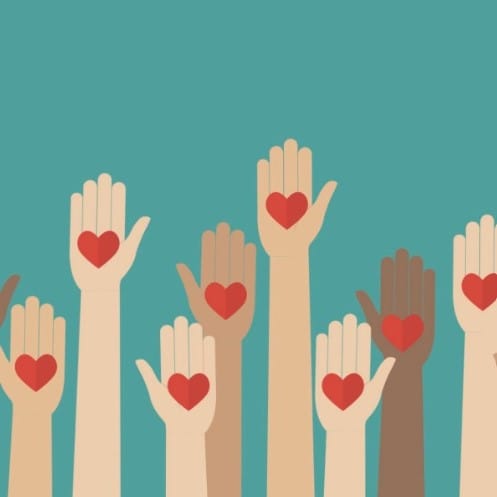
In this week’s Torah portion, G-d says to us: “take for me an offering…from every person whose heart inspires him to generosity…”
Would it not be a better choice of words to say, “give for me” rather than “take for me?”
Perhaps the lesson is that when we “give” charity we actually receive more than we give.
According to the the United Nations, enough food is produced to feed everyone on the planet, yet 821 million people are considered chronically undernourished.
So why didn’t G-d set up a distribution network from heaven to give to the needy, cutting out the middleman?
G-d designated us as his middlemen, and we are responsible for the distribution network, because the purpose of creation is to make the world a kinder place by helping one another.
The system is fueled by “Tzedakah”, translated as “charity” but it actually means “justice”. It is “just" that we share the gifts that G-d has endowed us with.
Yes, those 821 million people need food. Many more need love. Most of us don’t lack food or love, but we all need more meaning in our lives which is why G-d gives us the opportunity to give.
The Midrash tells us: “more than the rich person does for the poor person, does the poor person do for the rich person."
Each of us has the privilege to contribute to the refinement of the world with our checkbook and with our acts of goodness and kindness. By doing our part, we are helping usher in a time of peace, kindness, and prosperity for all the people of the world.
Wishing you a Shabbat of delight,
Rabbi Yonatan
February 16, 2023

Just last week, G-d revealed himself to us on Mount Sinai.
Just prior, G-d split the Reed Sea for us, and before that he visited ten plagues on the Egyptians, and before that Josef saved his entire family from famine, and before that… you got the point!
Suddenly this week the narrative changes and we are learning about torts and damages, like a first-year law student:
What is my liability if your ox falls into my pit? If I come across my enemy’s stray donkey, am I obligated to return it? How are damages calculated if I knock out another guy’s tooth?
Judaism based on the Torah is a process where we build our lives and our society based on the premise that other people matter.
We live in a way so as not to cause harm to other people, including their oxen and donkeys. In the process, we refine our compassion, empathy, and connection in our everyday ordinary lives.
G-d gave us the Ten Commandments and expects us to show Him what we can do with them! What kind of world are we going to create using His Torah as a blueprint?
When we sync our thoughts, speech, and actions with Torah, we experience all green lights and there’s always a parking space waiting for us…
Not really, but we don’t sweat the red lights and lack of parking, so much.
This is all accomplished by being sensitive to everyone and everything around us…
At the supermarket, at the coffee shop, at the nail salon, at the PTA meeting, and at the weekly Trivial Pursuit showdown.
Notice the needs of others, including strangers and act kindly. This literally brings heaven down to earth.
Wishing you a cozy, comfy Shabbos,
Rabbi Yonatan
February 9, 2023
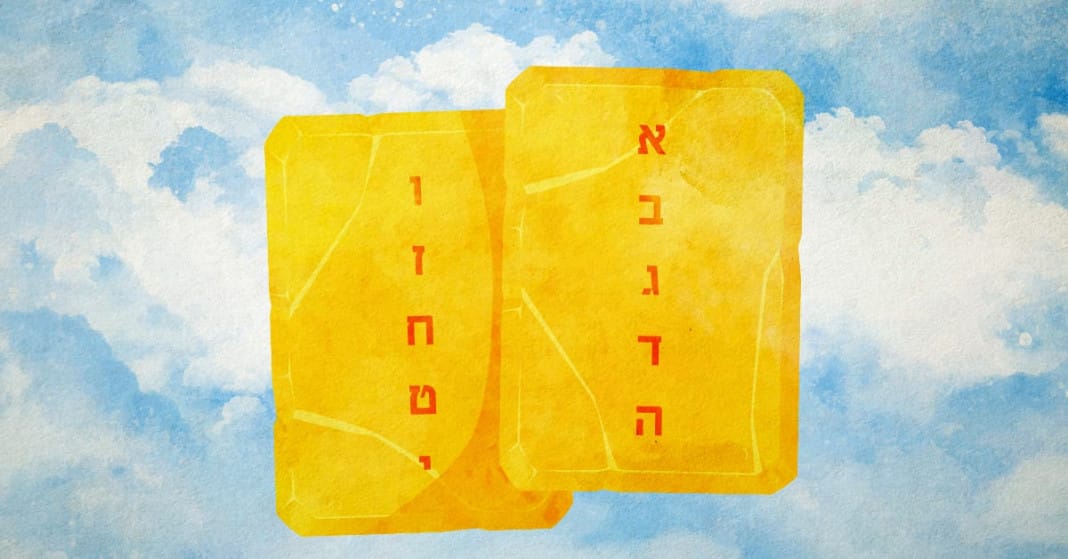
This week in the Torah, the children of Israel are camped at the base of Mt. Sinai…
G-d pays us a visit and gives us our marching orders which includes two tablets which contain The Ten Commandments.
The first tablet contains commandments between us and G-d, whereas the second tablet contains commandments between us and our fellow humans.
For sure, nobody wants to live in a society without a common set of guidelines and rules to keep us safe, healthy, and prosperous.
But must these rules be based on a G-d given system? Why can’t we rely on our morals, values, and logical conclusions to behave properly?
So why do we need the first tablet? Wouldn’t we figure out by ourselves not to murder, steal, commit adultery, bear false witness, or covet based on our own logic?
Unfortunately, we need only look back a generation to what happens when G-d is taken out of the equation.
Afterall prewar Germany was the perfect model of civilization, science, culture, philosophy, and ethics. Yet they perpetrated and justified the worst atrocities in history.
Left to its own devices, “groupthink” can rationalize and justify anything, no matter how atrocious.
The purpose of Torah is to fuse together our spiritual development with our growth as individuals as well as in interpersonal relationships.
By actively refining ourselves through Torah we contribute to making our little piece of the world a “dwelling place for G-d.”
Collectively we can help usher in a new era of peace, love, and the knowledge of G-d. This should occur speedily in our days, Amen!
Wishing you a fantastic Shabbat,
Rabbi Yonatan
February 2, 2023

Good news: We have finally left Egypt!
Bad news: the Egyptian army is closing in from behind and all appears lost!
The Reed Sea is blocking our forward movement, and we’re trapped!
True to form, a debate ensues:
One group says, “Let us end it all and throw ourselves into the sea.”
A second group says, “Let us return as slaves to Egypt.”
A third faction argues, “Let us wage war upon the Egyptians.”
Finally, a fourth camp advocates, “Let us pray to G‑d.”
Moses however rejects all four approaches!
He tells us to March forward!
Miraculously G-d splits the sea for us, and it doesn’t turn out well for the Egyptian army.
What do we learn from this?
When we are confronted with a hostile or indifferent world, our response must be to go forward.
Not to escape reality,
Not to submit to it,
Not to wage war on it,
Not just to passively pray,
Just move forward!
You will see that all barriers yield, and all threats fade away.
We have it within our power to reach our goal!
Have a personally powerful Shabbat and bring your floaties just in case!
Rabbi Yonatan
January 26, 2023

This is the week we are finally leaving Egypt after 210 years of enslavement!
To reach this point, G-d smote the Egyptians with 10 devastating plagues!
Isn’t it curious that G-d instructs us to leave immediately, with not even enough time to let our bread dough rise?
After all, there were no longer any forces enslaving us & the gates were wide open.
Our Sages tell us that G-d rushed us out because the glamour of Egyptian materialism still maintained an inner grip on us.
So while we were still sufficiently impressed with the ten plagues, G-d hurried us out of there.
Remember from last week’s lesson that each of us struggles with our own “personal Egypt”, a spiritual prison that limits and confines us.
When we try to get out, it is oh so easy to slide back!
The Torah is teaching us that in order to stay on our new path, it is crucial to sustain our momentum.
With our imminent redemption, there will be no possibility of backsliding into our “personal Egypt”; until then let’s stay connected with our faith and with our Torah.
Wishing you a liberating Shabbat,
Rabbi Yonatan
January 19, 2023

This week, the children of Israel are getting ready to leave Egypt, never to return.
So, why are we obligated, 3,334 years after the fact, to regard ourselves each & every day as if we are personally leaving Egypt?
In Hebrew, the word for “Egypt” shares the same root as the word for “confinement, limitation.”
You see, our enslavement in Egypt was not only a place, but is also a state of mind.
G-d took us out of Egypt, but we are responsible for “taking” Egypt out of ourselves!
“Egypt” makes us feel insignificant.
It makes us forget what we can achieve.
It makes us believe that we must blend into the overwhelming big world around us.
It tries to convince us that the world is real, and that G-d and our own souls are fantasy.
We won’t be free until we break free of our limiting beliefs and uncover our essential G-dly nature.
From there, we become true partners in Creation, and our lives become miraculous!
Imagine how your life can change if you connect to this reality!
Wishing you an empowering Shabbat,
Rabbi Yonatan
January 12, 2023
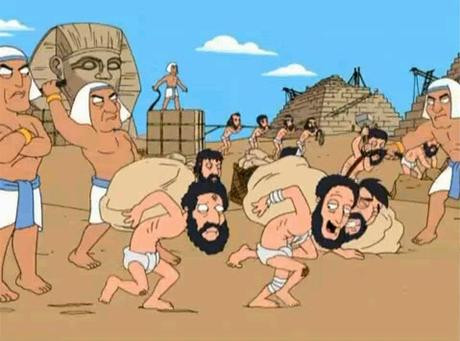
In last week’s Torah portion, things were looking so bright for the Jews in Egypt! Then we turn the page this week, and oy vey!
We spent 210 years in exile. Egyptian culture was quite alluring.
It seemed to promise fortune, status, and popularity. And we were welcomed with open arms. Many Jews became spiritually enslaved to the Egyptian way of life!
After about 130 years, the Egyptians began to feel threatened by our overwhelming success.
They confiscated all our possessions, and we were subjected to back breaking labor.
The Egyptians practiced genocide by drowning our children in the Nile!
G-d heard our cries and redeemed us in miraculous fashion. But that’s a story for another week.
Fast Forward… have we been hoodwinked by a culture that promises happiness but delivers misery and dependency?
Are we unwittingly ‘throwing our children into the Nile’ by immersing them into a culture which worships its own version of fortune, status, and popularity.
The way not to be enslaved is to connect with our own Divine soul, which can empower our intellect to take ownership of our thoughts, speech, and actions.
This will guarantee our material, social, and spiritual happiness, as well as our freedom from the bonds of exile.
Wishing you a liberating Shabbat,
Rabbi Yonatan
January 5, 2023

…meanwhile back in Egypt, Jacob passes away in this week’s Torah portion.
His sons, Joseph’s brothers said, “perhaps Joseph will bear hatred and will surely repay us the evil that we have dealt him,” referring to their horrific behavior 33 years prior when they sold their brother into slavery.
But this is not a scene from the Godfather. Rather, Joseph replied, “Do not be afraid, for am I in place of G-d? You had planned to do evil to me, yet G-d planned it to be for the good… he calmed them and spoke to them reassuringly.”
Is there anything beneficial about carrying guilt and shame for so many years? If you were the brothers' therapist, what would you advise?
At the core of Judaism is a prescription that gives us the opportunity to clean up our mess, no matter how ugly, even for the umpteenth time!
It worked for Adam & Eve after they bit into that Granny Smith, and it worked for the children of Israel after their rage party with the golden calf.
No matter the degree or intensity, we can always fix-it with “teshuvah”, translated literally as “return”, which means to regret our misdeed, and resolve never to do it again. Here’s how:
Step 1: Say clearly out loud to G-d what you did wrong and how much you regret. Hearing your own voice will help extract the mess from deep inside so that you can throw it away forever,
Step 2: Fix up what you did by apologizing to the person you hurt. If they don’t forgive, try two more times (after that you’re off the hook according to Jewish law),
Step 3: Give a lot more charity than you’re used to giving. Charity heals the world, and your soul as well,
Step 4: Compensate for whatever happened by doing better, acting nicer, & learning more.
Stop ruminating! Let it go as described above and return to the light from which your soul originally came.
Wishing you a light and loving Shabbat,
Rabbi Yonatan
December 29, 2022
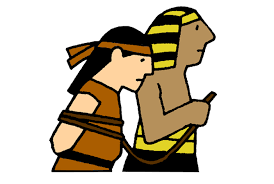
Imagine you’re seventeen years old and your siblings all despise you.
First, they plot to murder you, but ultimately decide to sell you as a slave in a depraved and savage land.
Against all odds, you become wildly successful despite years of harsh deprivation.
Meanwhile, your siblings become completely destitute.
You have the means to save your entire family, the vary family that wanted you dead.
I’m not sure what I would do, but here’s what Joseph said to his brothers in a similar situation in this week’s Torah portion:
“Do not be upset with yourselves that you sold me here, for G-d sent me ahead of you to provide sustenance for you.”
Joseph understood that every event, no matter how seemingly negative, is part of G-d’s plan, and that his brothers were simply an “axe in the hands of the woodchopper."
Had his brothers not acted against Joseph, G-d could have employed infinite other means to enable Joseph to fulfill his mission.
Nevertheless, the brothers freely chose to act badly and were accountable to G-d for their misdeeds.
Joseph remained focused on the prize and harbored no ill will towards his brothers.
Their bad behavior was between them and G-d.
So too, our lives are much richer when we focus on our mission rather than on our perceived mistreatment by others.
Their bad behavior is between them and G-d.
Let us be free from all that negativity, whether justified or not.
Let’s stop keeping score and let’s perform more random acts of goodness and kindness.
Wishing you a warm and cozy Shabbos,
Rabbi Yonatan
December 22, 2022
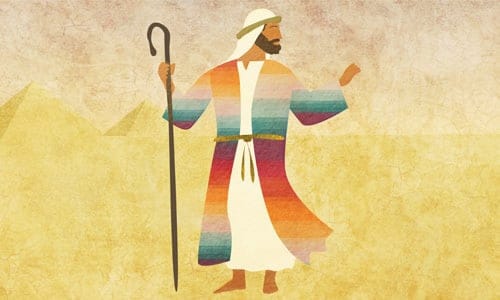
There are those who remain faithful to their way of life by living amongst their own while keeping their distance from the prevalent culture surrounding them.
Others have scaled the “ghetto walls” and live in communities where they remain a minority amongst other residents of varying cultures and religions.
In this week’s Torah portion, we learn about our patriarch Jacob’s son Joseph and his eleven brothers.
Each one was righteous but whereas the other brothers were shepherds who spent their lives in solitude and G-dly contemplation,
Joseph became the ruler of the mightiest empire of the day, Egypt.
With all the glitz and glitter conspiring to seduce him, Joseph managed to stay completely faithful to his Jewish traditions.
Obviously, it is much easier to stay true to Jewish tradition among your own. It’s much tougher to practice your faith as a minority.
Most of us live in socially integrated societies and we mix in many different circles.
The question is whether you believe as a Jew, that you have a responsibility to the world around you?
Do you believe that G-d expects you to change your little corner of the world for the better?
If so, Joseph is the quintessential role model.
He showed us that we can maintain our Jewishness with dignity despite the challenges thrust upon us by a wide-open society.
Remember the words of the late, great, chief rabbi, lord Jonathan Sacks who said “non-Jews respect Jews who respect themselves!”.
Keep eating latkes and donuts thru Sunday evening and please watch these extraordinary video stories… https://www.theyeshiva.net/jewish/c95/torah/holidays/chanukah.
Shabbat Shalom my friend,
Rabbi Yonatan
December 15, 2022

Ask a Jewish child what’s Chanukah all about, and invariably you’ll hear that it’s all about fried potato latkes and fried donuts.
It is our tradition to eat oily, fried foods for all eight days of Chanukah!
The oil as you know, symbolizes the miracle of one day’s supply of oil lasting eight days.
There was plenty of oil, but the Greeks carefully contaminated the supply and we refused to use impure oil to kindle the menorah in our Holy Temple.
Ok, sounds like a cute kid’s story but hardly worth keeping this tradition for 2,200 years. Besides, what about all the carbs?
Further, Chanukah is the ultimate “against all odds” story.
We were the few against the many; the weak against the mighty but managed to drive the Greeks out of our homeland.
But we don’t focus so much on the military miracle. Rather we are fixated on the donuts!
Why didn’t the Greeks just destroy the oil, rather than render it impure?
The Greeks worshiped the human mind and materialism.
They appreciated the wisdom of the Jews.
But they couldn’t cope with the Jewish need to live for a higher purpose, to transform this world into a home for G-d.
By defiling the oil, the Greeks were sending us a message that it’s ok to observe our traditions, but not to attach an eternal G-d to our practice.
Each of us has a little bottle of oil begging to be discovered.
The Chanukah lights serve as a reminder that we can kindle the potential for light we all possess within our souls.
Doing so will undoubtedly usher in a beautiful, new era for all of humankind!
Hopefully the latkes and the donuts will be carb free.
To learn more about Chanukah and to find a menorah lighting near you, visithttps://www.chabad.org/holidays/chanukah/Lighting_listing_cdo/aid/103839...
Good Shabbos!
Rabbi Yonatan
December 8, 2022
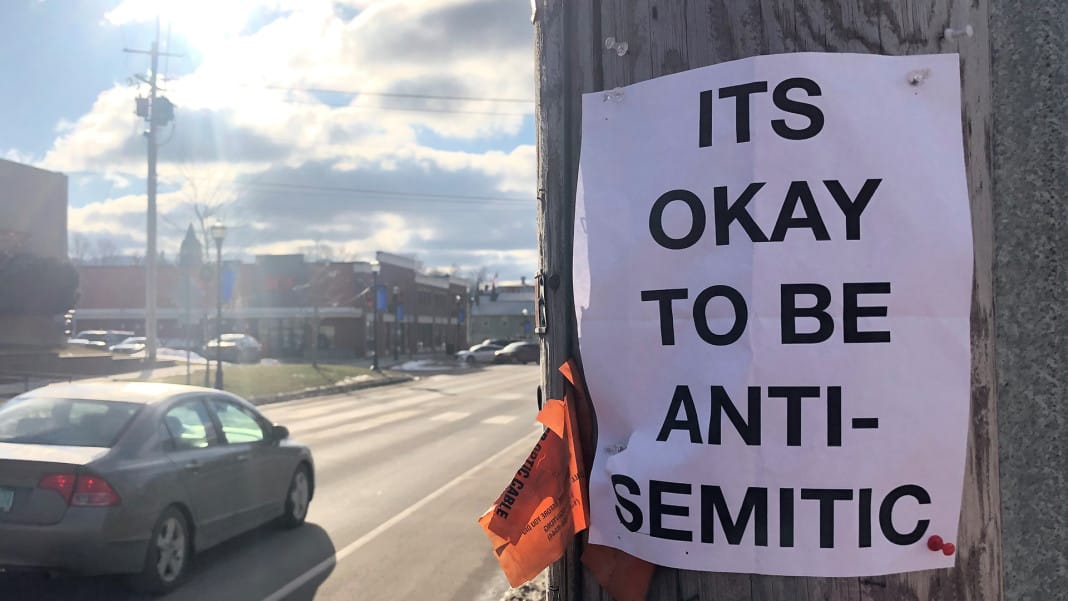
Why is antisemitism currently erupting in our modern, enlightened society?
Over the centuries we have been accused of killing their God, using their children’s blood to bake our matzah, controlling the world’s banking system, and spreading covid.
First, they told us to get out of their countries, and now they tell us to get out of “Palestine”.
They wish the Nazis finished the job, yet they deny that the Holocaust ever happened.
So, what should be our response?
To live as proud, confident Jews, and influence everyone we meet with courage, positivity, and encouragement.
In the words of the late Rabbi Lord Jonathan Sacks: “non-Jews respect Jews who respect themselves!”
In the face of irrational hatred, we must stay proudly and defiantly Jewish, trusting in G-d, and loyal to our people.
Do a mitzvah today that you didn’t do yesterday. If for no other reason, do it to spite the anti-Semites!
It is this attitude that contributes to the secret of Jewish eternity!
In the blink of an eye, we will usher in a new era of global peace and G-dly revelation, where all of humankind will profoundly appreciate us for being the “light unto the nations.”
In the meantime, have a tasty piece of kosher cake this Shabbos,
Rabbi Yonatan
(Gleaned from an essay by Rabbi Yossi Goldman in Chabad.org.)
December 2, 2022

A man tells his friend that his wife handles the little stuff, while he deals with the big things.
“What do you mean?” asks the friend. “Well, my wife manages the budget, pays the bills, decides on major purchases, and plans for our retirement” says the man.
His friend asks, “and, what do you do?” He replies, “I ponder whether the Lakers should trade LeBron, will I ever get the Wordle word on my first try, can I really lose 40lbs from intermittent fasting?”
Many “believers” believe that G-d involves himself with the “big stuff”, but that He doesn’t concern himself with our day-to-day lives.
He may WOW us with a miracle that’s concealed within nature like Israel’s victory in the Six Day War, or the 1978 NY Yankees winning the World Series.
But they conclude that He’s too exalted to stoop down to supervise lil ol us!
On the other hand, Judaism teaches us that G‑d not only knows what is going on down here but is intimately engaged in supervising all the details.
There is an actual interplay between G-d and us whereby each one responds and interacts with the other.
As our understanding develops, we raise ourselves to a level at which G-d is intimately involved in our lives, in an open, beneficial way.
Even still, you may not get the wordle word on your first try!
This Shabbos, make everyone you see, happy!
Rabbi Yonatan
November 24, 2022

It is so easy to recognize the faults in others who don’t conform to our worldview.
It takes courage however to discover the faults within ourselves, due to our built-in partiality.
Apropos, in this week’s Torah portion we meet twin brothers, Jacob & Esau who represent two opposing orientations within each of us.
Metaphorically, Jacob represents our G-dly orientation whereas Esau represents our self-centered orientation.
The inner conflict which most of us experience can be sourced to our self-centered orientation vying for supremacy against our G-dly orientation.
If one does not experience this inner conflict, it means that one or the other orientation is in control, more often the self-centered one.
By asserting our G-dly orientation, we can harness the enormous strength of our self-centeredness for positivity.
We accomplish this the same way light overcomes darkness. By lighting a match in a dark room, the darkness instantly fades away.
Similarly, as soon as we let shine the Holiness of our G-dly Soul by learning G-d’s ways, and by doing demonstrative good for others without judgment or calculation…
Our own selfishness and the selfishness that abounds in the world will be transformed into a force for goodness.
It is our mission to bring refinement to the world by refining ourselves and being ambassadors of light to everyone we encounter.
Hitting darkness with a stick is crazy. Just light a match, and poof!
Wishing you a happy Thanksgiving, and a poofy Shabbat,
Rabbi Yonatan
November 17, 2022

Looking at the most difficult challenges in our lives, chances are that if we were certain of the right course of action to pursue, we would feel confident in our ability to succeed.
It is not the problem itself that’s the problem, rather the problem is the doubt & confusion about the correct path forward.
This may be why the Torah refers to this world as a world of doubt, as well as a world of falsehood.
The doubt and confusion stem from the fact that everything false contains an element of truth.
Conversely everything true contains an element of falsehood.
With such confusion and falsehood permeating through our thoughts and feelings, is it any wonder that overcoming our challenges is so elusive?
Is it any wonder why so many people feel hopeless, paralyzed by their doubts?
Only the Torah is pure, unadulterated truth. It contains no doubt and no falsehood.
Even if one has not yet started along this path, just knowing that there is a path to follow in life that is totally good and true is a great source of comfort.
“There is no happiness like the resolution of doubts.” (Talmud Sanhedrin)
Wishing you a Shabbat of clarity,
Rabbi Yonatan
November 10, 2022
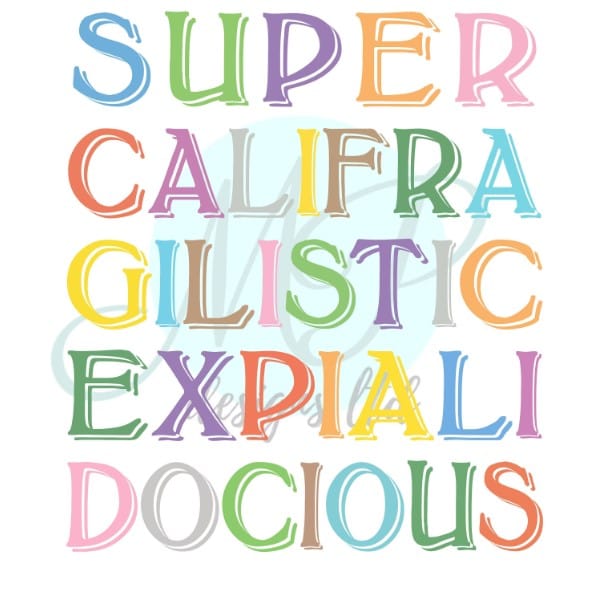
Our perception of reality is just that, our perception.
It is formed by our upbringing, our surroundings, and our experiences.
This explains how so many men and women live “lives of quiet desperation” despite being blessed with lives of plenty.
Conversely there are others who endure unrelenting challenges, yet they live vibrant and joyful lives.
Since our experience of reality is subjective,
It would be helpful to know whether our perception of reality is aligned more towards positivity, or more towards negativity.
Over 3,000 years of Jewish tradition, and specifically Chassidic philosophy teaches us how we can assess and reset our perceptions of reality so that we can love our lives and love ourselves unconditionally.
As paraphrased from the Rebbe, “It is not life’s events that shape us, but the meanings we assign to those events.
In other words, if you change the way you look at things, the things you look at change.”
While we are not able to exert control over our intellectual faculties, nor our emotive attributes,
Chassidus teaches us how to affect and to change our thoughts, our speech, and our actions.
Herein lies the means to live an extraordinary life.
Wishing you a supercalifragilisticexpialidocious Shabbat!
Rabbi Yonatan
November 3, 2022

In this week’s Torah portion, we meet the progenitors of the Jewish people, Abraham & Sarah.
G-d spoke two words to our Patriarch Abraham which are arguably the two most important words ever spoken in history…
“Lech Lecha” … meaning “Go, to yourself.”
When these words were originally spoken 3,705 years ago, the world was antagonistic towards Divinity.
Society was immersed in rampant corruption and in the depths of depravity, making our world today seem like paradise.
By seeking G-d’s guidance in freeing themselves from false idols disguised as cultural and familial norms, Abraham & Sarah gained access to their true, higher selves, the selves they could never reach on their own…
And so can we!
Do not be intimidated by what you read and what you hear.
Things are far better and far more promising than what the news and the internet are trying to sell us.
Fear, depression, and dread are illusory.
Let’s march to the beat of a different drummer… G-d’s!
This Shabbat, let’s go to ourselves,
In this week’s Torah portion, we meet the progenitors of the Jewish people, Abraham & Sarah.
G-d spoke two words to our Patriarch Abraham which are arguably the two most important words ever spoken in history…
“Lech Lecha” … meaning “Go, to yourself.”
When these words were originally spoken 3,705 years ago, the world was antagonistic towards Divinity.
Society was immersed in rampant corruption and in the depths of depravity, making our world today seem like paradise.
By seeking G-d’s guidance in freeing themselves from false idols disguised as cultural and familial norms, Abraham & Sarah gained access to their true, higher selves, the selves they could never reach on their own…
And so can we!
Do not be intimidated by what you read and what you hear.
Things are far better and far more promising than what the news and the internet are trying to sell us.
Fear, depression, and dread are illusory.
Let’s march to the beat of a different drummer… G-d’s!
This Shabbat, let’s go to ourselves,
Rabbi Yonatan
October 27, 2022

In this week’s Torah portion, we read about Noah and the ark, a story you probably learned at a tender age.
To refresh your memory, the animals came aboard two-by-two and it rained for forty days and nights!
Noah and his family lived an idyllic life aboard the yacht (ark) for a full year before disembarking.
In fact, G-d had to give Noah a “swift kick” because Noah so cherished his quiet, spiritual lifestyle, and he wasn’t looking forward to becoming CEO of Planet Earth 2.0.
Can you relate to how Noah felt? After all it’s so much easier to live the quiet life and to limit interactions to only people who think and believe as we do.
But back at Mount Sinai G-d deputized the Jewish people (that means you and me) to go out into the physical world and positively affect others of all stripes.
Our place is not on a mountain in Tibet. Nor does G-d need more angels in Heaven. Rather he needs us to be an “Ohr l’Goyim”, a light unto the Nations.
That’s right, our mission is to connect with everyone we encounter and contribute value to their lives, without judgments and without a scorecard.
That could take the form of a smile,or ignoring what we find unpleasant while accentuating what is positive,or rolling out the garbage bins for your elderly neighbor,or giving your letter carrier some freshly baked cookies,or forwarding these weekly Torah messages to your friends.
A self-focused life leads to Prozac, whereas a life tuned-in to others is better than an E Ticket ride (are you old enough to remember? If not, google “E Ticket Ride”).
The result is you will be leading a purpose filled life, in touch with your Divine Soul, and singing zipidy-do-dah all day long!
Your thoughts?
Wishing you a zipidy-do-dah Shabbos,
Rabbi Yonatan
October 20, 2022

This week, we roll the Torah scroll back to the beginning and the first thing we read is…
“In the beginning G-d created heaven and earth”.
Given that our universe didn’t always exist, the fact that it exists right now is only by virtue of the fact that G-d continuously renews creation.
If He were to stop even for a moment, it would be analogous to tossing a ball in the air.
The ball would look like it is flying on its own power until it runs out of the impetus that you empowered it with…then it falls back to earth and hits you in the head.
The philosophers call this the law of continuous creation, and it means that each moment G-d is creating every aspect of His creation anew.
If He were to stop, the entire universe would revert to nothingness!
Since every moment He creates a brand-new world, we too can create a brand-new personal world for ourselves, free of all constraints.
At any given moment we can start fresh, free of all psychic and emotional limitations.
Wherever you’re at, you can have a Do-Over!
As we begin the brand-new year of 5783, let’s each start fresh with new positivity that will lead to new opportunities.
And don’t forget to do it with a smile!
Wishing you an inspired Shabbos filled with good resolutions and tons of simcha (joy)!
Rabbi Yonatan
October 13, 2022
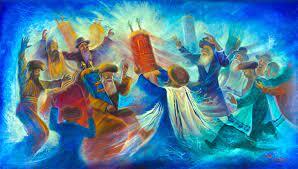
When people are happy, they dance…
It could be the Twist or the Watusi, but nothing comes close to the joy we experience from the nonstop dancing we engage in at the climax of this month of holidays known as Simchat Torah, this coming Monday night and Tuesday.
Why is dancing such an expression of joy?
Our Sages tell us that the human body is divided into three parts;the head, which is the seat of our intellect,the heart, which is the seat of our emotions,and our lower extremities which represent our actions.
True happiness is derived when we take our intellect and our feelings and direct them into tangible action.
On Simchat Torah, we gather all our lessons, experiences, and inspiration from Rosh Hashanah, Yom Kippur, and Sukkot and apply them to creating an amazing year.
This is precipitated by moving our feet while dancing with the Torah on Simchat Torah!
But hold on!
What about those of us who didn’t understand, didn’t feel, and didn’t have any positive experience whatsoever during this holiday season?
Just lift-up your feet and do something positive because your head and the heart will follow the action!
“Rock On” this Shabbos and Simchat Torah!
Rabbi Yonatan
October 6, 2022

During the month leading up to Rosh Hashanah, we made good resolutions, gave extra charity, and tried to connect with G-d in a meaningful way.
Then came Rosh Hashanah itself, the day we accepted G-d as our King and pleaded that we be written into the book of life, health, and prosperity.
Not to be outdone, on Yom Kippur neither food nor drink passed our lips for 26 hours as we cried out and made atonement by articulating our misdeeds, and resolving never to repeat our mistakes.
Immediately after we broke our fast, with one hand grasping a bagel and cream cheese, we began building a flimsy, thatched hut in our backyard, known as a Sukkah, for the holiday of Sukkot begins this Sunday evening, and lasts a full week! Sukkot is referred to in the Torah as “Z’man Simchateinu”, or “The time of our Joy.”
Every night of the week we invite friends and strangers to party in our sukkah with plenty of wine, singing, dancing, and Torah.
Why would we move so quickly from the formality and solemnity of the High Holidays to a Jewish Hootenanny?
Because more important than whatever we achieved while pleading and fasting, is how we are going to apply all the good resolutions we made and turn them into reality.
Just a tip, we won’t accomplish our goals by “white knuckling” our way through the year; quite the opposite the only way to create lasting change is through joy!
We have worked on reconnecting to G-d, and we have strengthened our relationships with our spouses, relatives, and friends.
Now we can truly experience the joy and unity which are the core themes of Sukkot.
There are two mitzvas associated with Sukkot:
First have a nosh and make a l’chaim inside of a Sukkah.
Second, grasp a palm fond, willow, myrtle, and citron together and make a blessing.This is known as the mitzvah of Lulav and Etrog!
Call me crazy, but by taking these two little actions you will help secure an amazing year for yourself and your loved ones.
So let’s start the party this Shabbos and continue for the following week!
Rabbi Yonatan
September 29, 2022

Tuesday evening, October 4th marks the beginning of Yom Kippur which is known in English as the day of repentance.
There are several means to return to our Father in Heaven. One such way is to practice the well-known dictum to love your neighbor as yourself because “anyone with whom his fellowmen are pleased, G-d is pleased with.”
To illustrate, I would like to share a well-known story: One Yom Kippur eve, the Alter Rebbe took his place in the synagogue, put on his tallis, and began his preparations for the Kol Nidrei prayers. Suddenly he stopped, removed his tallis and left the synagogue.
He walked to the end of the town and entered a dilapidated cottage, where a young mother was lying with her newborn child. He chopped wood, made a fire to warm the house and prepared her some soup. Only when he was sure that she had everything she needed did he return to the synagogue.
Now, there were other people in the synagogue at that time. Nevertheless, the Alter Rebbe did not instruct someone else to help the woman: he went to help her himself. And when did he do so? When he was deep in meditation before prayer, while intensely bonded with G-d. At that time, too, he was sensitive to her distress.
To “love your neighbor as yourself” is the path of return that comes from a good heart.Wishing you an inspiring and uplifting Yom Kippur and a new year filled with an abundance of G-d’s revealed blessings in all domains of your life!Shabbat Shalom & Good Yom Tov!
Rabbi Yonatan
September 22, 2022

Jokes notwithstanding, guilt is not a Jewish thing! But regret is! Guilt leads to depression, whereas regret leads to joy.
The trick is how to take an honest look at our deficiencies without getting melancholy, for depression fuels guilt and can cause us to indulge more in those behaviors which we are seeking to overcome.
Wanna learn the steps to leverage your personal icky stuff (aka “shmutz”) into pure joy? Let’s go!
STEP 1:Tell the truth to yourself, describing each of your not-good deeds over the past year. Acknowledge your good deeds as well! Get in touch with the remorse about what you have done wrong, but never regret who you are.
STEP 2:Resolve to never, ever repeat those misdeeds!
STEP 3:Confess your misdeeds to your Father in Heaven (no, it isn’t enough to think about it, your lips need to be moving). Thinking is theoretical whereas verbalizing our specific regrets as well as our resolve to do better makes it personal & real.
This process will open your heart and free your soul to experience a deep and loving relationship with your Father in Heaven. That in turn will allow you to experience incomparable joy because now your soul is released from captivity and you have been reunited.
G-d should Bless you abundantly in all of life’s domains.
Shabbat Shalom, and a Good & Sweet New Year,
Rabbi Yonatan
September 15, 2022

Rosh Hashanah is around the corner, and the book of life, the book of health, and the book of sustenance are all open. The Rosh Hashanah prayer book tells us how to get all the good stuff when it says that charity averts all bad decrees! FYI, charity is not only given with money; you can give charity by uplifting people with your words! So, let’s make a commitment that every day we will make people feel good by saying something nice to them. Let’s not let a day pass without doing it at least once or twice. And if you want to be a “mega donor” do it with people that you find difficult! Rabbi Avigdor Miller gave an illustration of the power of a good word and a smile:There was a man who owned a chain of stores. Each year he would do an accounting to see which stores had too many staff, and which stores had too much stock. At one store, the manager warned the owner that if he let go of a certain employee, he might as well close the store. Why? Because this worker greets each customer warmly and gives each one a good word. He creates a happy atmosphere which makes people want to come back. Similarly, a yearly review occurs on Rosh Hashanah. This year, please G-d, there will be no “layoffs!” But in past years there were workers who were sent home (passed away); there were workers who were “transferred”; and some workers got more “stock”, while some got less “stock”. There was a person who was supposed to be sent home but in Heaven they said “we can’t send him home because we need him on earth. He spreads happiness, he makes people smile, and makes them feel good!” This is the type of person that G-d needs in this world
Wishing you an exceedingly smiley :) Shabbat!
Rabbi Yonatan
September 9, 2022

We are introduced to a mitzvah in this week’s Torah portion that requires us to be forgetful! Whereas most mitzvahs require understanding and intention, this mitzvah can only be performed by being absent minded (maybe that’s why I love this mitzvah)…
“When you reap your harvest…and forget a sheaf…you must not go back to take it. It must be left for the convert, the orphan, and the widow, in order that G-d bless you in all that you do”.
Have you ever forgotten to pick up your change at a restaurant, or had some cash fall out of your pocket? Maybe a needy person picked it up. As a result, G-d blessed you “in all that you do”. Each of us has an inner desire to be connected to G-d so even when we perform a mitzvah unintentionally or by mistake, it emanates from our most deep-seated desire to do it. Parenthetically this proves that we don’t do mitzvahs because we are religious. Rather it is the natural state of a Jew to be connected to G-d, even though it isn’t always experienced at a conscious level. So next time an opportunity to do a mitzvah presents itself, why not just do it! If G-d is thrilled when we perform a mitzvah by forgetting, imagine how much more He will bless us for our intentional acts of goodness and kindness!
Don’t forget to have a good Shabbos!
Rabbi Yonatan
September 1, 2022
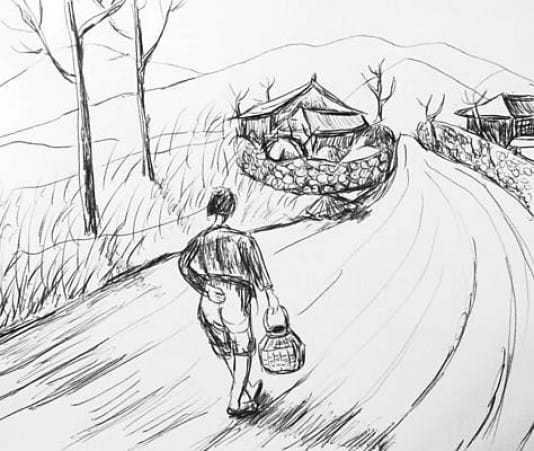
Imagine if you had an opportunity to meet with the personage who you most admire in history. Now imagine the formal setting, wearing your finest clothes, brushing up on the proper etiquette, and having to clear many layers of security, after many months of waiting for your appointment. At this point you would likely be so intimidated that you wouldn’t be able to speak when you finally meet him or her face to face!
But what if this famous personage invites you out to a burger joint with a couple of beers, and you are both dressed in blue jeans. And he or she is grinning from ear to ear, absolutely thrilled to be hanging out with you!
This imperfect metaphor is intended to describe the intimate relationship that’s available between you and G-d during the month leading up to Rosh Hashanah. During this month G-d makes himself vulnerable to us hoping that we will approach Him, as described in the “Song of Songs" wherein King Solomon says, “I am my beloved and my beloved is mine”. In other words G-d adores you and He longs for you. But having made Himself vulnerable He needs you to make the first move. He just wants you to want Him.
So give it a try. Tell Him that even though it’s been a long time, and even if you don’t go to temple, or eat kosher, or whatever, you just want to come home to experience His loving embrace. And He will most assuredly reciprocate.
Wishing you a connected Shabbat,
Rabbi Yonatan
August 24, 2022
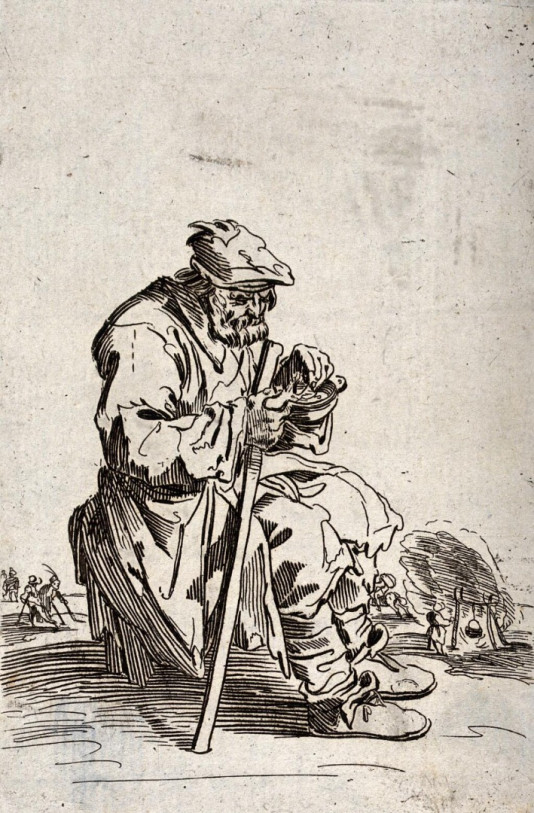
In front of an imposing cathedral were sitting two beggars; one wore a large Star of David and the other wore a large Christian symbol. When petitioners passed by they were put off by a Jew collecting in front of their church, and gave even more generously to their co-religionist. Finally someone advised the Jew that he might get some charity if he took off his Star of David. With that the Jew turned to his fellow beggar and said sarcastically: “Moishe, does this guy think he’s gonna teach us Jews about marketing”!?!
This week’s Torah portion of Re’eh speaks in depth about our responsibility to give charity. Everyone is obligated to give, including beggars who subsist from the generosity of others.
This commandment flies in the face of conventional wisdom which would exempt a poor person from giving charity since his generosity comes at the expense of his benefactor, and also because by giving charity he is depleting his own desperately needed resources!
But we are wired differently. The Jewish soul is literally a part of G-d and since G-d’s nature is to give, so is ours. Denying the pauper the opportunity to give of his meager resources is similar to denying him life itself.
Giving is not a luxury, rather it is a necessity. It’s part of our spiritual DNA.
My spiritual mentor is fond of saying that it is a mitzvah to give, and sometimes it is a mitzvah to take! But it is never a mitzvah to do nothing.
Wishing you a peaceful and joyful Shabbos,
Rabbi Yonatan
August 17, 2022
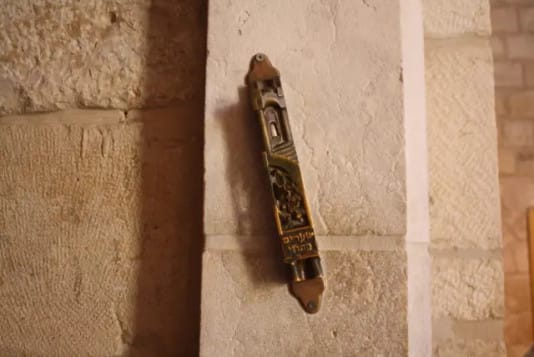
This week’s Torah portion of Eikev commands us to affix a Mezuzza on the doors of our homes and businesses. Read on and you will find out how a Mezuzzah is the Ultimate Security!
A Mezuzzah is a small parchment inscribed with the words of the foundational Shema prayer, handwritten by an expert scribe. A Mezuzzah isn’t something symbolic. Rather it provides physical and spiritual protection for the entire family. It also reminds us of our connection to G-d and to our people.
The decorative case that surrounds the Mezuzzah might be a work of art, but the scroll inside is what’s important. A rolled-up photocopy of the Shema does not achieve the desired result.
Here’s an amazing story from the Jerusalem Talmud which literally “says it all”…
King Artavan of Parthia once sent a precious pearl to Rabbi Judah who was a leader of the Jewish people about 2,000 years ago. He expected Rabbi Judah to reciprocate with something of similar value, but instead Rabbi Judah sent a Mezuzzah for the king’s front door! The king was more than a bit miffed! Thereupon Rabbi Judah explained that whereas he would constantly have to guard against theft of this precious pearl, the Mezuzzah would continually guard the king and protect him!
So dear friend, if you don’t have Mezuzzahs on your doors, let me know. If you have Mezuzzahs but haven’t had them inspected in a while, let me know.
G-d promises that anyone who carefully observes the commandment of Mezuzzah will lead a longer, richer life, as will his descendants!
Wishing you a Shabbat filled with delight,
Rabbi Yonatan
August 12, 2022
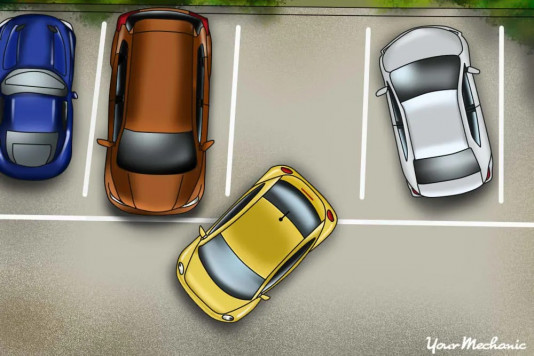
So an old joke goes like this… a guy who’s late for an important appointment is driving around the block for the umteenth time looking for a parking space. In utter desperation he says to G-d: “Father in Heaven, if you provide a parking space for me right now, I will donate $1,000 to charity”! Just as the words leave his lips, a parking space becomes available & he says: “Never mind G-d, I can take care of this myself”!
In this week’s Torah portion, Moses knows he has just another month before G-d takes him from us and he tries to impart all sorts of advice so that we can avoid lapses of good judgment, thereby sparing us from future tragedies.
Moses famously says: “Beware, lest you forget the L-rd who brought you out of the land of Egypt, out of the house of bondage”.
Moses reminds the Jewish people to “always be grateful” knowing that it’s human nature to ease up when things are going well in life. It’s typical that when people have troubles and hardships that they beseech the Almighty for their needs. But Moses is here to remind us when we are skating down easy street & all the traffic lights are green, that G-d always remains the source of our good fortune.
Moses is teaching us that sometimes (G-d forbid) only a reversal of fortune allows us to wake up to the reality that it is G-d who is the source of all of our Blessings!
May we experience only good fortune and not forget from where it comes.
Wishing you an amazing Shabbat,
Rabbi Yonatan
August 5, 2022
This coming Sunday commentates the destruction of both of our Holy Temples, on the 9th of the Hebrew month of Av. The first Temple was destroyed by the Babylonians in 586 bce; the second one by the Romans in 70 ce. It’s by far the saddest date on our calendar!
Given the fact that the world can’t understand why we still go on about the Holocaust after 75 years, how do you explain that we literally mourn a destruction that took place almost 20 centuries ago?
The Emperor Napoleon was walking thru the streets of Paris one evening when he heard the sounds of crying and wailing coming from a synagogue. When he asked what was going on he was told that the Jews were mourning the loss of their Temple. So moved was he that he offered to build them another one. Then he was informed that the Jews were mourning an event that took place 1,700 years earlier, and he famously responded that “a people who never forget their past are destined to forever have a future”.
It is because we refused to forget Jerusalem, that we have returned. It is because we refused to accept our defeat despite persecution and worse, we have rebuilt proud Jewish communities all over the world. The Babylonians, the Roman Empire, the third reich are relegated to history books while “Am Yisroel Chai”-THE PEOPLE OF ISRAEL LIVES!
The Talmud tells us that whoever mourns for Jerusalem, will merit to witness her rejoicing! G-d has promised us that he will restore our days of glory and His own everlasting house. May it occur speedily in our days!
Wishing you a Shabbat Shalom, Rabbi Yonatan
Parshat Matos Masei
July 29, 2022
In this week’s Torah portion, upon entering our Promised Land G-d instructs Moses to tell us to destroy all remnants of idol worship, even the most subtle forms left by the previous inhabitants. The word for idolatry in Hebrew means “foreign servitude”, which today includes all self-absorbed behaviors such as the obsessive quest for money, success, beauty, control, and fame. So far, so good?
The Torah teaches us that all our choices in life fit into three broad categories; the Holy, the forbidden, and the permissible* (the asterisk is because our job is to take what’s permissible and make it Holy). Now the Holy, and the forbidden are relatively simple, though not easy for everyone (all the “thou shalls”, and “though shall nots”).
But wait a second! How do I take something that’s permitted, and make it Holy??? How do I turn a delicious, kosher steak dinner into something holy? That’s easy… Thank G-d before and after you enjoy the meal and use the vitality you received from the meal to engage in helping someone in need! What about my next Mediterranean cruise? That’s easy… just appreciate that it’s G-d who created the natural beauty you are experiencing, and encourage every Jewish person you meet on board to show up for Friday night services! The bottom line is to develop the simple awareness that everything comes from G-d!
When we learn to orient even our most mundane activities towards Divinity, we can live free of the inner conflicts that unfortunately take their toll on the physical, mental, emotional, and spiritual health of too many people. Our job is to become spiritual samurai and smash our inner idols. What awaits us is the Promised Land of joy and peace that comes from G-d oriented living!
Wishing you a Holy Shabbos, Rabbi Yonatan
Parsha of the Week
July 15, 2022
In this week’s Torah portion, the evil nogoodnik, Balaam is offered big bucks to curse the Jews. However he makes the following disclaimer to his paymasters: “I am incapable of doing anything – small or great – that would transgress the word of G‑d.”
Evil possesses no autonomy; it is nothing more than a tool that G‑d uses to hide Himself from the world, thereby enabling us to choose freely between good and evil (I am not speaking of the evil that manifests within man, who is quite capable of denying G-dliness and committing atrocious acts, giving evil a bad name).
The Zohar, the classic work of Jewish mysticism, likens evil to a prostitute hired by a king to test the virtue of his son, the prince. Although she makes full use of all her seductive powers to seduce the prince, she really hopes – as does the king – that the prince will be strong enough to withstand her advances. Similarly, evil tries to confuse us and entice us into misbehaving, but it is in fact only doing its job and would rather we not pay attention to it.When we are aware of the true nature of evil, it is much easier for us to resist it.
Wishing you an awesome Shabbat! Rabbi Yonatan
July 1, 2022
When asked what are the greatest threats to Jewish survival, most people respond with either Assimilation, or Anti-Semitism.
Today, Jewish identity is built thru teaching about the Holocaust, and instilling guilt in our children for marrying outside our Faith. Not only is this not the solution, this is the problem!
With such a negative and pessimistic view of Judaism, is it a surprise that young people are opting out of Judaism? When we paint ourselves as victims, or we portray ourselves as an endangered species, what do we expect?
Rather than define ourselves based on how the rest of the world perceives us, we need to discover, and be convinced that Judaism has a message that the rest of the world desperately needs to hear…
1. That every individual is created in the image of G-d, and therefore is both unique and valuable.
2. That morality is not relative but absolute.
3. That humans are partners with G-d in creation with a mission to bring heaven down to earth.
The biggest threat to Judaism isn’t external pressure, rather it’s internal confusion. We don’t need to fear anti-semitism or assimilation. We do need knowledge and pride in the greatness of the Jewish mission along with the confidence to fulfill it.
Then we will truly fulfill our mission as “a light unto the nations” and hasten G-d’s promise to bring peace, justice, and prosperity to all of humankind.
Have an inspired Shabbat,Rabbi Yonatan
PS: This message is paraphrased and condensed from an essay written by Rabbi Aaron Moss from Sydney, Australia
Enter your text here.
